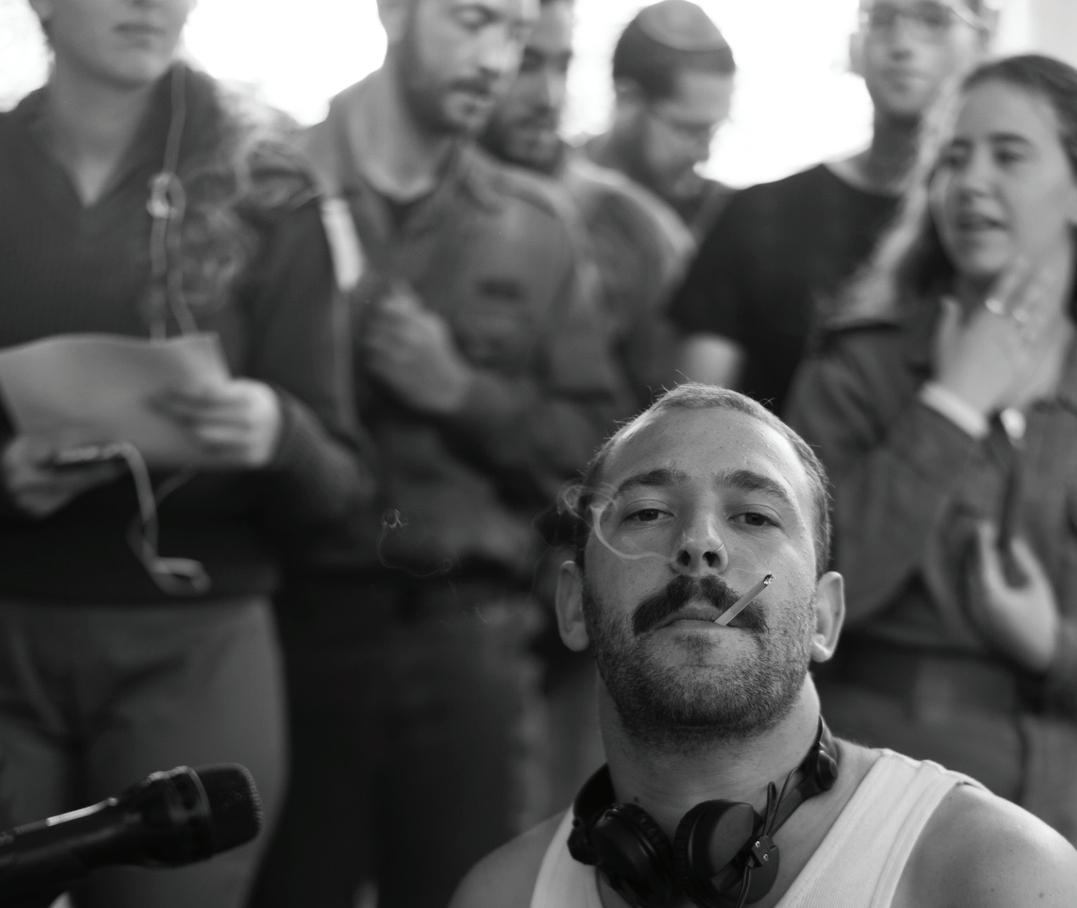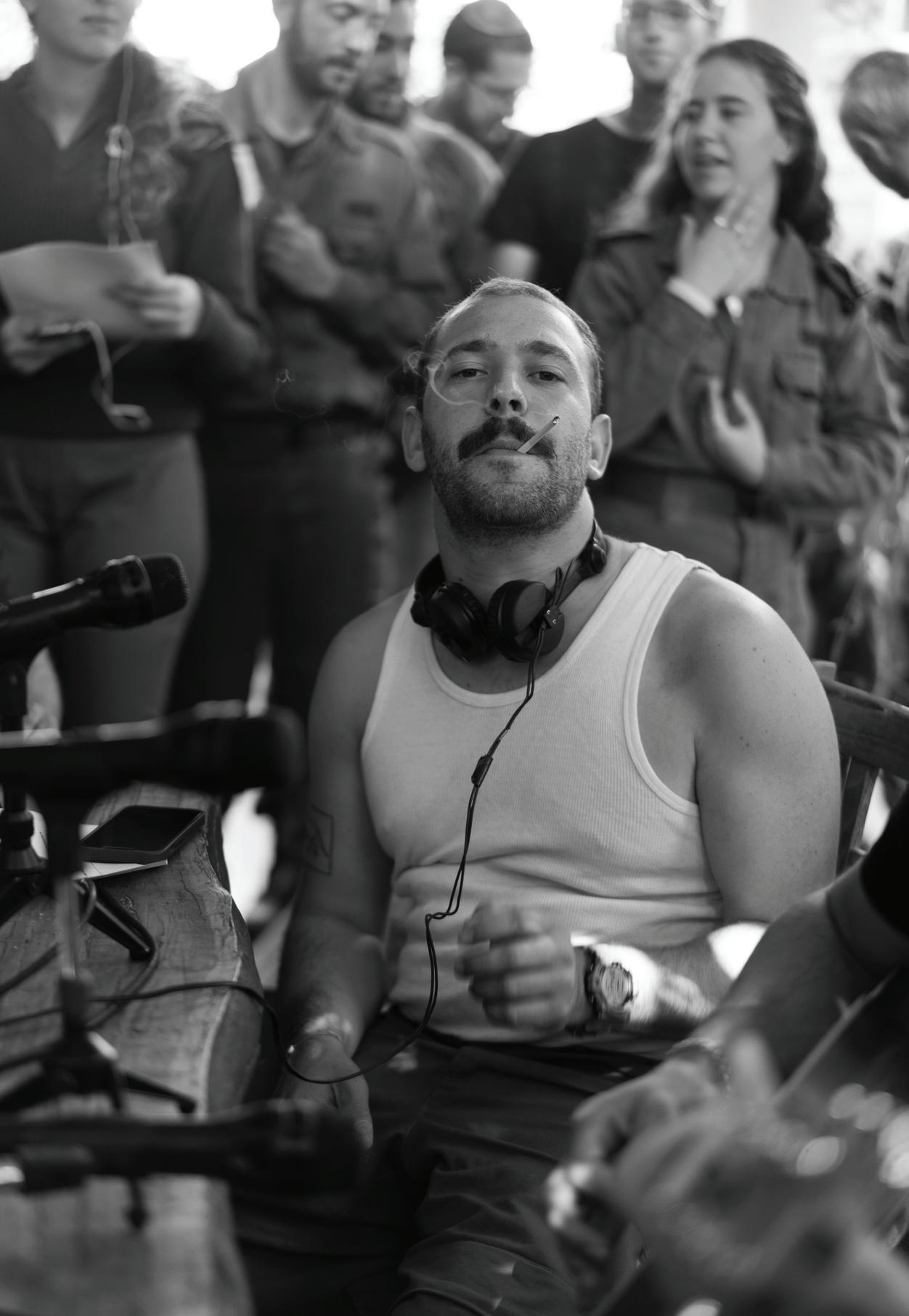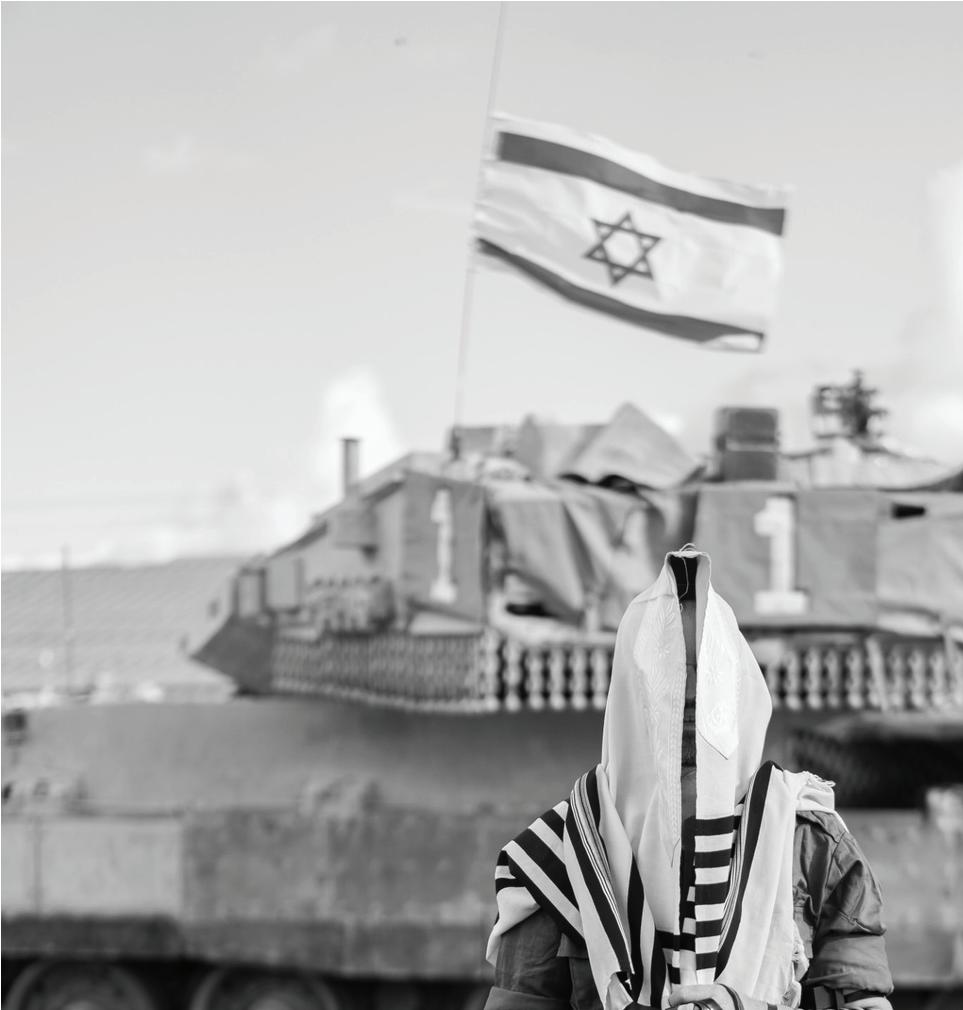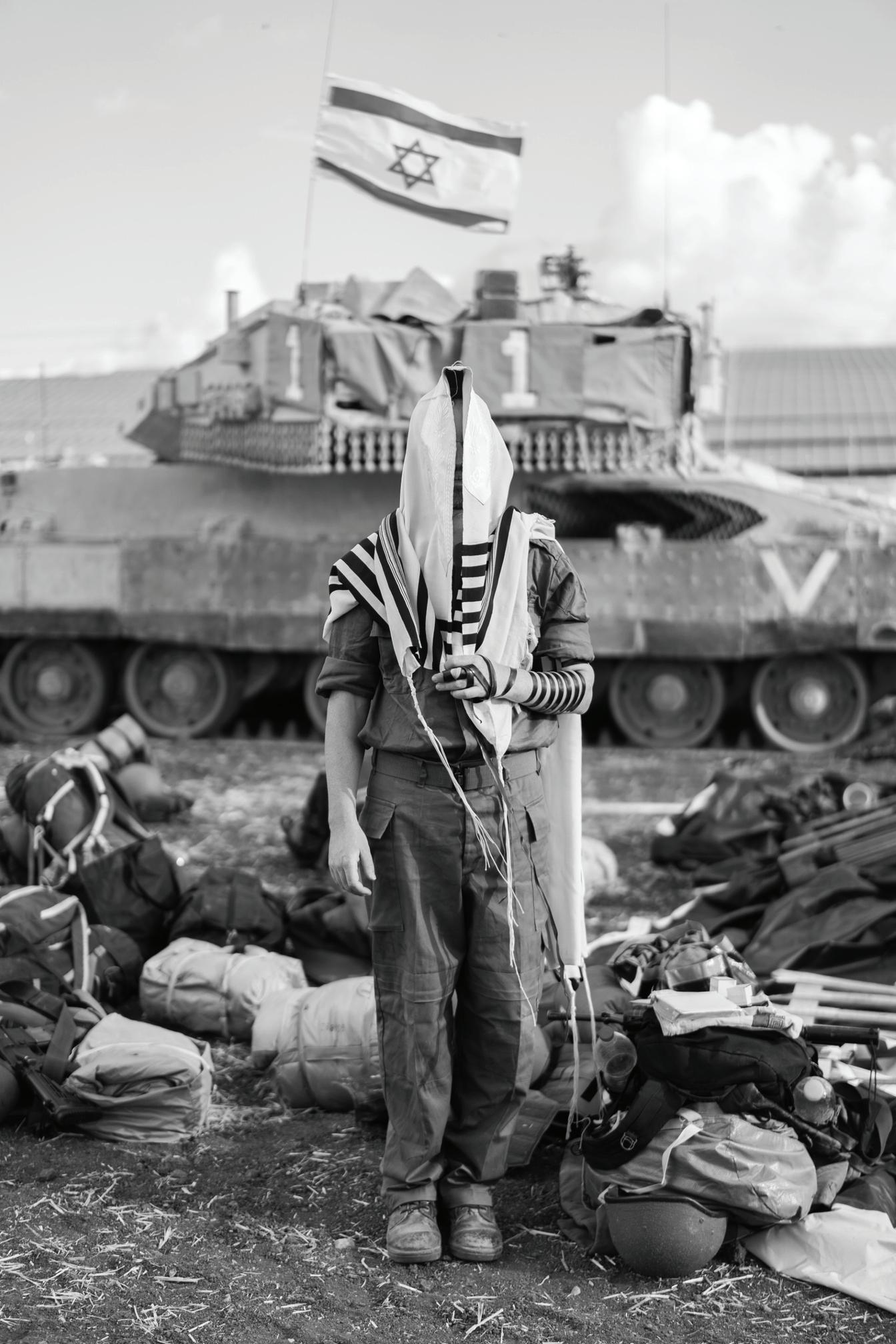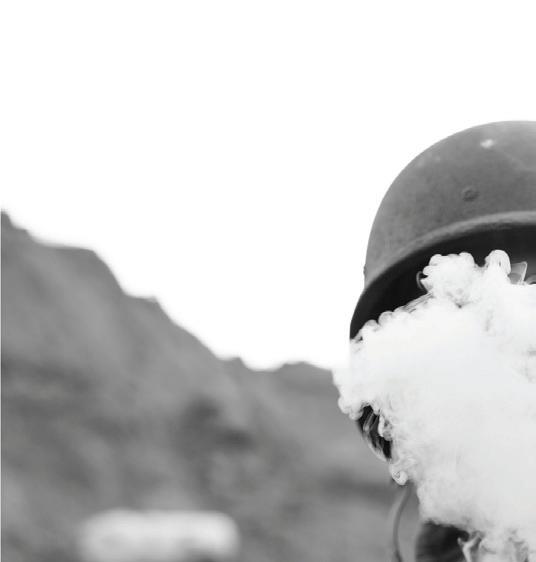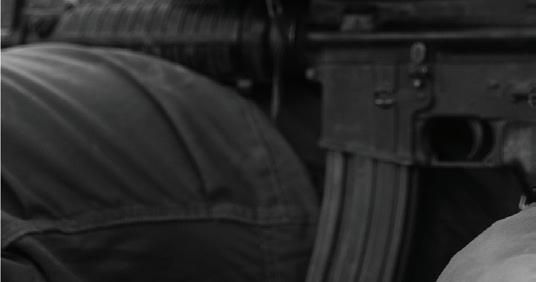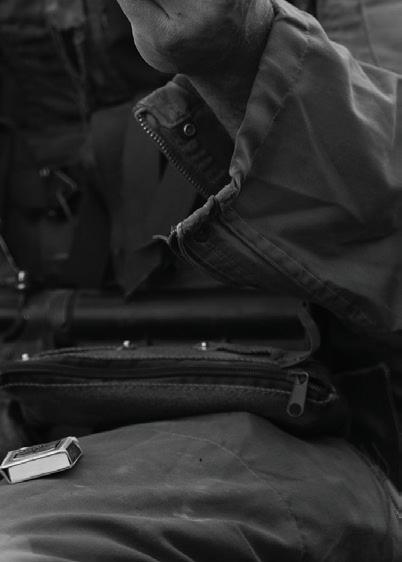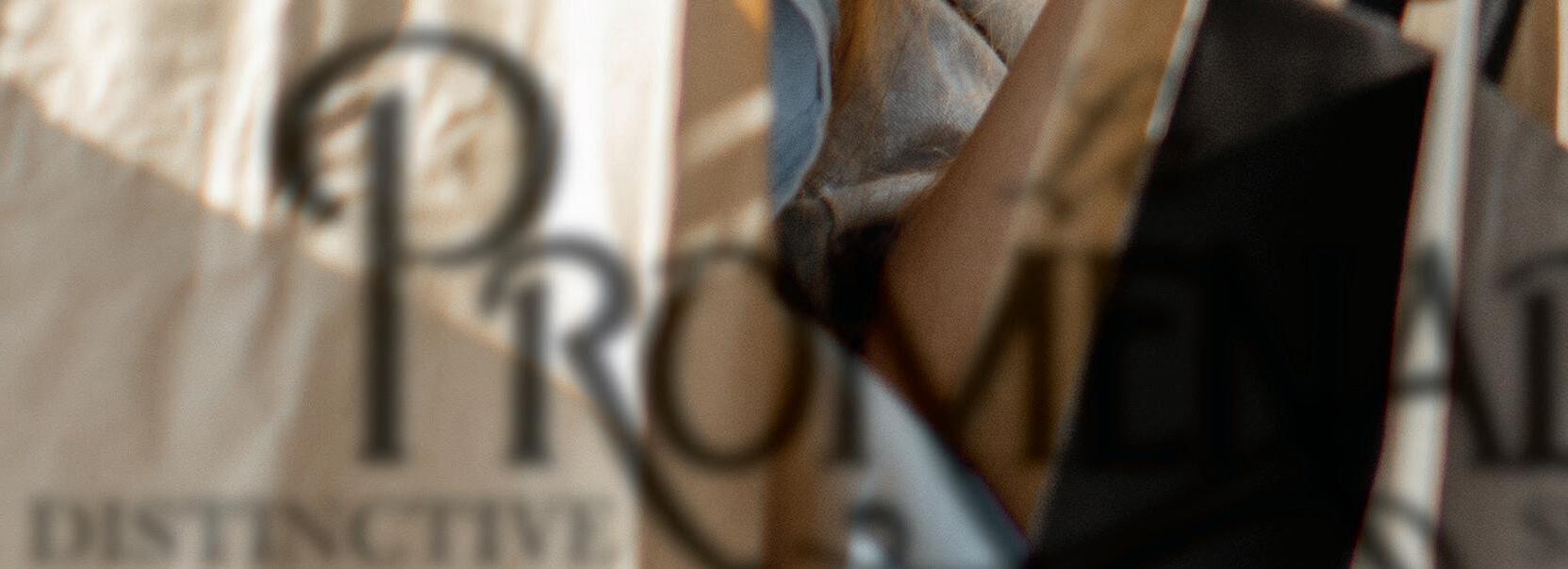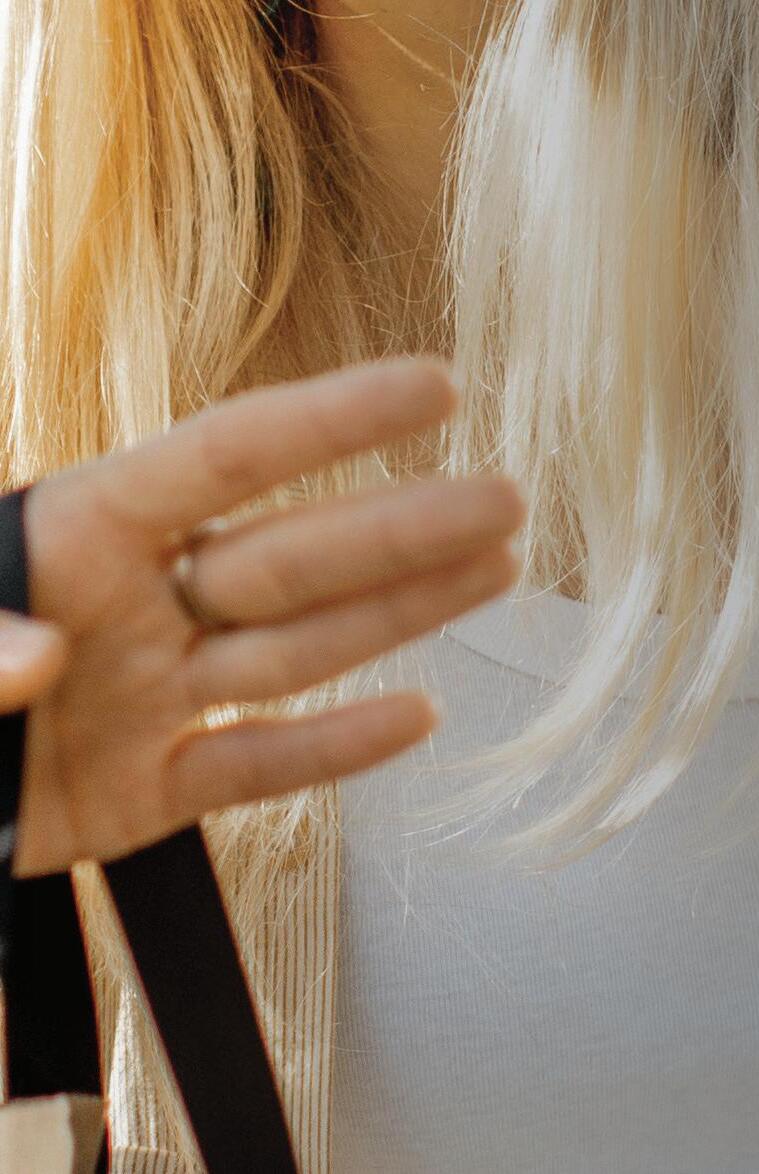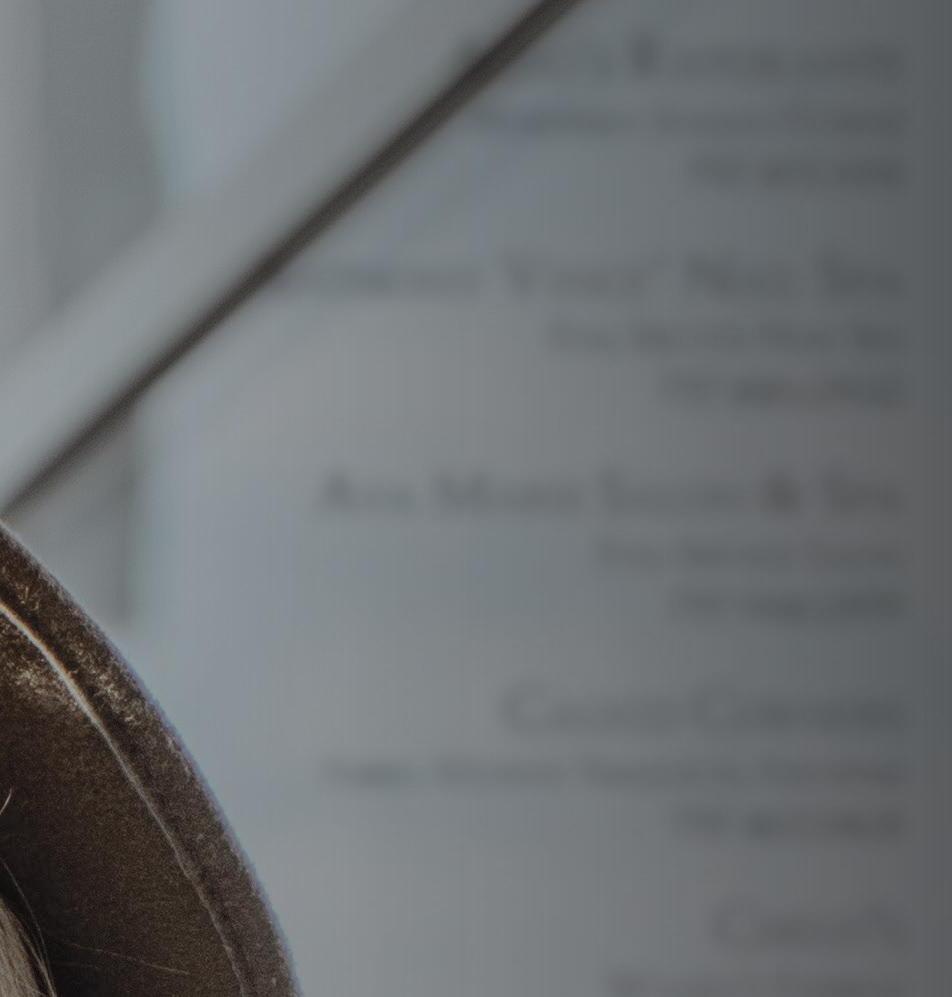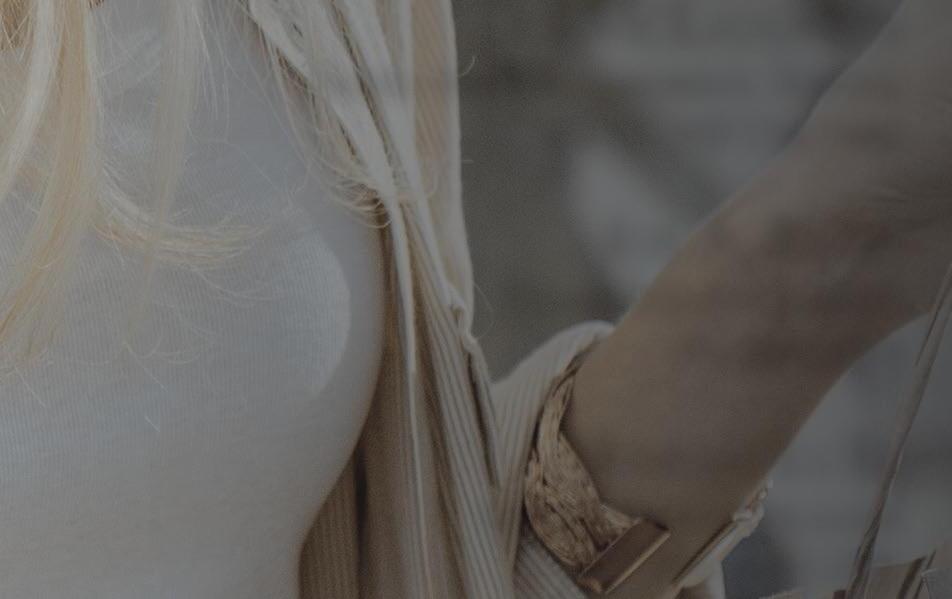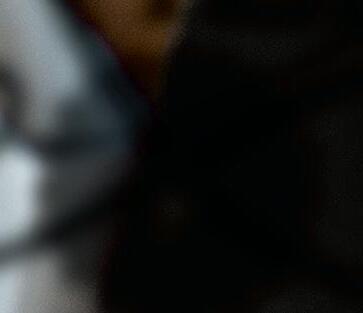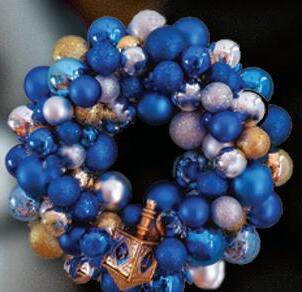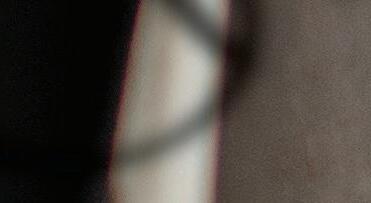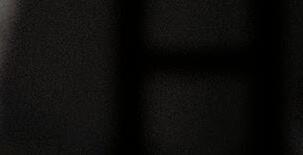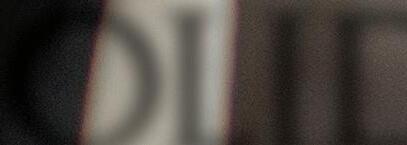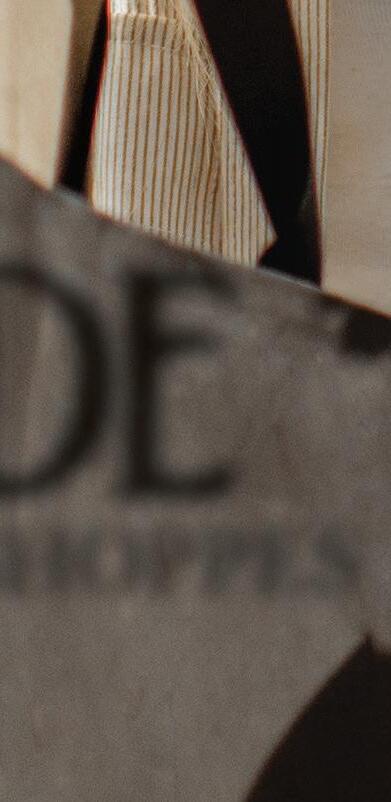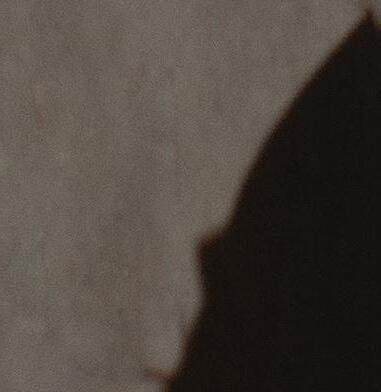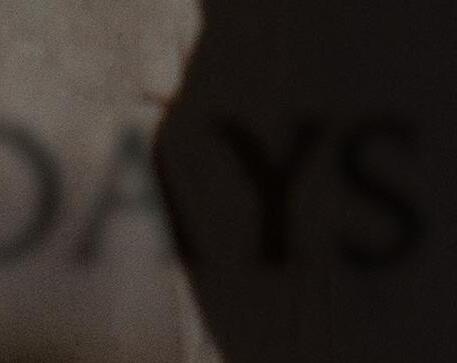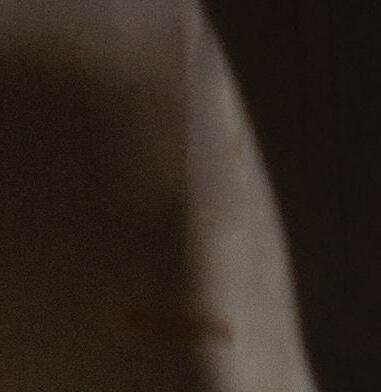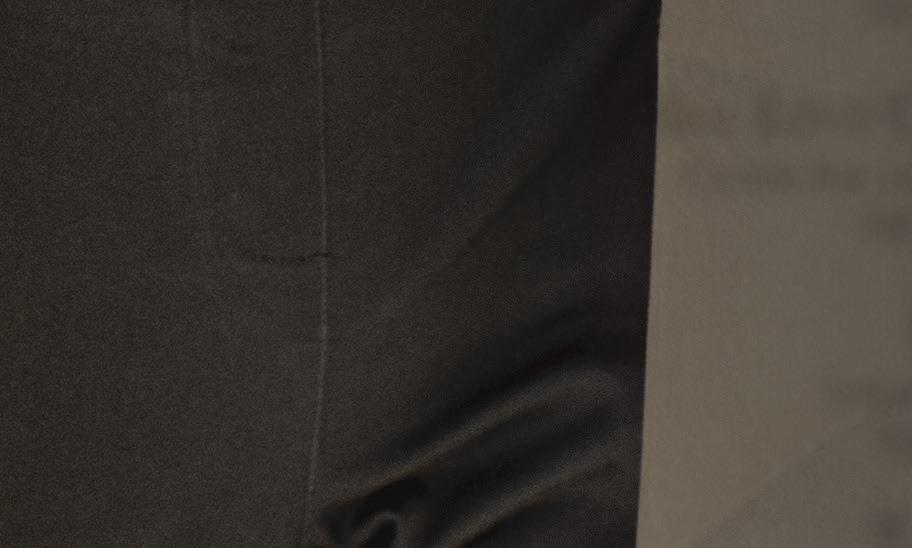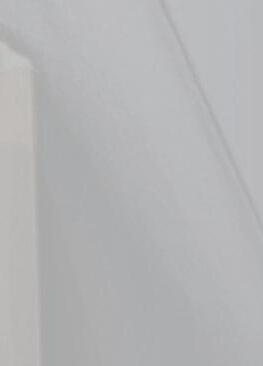



































































Checkered Flag offers peace of mind that saves our customers thousands of dollars over the life of their car. That’s how we give YOU the winning edge.






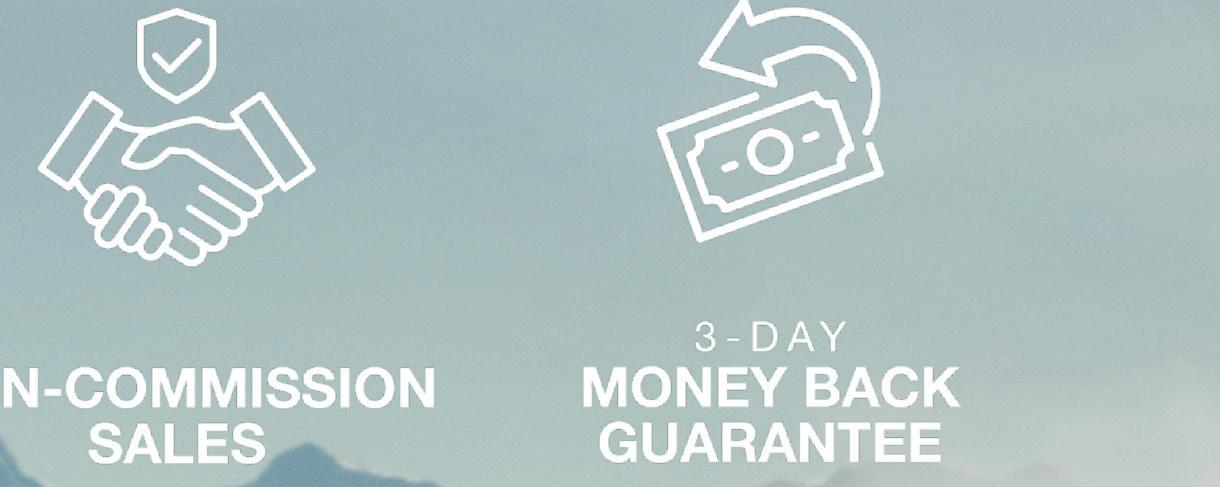





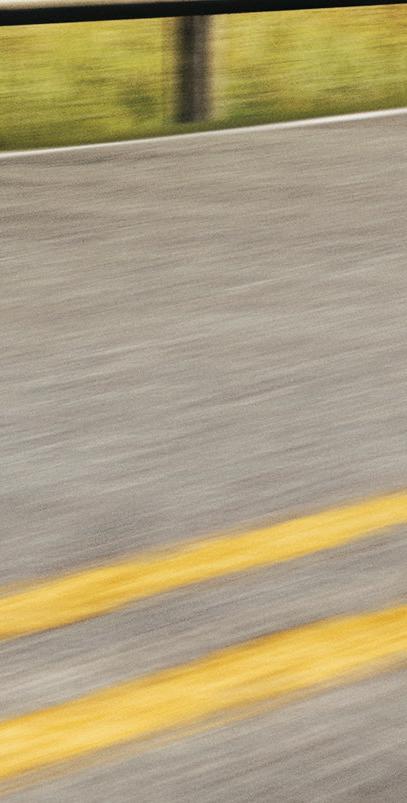
Betty Ann Levin
This past November in Washington, DC, a small group of colleagues and lay leaders from our Jewish community joined thousands of Jewish leaders from around the world at the Jewish Federations of North America (JFNA) General Assembly (GA).
Personally, I drew much inspiration from the GA. From the incredible scholar-in-residence, Mijal Biton, who provided motivating words of Torah throughout the conference in regard to three top priorities of Jewish Federations: support for Israel, combatting antisemitism, and building Jewish life in our communities; to hearing from plenary speakers such as Bari Weis, Sheryl Sandberg, Israel President Isaac Herzog, and our own Annie Sandler, president of the American-Jewish Joint Distribution Committee (JDC); to the numerous break-out sessions on a plethora of issues important to our communities.
A particularly inspirational plenary afforded us the opportunity to hear from three renowned clergy: Rabbi David Wolpe, rabbi emeritus at Sinai Temple in Los Angeles; Rabbi Sharon Brous, senior rabbi of IKAR in Los Angeles; and Rabbi Ari Berman, president of Yeshiva University in New York.
The rabbis began what was a mesmerizing conversation on the power of community and memorable moments they had experienced since October 7, 2023. Rabbi Wolpe discussed his multiple trips to Israel, and the poignancy of meeting with hostage families and other Israelis, as they prayed together and found comfort in their shared fear and anxiety.
Rabbi Sharon Brous also spoke about her visits to Israel and her family there, including about her brother attending a hostage’s funeral. The crowd of mourners extended blocks from the main gathering, and the words of the mourner’s kaddish “Yitgadal v’yitkadash sh’mei raba…” rolled through the crowd at every block, which, for Rabbi Brous, represented the power of a people who will show up for each other.
Finally, Rabbi Berman spoke about the Yeshiva University Macabee basketball team (ranked at one point in the past year #1 among Division III universities), who traveled to an away game in a small community in Pennsylvania. To their surprise, the arena was full of fans they did not know. They came from the local Reform synagogue to support the team. That was when the team realized they were playing for someone larger than themselves – they were playing for a people.
All of us have our own memories and experiences, post-October 7, 2023. Our community has shown up for one another, for Israel, and for the Jewish people in so many ways over the last 14 months. We have showed our financial support for Israel through both our Annual and Emergency Campaigns, we have stood up against antisemitism through education, outreach, and advocacy, and we continue to build Jewish life in Tidewater through our synagogues, our Jewish days schools, our JCC and in so many other ways. We are a people who have and must continue to take care of one another – we are a community.
Wishing you and your loved ones a happy 2025.
Betty Ann Levin is executive vice president and CEO for United Jewish Federation of Tidewater and Simon Family JCC.
Published 18 times a year by United Jewish Federation of Tidewater.
Reba and Sam Sandler Family Campus of the Tidewater Jewish Community 5000 Corporate Woods Drive, Suite 200 Virginia Beach, Virginia 23462-4370 voice 757-965-6100 • fax 757-965-6102 email news@ujft.org
Terri Denison, Editor
Stephanie Peck, Assistant Editor
Michael McMahon, Art Director
Sandy Goldberg, Account Executive
Patty Malone, Circulation
Teresa Knecht, Digital Manager
Reba Karp, Editor Emeritus
United Jewish Federation of Tidewater David Leon, President Mona Flax, President-elect Alvin Wall, Treasurer
Jason Hoffman, Secretary Betty Ann Levin, Executive Vice President JewishVA.org
The appearance of advertising in the Jewish News does not constitute a kashrut, political, product or service endorsement. The articles and letters appearing herein are not necessarily the opinion of this newspaper.
©2024 Jewish News. All rights reserved.
Subscription: $18 per year For subscription or change of address, call 757-965-6128 or email pmalone@ujft.org Issue
Deadline January 20
Invest/Retire January 3 February 10 Foodie/Romance January 17 March 3 Mazel Tov February 7 March 24 Passover March 7
I’ve always tried to live a values-driven life, and my values are Jewish
Asynagogue in suburban Melbourne, Australia, was set ablaze on Friday, Dec. 6, causing congregants to flee and injuring at least one person.
The fire before dawn at Adass Israel, a haredi Orthodox synagogue in the town of Ripponlea, sent congregants gathered for morning prayers into the streets at 4:10 am. Those who fled the fire reported assailants breaking windows and throwing firebombs into the building.
The damage from the fire appeared to be extensive and was brought under control by 5 am by a team of 60 firefighters and 17 trucks, according to The Age, an Australian publication.
“I unequivocally condemn the attack on a Melbourne synagogue early this morning,” Prime Minister Anthony Albanese said. “I have zero tolerance for antisemitism. It has absolutely no place in Australia.”
Benjamin Klein, a board member of the synagogue, told the Sydney Morning Herald that congregants reported that in addition to the firebombs and broken windows, assailants tossed in a flammable liquid and set it afire. One person’s hand was burned, he said.
The alleged attack occurred as the Australian Jewish community reported a fourfold increase in antisemitic incidents since Hamas attacked Israel on Oct. 7, 2023. Physical attacks on Jews spiked from 11 the previous year to 65.
“This morning’s fire has devastated Melbourne’s Jewish community and caused deep angst,” said David Southwick, a Jewish lawmaker. “Amidst the worst levels of antisemitism in living memory, the community needs clear answers as soon as possible.”
Adass Israel had about 200 member families as of 2016, according to The Age. It is affiliated with a school of the same name.
The police arson squad is investigating the incident, which it believes was a “targeted incident,” according to The New York Times. That would make this the second time the synagogue has been purposefully set on fire, following a 1995 attack of the same nature.
“My grandfather was the president at the time,” Klein told The Age. “He was a Holocaust survivor, and I will never forget him standing among the smoke and ash and just crying.” (JTA)
Chuck Schumer reelected head of Senate Democrats
Sen. Chuck Schumer, the New York Democrat, is ready to relinquish his title as Senate majority leader, but the most senior Jewish elected official in U.S. history will get to remain the leader of what will be a minority caucus in the next Congress.
Senate Democrats reelected Schumer as their leader, a validation after a tough election for the party, which lost control of the White House and the Senate and failed to regain the U.S. House of Representatives. Schumer was unopposed and the vote was unanimous.
As of Jan. 3, Schumer will lead a minority in a chamber split 47 Democrats to 53 Republicans, as opposed to the 51-49 Democratic majority he has led since January 2023.
The 2024 map was much tougher for Democrats than Republicans, with Democrats having to defend 24 seats and Republicans having to defend just 10.
In remarks after the vote, Schumer alluded to the fact that Republicans are still seven shy of a filibuster-busting 60 votes and would need Democrats to get legislation passed.
“Our preference is to secure bipartisan solutions wherever possible and look for ways to collaborate with our Republican colleagues to help working families,” Schumer said. “However, our Republican colleagues should make no mistake about it, we will always stand up for our values.”
In the few weeks he remains majority leader, Schumer has much on his plate, including getting approved a slate of federal judges nominated by President Joe Biden. He has also vowed to push through a version of the Antisemitism Awareness Act, which would enshrine into law the International Holocaust Remembrance Alliance definition of antisemitism. The IHRA definition is controversial and opposed by a number of Democrats who see its definitions of antisemitism relating to Israel criticism as over broad. A few Republicans in Congress oppose the definition because they believe it prohibits elements of Christian belief. (JTA)
Trump picks Jewish space adventurer Jared Isaacman to head NASA
To advance his efforts to return Americans to the moon, President-elect Donald Trump is tapping a Jewish entrepreneur who has traveled privately to space himself.
Jared Isaacman, 41, is the founder and CEO of Shift4, a payment processing company. He is best known for his high-profile, private jaunts into space, most recently traveling on a rocket built by SpaceX, owned by Trump’s billionaire ally Elon Musk, to conduct the first private spacewalk ever in September. His inaugural space voyage, in 2021, was the first to proceed without a professional astronaut on board.
Trump announced that he would nominate Isaacman to helm NASA.
“With the support of President Trump, I can promise you this: We will never again lose our ability to journey to the stars and never settle for second place,” tweeted Isaacman, whose travels have prompted reflections on how Jewish law would address spaceflight, after Trump’s announcement. “Americans will walk on the Moon and Mars and in doing so, we will make life better here on Earth.”
Isaacman, a high school dropout and billionaire, is Jewish but has not made that piece of his identity a major part of his public persona. This year, he and his father Don, who is on Shift4’s board, were among dozens of people on a gala committee for Chabad of Hunterdon
County, the Hasidic movement’s outpost in their area of New Jersey. In 2010, Isaacman donated the opportunity to be “Fighter Pilot for a Day” on one of his planes to a Chabad auction.
Isaacman would not be the first Jewish NASA director. President George H.W. Bush selected Daniel S. Goldin, an engineer who had been active in the movement to free Soviet Jewry, to helm the organization in 1992. (JTA)
Yale University’s student government held a campus vote on a referendum centered in part on a call for divestment from Israel. The measure passed by a wide margin in an election in which just under half of the student body took part. It does not require the university to change any policies. In fact, if past referendums are an indicator, this one will be unlikely to spark tangible action by the school.
Yale Friends of Israel, which opposed the referendum, said they are confident that Yale will “continue to invest in companies that assist in the protection of the United States and its allies, including Israel.” ADL’s Connecticut office also criticized the vote, noting that “The BDS movement does not seek to create a Palestinian state but rather aims to dismantle the Jewish state and Jewish selfdetermination.” (ADL)
Brigham Young University quarterback Jake Retzlaff has become a household name for Jewish sports fans this season. The Jewish California native led the Cougars to a 10-2 record and top-25 national ranking, all while proudly wearing his Jewish identity on his sleeve at the Mormon flagship.
Now, Retzlaff, BYU’s first Jewish starting QB, is making history again: as the first athlete to sign a sponsorship deal with none other than Manischewitz, the iconic Jewish food brand.
The deal — brokered through the NCAA’s NIL (name, image, likeness) policy, which allows college athletes to profit from their personal brands — will include special-edition Retzlaff-branded matzah, as well as social media content featuring recipes and other Jewish holiday traditions. (Manischewitz famously spells the unleavened bread “matzo.”)
“Manischewitz has always been part of my life,” Retzlaff said in a media release. “I grew up with matzo with peanut butter as my favorite snack, and every Passover, my family and I made matzo pizza together. At Hanukkah time our tradition was making potato latkes.”
He continued: “Now, at BYU, I’m able to share these traditions with my teammates. This partnership is about more than football — it’s about creating connections and celebrating Jewish pride in ways I never expected.” (JTA) (AMP)) and the National Students for Justice in Palestine (NSJP) accountable for allegedly providing
Ron Kampeas (JTA) — WASHINGTON — Massad Boulos, President-elect Donald Trump’s advisor on Middle Eastern and Arab affairs, said that the United States would have to discuss laying out a “roadmap” to Palestinian statehood if it hopes to establish relations between Israel and Saudi Arabia.
Saudi officials have long made it known that they would not establish ties with Israel absent progress toward a Palestinian state. But for Boulos — a Lebanese-American billionaire and the father-in-law of Trump’s daughter Tiffany — to emphasize the point is significant because other Trump appointees, in addition to Trump himself, are seen as close to the Israeli right, which rejects Palestinian statehood.
“I think the issue of a roadmap that would lead to a Palestinian state is an important part of the discussions between the United States and Saudi Arabia,” Boulos said in a wide-ranging interview this month with Le Point, a French magazine. “It is certainly a very important point.”
Boulos, 53, framed the focus on Palestinian statehood in terms of expanding the Abraham Accords, the 2020 normalization agreements between Israel and four Arab countries that were Trump’s signature foreign policy achievement in his first term.
Trump has spoken repeatedly about expanding the Abraham Accords. In the interview, Boulos said that many additional countries would initiate ties with Israel if Saudi Arabia did so.
“It is important to remember that Saudi Arabia is not demanding the creation of a Palestinian state today, but it is asking for a vision and a road map for it, that’s all,” he said. “Today, the president’s priority is to resume discussions on the Abraham Accords, with, of course, Saudi Arabia first. Because we know very well, and the president has said it, that once we agree with Saudi Arabia on Israel, there will be at least 12 Arab countries that will
be immediately ready to follow suit.”
It’s not clear how much influence Boulos will have with Trump. Another relative, Trump’s son-in-law Jared Kushner, spearheaded the Abraham Accords in Trump’s first term in addition to taking point on a wide range of other issues. Boulos had campaigned for Trump in Michigan, which has a large Arab-American population and which the president-elect won.
“Massad is an accomplished lawyer and a highly respected leader in the business world, with extensive experience on the International scene,” Trump said when announcing Boulos’ position on Truth Social, the platform Trump owns. “He has been a longtime proponent of Republican and Conservative values, an asset to my Campaign, and was instrumental in building tremendous new coalitions with the Arab American Community. Massad is a dealmaker, and an unwavering supporter of PEACE in the Middle East.”
Before Hamas attacked Israel on Oct. 7, 2023, launching Israel’s multi-front war, a deal with Saudi Arabia was also a primary goal of President Joe Biden as well as Israeli Prime Minister Benjamin Netanyahu. But Netanyahu opposes the establishment of a Palestinian state and has doubled down on that position since the Oct. 7 attack. Most Israelis also oppose Palestinian statehood.
Also opposed to a Palestinian state is Mike Huckabee, Trump’s pick for ambassador to Israel, who supports Israel perpetually controlling the West Bank, which would preclude Palestinian statehood. Trump’s former ambassador to Israel, David Friedman, also supports Israel’s West Bank settlements.
Trump has also named pro-Israel hawks to other key positions, including Florida Rep. Mike Waltz as national security adviser; Rep. Elise Stefanik as United Nations ambassador; Fox News pundit Pete Hegseth as defense secretary,

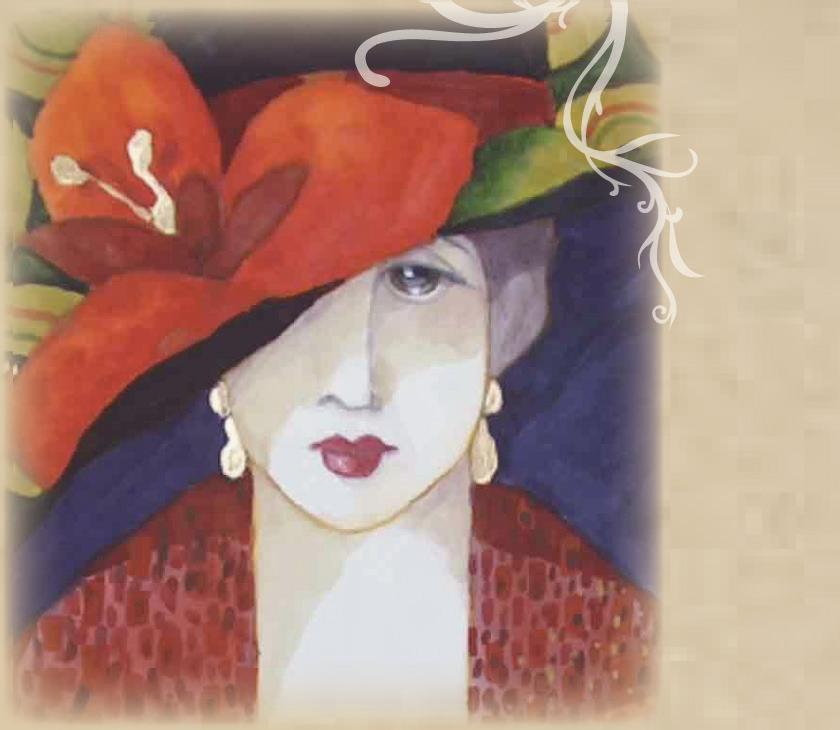
and Marco Rubio as secretary of state.
Boulos would not address calls from far-right figures in Netanyahu’s coalition to annex the West Bank, but said that as of Trump’s inauguration on Jan. 20 there would be a “very clear and precise policy on this issue, and one that must be respected.”
Before the Abraham Accords were signed, Trump had proposed a peace plan that would have seen expanded Palestinian autonomy in the West Bank — though Israeli settlements would have remained in place and Israel would have security control over the entire area.
Palestinian leaders immediately rejected the proposal because it stopped short of giving them statehood — but Boulos feels that it was tantamount to endorsing a Palestinian state.
“If you look at the plan that was proposed in 2020 by President Trump, it spoke very clearly about an eventual Palestinian state,” he said.
On Iran, Boulos echoed Trump in saying there should be a new nuclear deal to replace the one Trump pulled out of in 2018 at Netanyahu’s behest. Boulos also noted that Trump has not spoken of regime change in Iran.
customize your l e g a c y
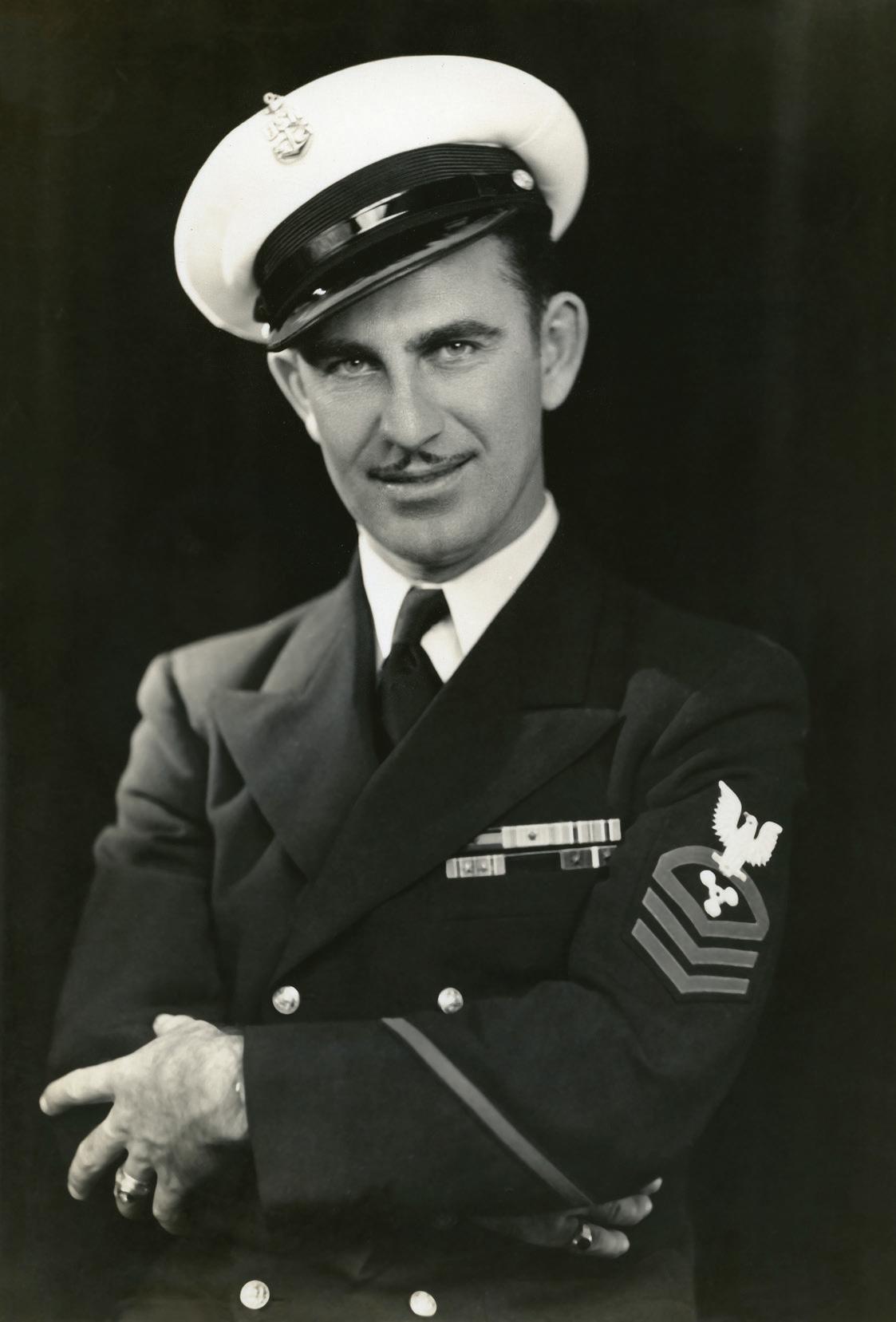
Making final plans and writing a will can be difficult Thinking now about a future charitable gift can help you to leave a lasting legacy
Fred Ward’s estate gift established the Gertrude Ward Scholarship, named for his wife It has helped students pay for their college education since 2011
Ben Sales
(JTA) — Syrian dictator Bashar Assad has fled the country, and his government has fallen to rebels, a swift and stunning collapse after more than a decade of civil war.
The country is now enveloped in joy and turmoil as hundreds of thousands of refugees stream home, political prisoners go free, and Syrians — along with the rest of the world — wonder what’s next.
Also wrapped up in uncertainty: Syria’s neighbor and longtime adversary, Israel. Assad’s fall came after several of his regional partners have been weakened in Israel’s multi-front war, which began with Hamas’ Oct. 7, 2023, invasion.
Israeli troops entered a buffer zone with Syria Dec. 8 and its planes began bombing Syrian chemical weapons facilities and other targets in Damascus, the capital.
Beyond that, Israeli leaders are broadcasting optimism about the fall of Assad, a key Iranian ally, while girding themselves for the ascension of the jihadist-linked group that toppled him.
To honor a special person in your life with a gift that gives forever, visit us at Leaveabequest.org.
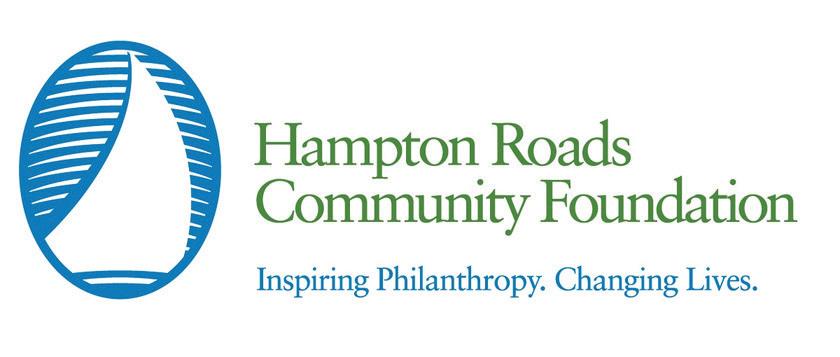
Assad’s main supporters.” President-elect Donald Trump, too, credited “Israel and its fighting success” contributing to the chain of events.
On Sunday, Dec. 8, President Joe Biden also said the Oct. 7 attack and Israel’s response led to Assad’s ouster. Iran, Hezbollah, and Russia are “far weaker today than they were when I took office,” Biden said. After the Oct. 7 attack, he added, “Iran and its proxies chose to launch a multi-front war against Israel. That was a historic mistake on Iran’s part.”
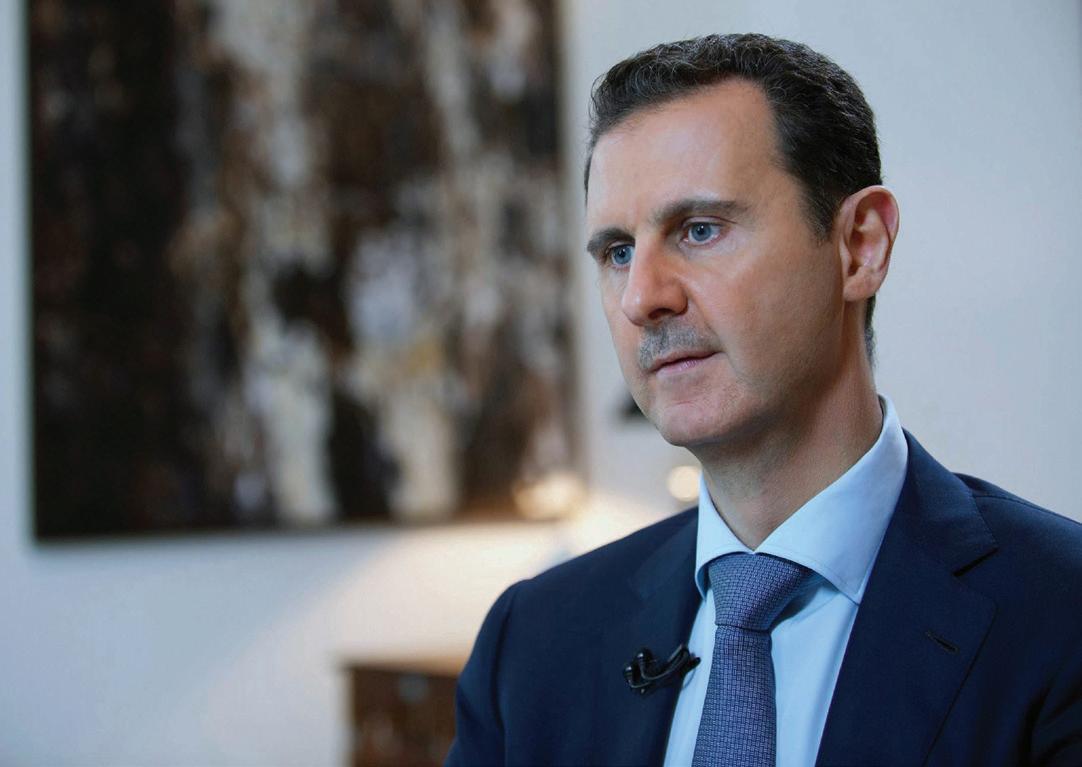
Events are still unfolding rapidly in Syria and the region. But in the immediate wake of Assad’s ouster, here’s what this means for Israel.
Oct. 7 likely contributed to Assad’s downfall. To remain in power during the Syrian civil war, Assad relied on several allies — including Hezbollah, Iran, and Russia.
Now, those allies have been weakened or are fighting elsewhere. Russia, which shored up Assad in 2015 at a key moment in the civil war, has focused its firepower on Ukraine since invading that country nearly three years ago.
Hezbollah, the Lebanese terror group that is also funded by Iran, sent thousands of its fighters to Syria to battle on Assad’s behalf.
Following Hamas’ invasion of Israel on Oct. 7, 2023, Hezbollah began shelling Israel’s northern border area. That conflict escalated sharply a few months ago and ended with a ceasefire last month, after Israel destroyed much of Hezbollah’s capabilities and leadership.
Iran, too, has engaged in a few rounds of direct conflict with Israel, during which Israel bombed its air defenses.
Israeli Prime Minister Benjamin Netanyahu called Assad’s defeat “the direct result of our forceful action against Hezbollah and Iran,
Iran is widely seen as Israel’s chief adversary, and it funded and coordinated extensive efforts in the region to counter Israel. For Israel, Assad’s ouster means that yet another node of Iran’s so-called regional “Axis of Resistance” has been taken out. But since Oct. 7, that alliance has been decimated. Its members include:
• Hamas, the Gaza-based terror group that has been all but destroyed after 14 months of war with Israel.
• Hezbollah, which has suffered a heavy blow in its conflict with Israel.
• The Houthis, a Yemeni terror group that has also bombed Israel and been hit with airstrikes from a multinational coalition.
• Assad in Syria, who is now deposed.
To both sympathizers and opponents, Assad’s downfall is a huge setback for Iran and its regional influence.
“Iran has suffered a strategic defeat with the fall of Assad,” tweeted Dennis Ross, a veteran former U.S. government official focused on the Middle East. He wrote that Iran’s “ring of fire around Israel is gone.”
He also noted that Iran transferred weapons to Hezbollah via Syria, which could now be impossible. “Without the Syrian land/ air bridge, it can’t easily rebuild a defeated Hezbollah. Its enormous investment in Syria has gone down the drain,” he wrote.
Rania Khalek, a journalist who has expressed sympathy for Iranian aims and criticized the Syrian rebels, tweeted, “The resistance axis era is over. Regionally Israel/US won this battle, and we have to recognize that and reflect internally on why and how.”
Israeli parliamentary opposition leader Yair Lapid called for Israel to take the opportunity of a teetering Iran to “work toward
a diplomatic achievement” that will work toward Israel’s interests in Gaza and the West Bank.
The victorious rebel group is no friend of Israel’s — but has taken a pragmatic turn. That doesn’t mean the rebels are an ally of Israel. The group that has led the offensive is Hayat Tahrir al-Sham or HTS, an Islamist organization that evolved out of the Nusra Front, a group that was affi liated with the terror group Al-Qaeda and with the Islamic State. A standard piece of that ideology is opposition to Israel.
“In terms of HTS’ stance on Israel, they’ve always been for the Palestinian cause,” says Aaron Zelin, a senior research fellow at the Washington Institute for Near East Policy who wrote a book on HTS called The Age of Political Jihadism. Zelin says HTS has celebrated Hamas attacks on Israel for years, including the Oct. 7 invasion, and has praised the Hamas leaders Israel has killed.
captured from Syria in 1967 and later annexed. Zelin says Jolani’s father was originally from the Golan before moving to Damascus and Saudi Arabia, where Jolani was born.
That history has led to some trepidation in Israel.
“The events in Syria are far from a reason for celebration,” tweeted Amichai Chikli, the right-wing Israeli Diaspora affairs minister. “Despite the rebranding of Hayat Tahrir al-Sham… the bottom line is that most of Syria is now controlled by a subsidiary of al-Qaeda and ISIS.”
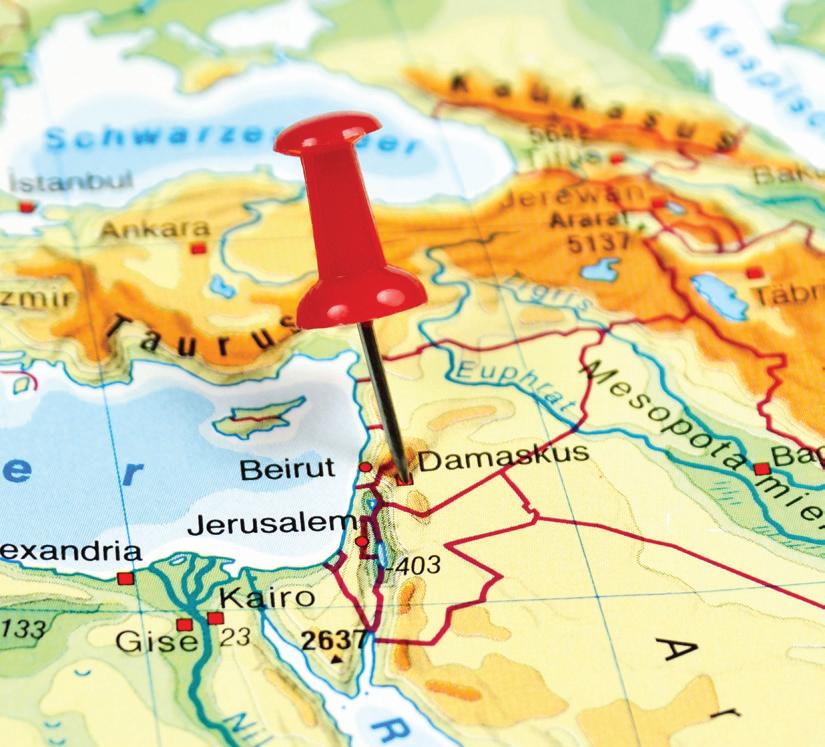
The group’s leader goes by the nom de guerre Abu Mohammad al-Jolani. The name indicates that the family of Jolani, 42, is from the Golan, the region that Israel
He added, “We can’t let the jihadists establish themselves next to our towns.”
Zelin, however, has documented a turn toward pragmatism by HTS. He calls the group “somewhat pragmatic” and adds, “I think that starting something with Israel would be suicidal from their perspective.”
A statement by HTS that Zelin posted to social media said the group was focused on “construction and progress” within Syria. The group added, “Liberated Syria looks forward to strengthening its relations with all brotherly and friendly countries on the basis of

The Care You Need. The Quality You Deserve.
"Recently my mother required 12 hour per day personal care assistance. On short notice, Changing Tides Home Care provided the necessary assistance. They have been responsive to my mother's needs and have kept the family informed by telephone, text and portal. I am very pleased with their services.”
-Andrew H. Hook, President of Hook Law Center

mutual respect and common interests.”
Israel and Syria haven’t fought for half a century — and probably won’t start now. That’s one reason why, despite instability and violence on yet another one of its borders, Israel likely will not find itself at war with whomever takes power in Syria. The countries haven’t fought a major conflict since the 1973 Yom Kippur War, though Israel has bombed weapons shipments to Hezbollah in Syria numerous times.
Right now, the future of Syria’s government is unclear, different rebel groups control different areas, and military positions have been abandoned. In response, Netanyahu said, Israeli forces have entered the buffer zone between the two countries “to take action against possible threats.”
He said that Israel wants “neighborly relations and peaceful relations with the new forces emerging in Syria” if possible. He added, “The Syrian army abandoned its positions. We gave the Israeli army the order to take over these positions to ensure that no hostile force embeds itself right next to the border of Israel. This is a temporary defensive position until a suitable arrangement is found.”
In a statement, the Israeli military said that the presence of troops in the buffer zone doesn’t mean that Israel is getting involved in whatever fighting is to come. “We emphasize that the IDF is not interfering with the internal events in Syria,” it said.




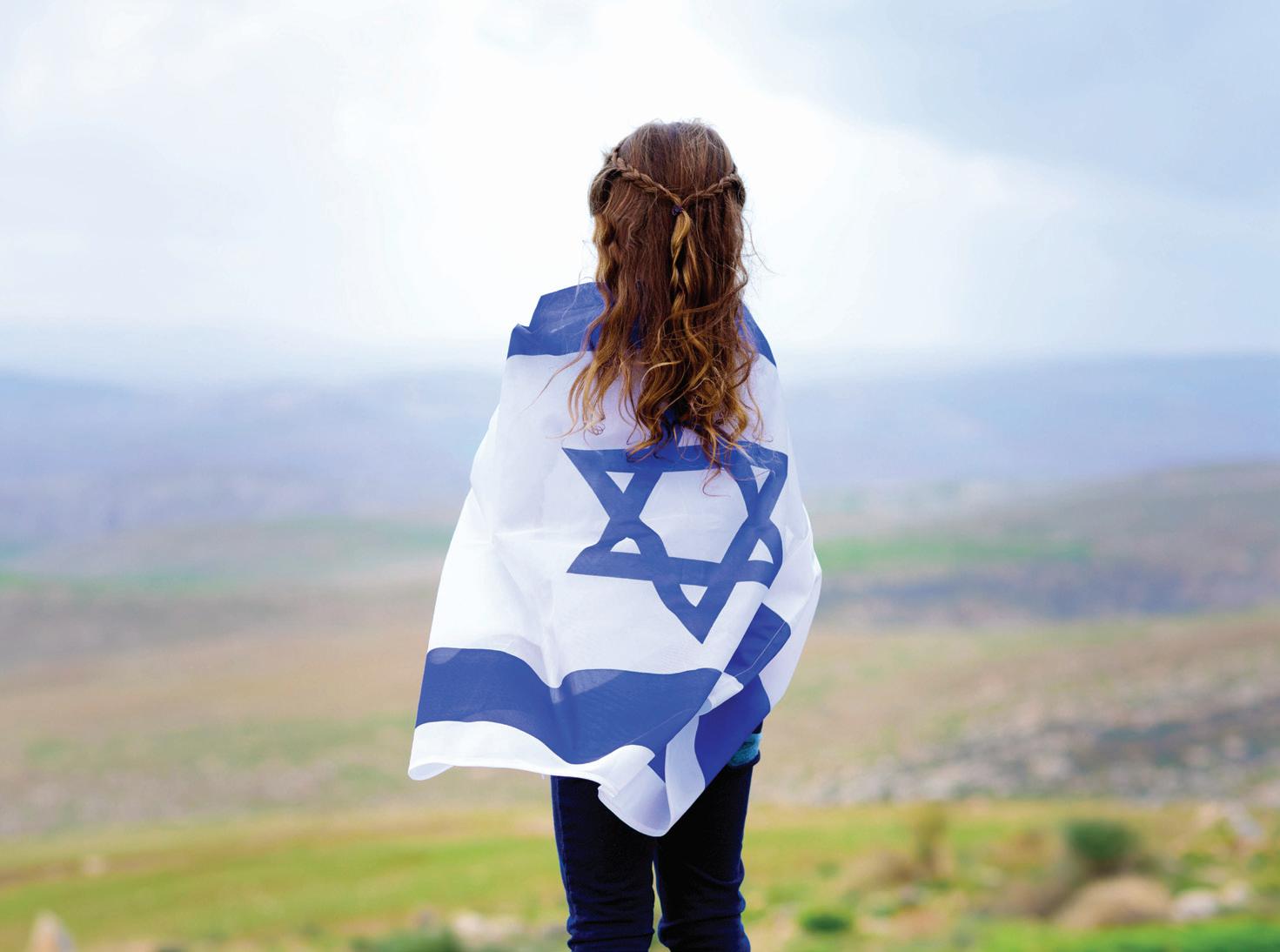
Asaf Elia-Shalev (JTA) — The Schusterman family is in the oil and gas business. Now they are also donors to a group that believes the emissions from burning fossil fuels constitute an existential threat to humankind.
Newly released tax disclosures for 2023 show that the Charles and Lynn Schusterman Family Philanthropies gave a $300,000 grant to Adamah, the largest Jewish environmental organization, whose mission is to “cultivate vibrant Jewish life in deep connection with the earth, catalyzing culture change and systemic change through immersive experiences, Jewish environmental education, leadership development, and climate action.”
It’s the first grant ever from the Schusterman family foundation, one of the largest in the country, to a group dedicated to addressing the climate crisis.
The grant makes up a tiny fraction
of the $363 million the foundation gave out last year. Still, it is noteworthy because environmentalism is one of the few signature progressive issues where the Schustermans have not left a mark. By giving away hundreds of millions of dollars a year in areas like education, criminal justice, reproductive justice, and voting rights, the foundation has helped shape national debates on race, gender, and class.
With Adamah, the Schustermans found a way to make an initial foray into environmental philanthropy while also furthering the foundation’s core commitment of supporting the Jewish community. (The Jewish Telegraphic Agency’s parent organization, 70 Faces Media, is among the many Jewish groups that receive funding from the Schustermans.)
The two organizations didn’t make their leadership available for interviews,
opting instead to release statements. Adamah, which has referred to climate change as “the existential crisis of our times,” said in its statement that the partnership reflects a shared vision about making a positive impact on the Jewish community and the planet.
“We are grateful that Schusterman Family Philanthropies allow us to expand our efforts in creating a more sustainable and equitable future,” Adamah said. “We also recognize the Schusterman family’s roots in the energy industry and appreciate their commitment to leveraging their philanthropic resources to drive positive environmental change.”
The foundation’s statement suggested the donation is an expression of the Schusterman family’s long-held values rather than any kind of break with the family business.
“The Schusterman family believes abundant, affordable energy is vital to the economic well-being of the world’s growing population and has made limited investments in environmental education and efforts to protect the environment,” the statement says. “Adamah, which is among the leading Jewish organizations engaging in environmental education, is one of these investments. The Schustermans remain proud that their family business has enabled them to invest significant resources toward their philanthropic priorities, which include advancing racial, gender, and economic equity in the U.S. and strengthening both the Jewish community and Israel.”
The Schusterman name has been associated with Jewish philanthropy and leadership for many decades. Charles Schusterman, the family patriarch, died in 2000, which left his wife, Lynn, and daughter Stacy in charge of the family’s oil business and foundation. In 2011, the Schustermans sold the company for $7.2 billion, allowing their philanthropy to massively grow.
Today, the foundation is led by Stacy, who founded her own oil company, Samson Energy, after the sale, with a focus on drilling in Wyoming.
Her politics are unusual for an oil and gas billionaire. For example, among the top political donors from the fossil industry over the past several elections,
Schusterman’s Samson Energy is the only one to favor the Democratic Party over the more climate-skeptical Republican Party, according to OpenSecrets. Schusterman has also expressed specific support for President Joe Biden’s climate agenda and cited the significance of climate change in making clean technology investments.
Her views stand out in an industry that has traditionally funded climate denialism and has been vilified by the climate movement over the impact of fossil fuel emissions on the planet.
Adamah, which means “earth” in Hebrew, is part of the climate movement, but its focus on the issue is relatively recent and the group has never engaged in attacks on the oil and gas industry.
Formed in 2023, Adamah is the product of a merger between Hazon, a New York City-based environmental group, and the Pearlstone Center, a retreat center specializing in outdoor education outside of Baltimore. It shares a name with the Adamah Farm Fellowship, a program it
runs for young Jewish adults founded in 2003 that combines farming and Jewish learning and community.
Last year, Adamah launched its signature climate initiative, the Jewish Climate Leadership Coalition, uniting 20 of the most prominent Jewish institutions with significant representation of denominations from Reform to Orthodox.
Hillel, the Jewish Federations of North America, Birthright, the Foundation for Jewish Camp, and Moishe House are among the marquee founding partners of the coalition.
Members publish annual plans detailing past actions and commitments toward reducing greenhouse gas emissions and mobilizing constituents around climate. There are no mandates. Each member decides what to include, which can range from installing solar panels to a community gathering centered on discussing the issue.
Adamah’s approach of building consensus by letting allies decide what
measures are helpful contrasts with the strategy pursued by the other major Jewish climate group. Dayenu, whose name means “enough” in Hebrew, is more activist, mobilizing the Jewish community to demonstrate against oil companies and vote for climate-friendly politicians and policies. Dayenu also pressures Jewish institutions to divest their endowments from the fossil fuel industry in protest, which several have recently done.
Despite the differences, Dayneu’s recent wins and Adamah’s grant from the Schustermans are part of same wave, an awakening of Jewish institutions, beginning last year, to the role they can play in addressing the climate crisis.
“It’s the beginning of what will become a more widespread focus among Jewish groups,” Rabbi Jennie Rosenn, the CEO of Dayenu, said last year. “We’re seeing an awakening to this as a profoundly Jewish issue and awakening to the role that the Jewish community has to play in addressing the climate crisis.”

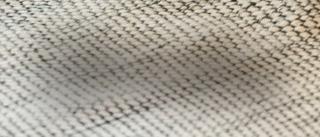
I stood in Nationals Park on November 10, 2024, gazing across the vast expanse of empty seats. While we hoped for a crowd of tens of thousands to gather in unity, the turnout of closer to 5,000 felt like a stark reminder of the challenges we face. The energy was markedly different from last year’s rally when hundreds of thousands came together after the October 7 attacks to unequivocally stand with Israel. This year, the stadium’s emptiness felt heavy, a reflection of waning engagement and attention.
The celebrity headliners, who had brought so much anticipation, gave heartfelt performances. Their presence was appreciated, but their voices could not fill the gaps in the stands—or the weariness in our hearts. Over a year later, the conflict with Hamas persists, and the yearning for resolution grows more desperate. Hostages remain in captivity, and the urgency for steadfast support from Israel’s allies is palpable.
Standing there, I felt a small measure of relief that my three young adult children were not with me. They are passionately fighting their own battles for Jewish identity and Israel on their college campuses and in their social circles. To see the empty seats and feel the muted energy of the rally would have been deflating and discouraging for them. They are already navigating a world that often feels unkind and unwelcoming to their voices. I want them to carry the hope and determination that sustain us, not the disillusionment that an event like this could invoke.
At the same time, here in the United States, we’re grappling with a troubling surge in antisemitism. Communities that once stood with us now feel distant. The silence of major organizations we have supported through decades of shared struggles is deafening. Many of us feel isolated, questioning who will stand with us as we continue this fight.
The Jewish community is weary—so deeply weary. We’re tired of fighting the same battles, decade after decade. We’re tired of witnessing history repeat itself in ways that strip us of our dignity, our safety, and our hope. And yet, as I stood there in that echoing stadium,
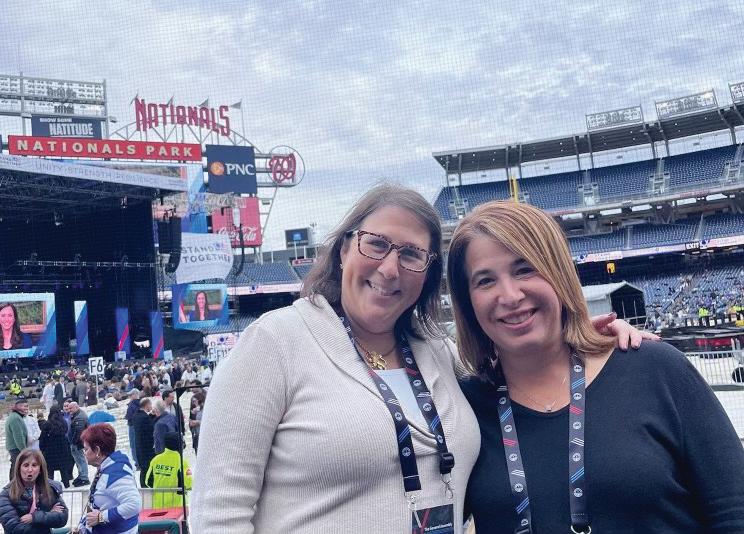
one truth was clear: We cannot afford to stop standing.
We must stand, even when the world turns away. We must stand for our people, our homeland, and the principles that sustain us as a global community. We must stand because to sit down would be to give up, and giving up is not an option.
As we face these challenges, I am reminded of a truth that strengthens my resolve: securing the future of the Jewish community must remain at the forefront of our efforts. Securing assets for the Jewish community through legacy gifts is of paramount importance. These gifts demonstrate that we are standing together, not only for today but with those who will follow after us. By empowering future generations to live, thrive,
and never give up, legacy giving becomes a powerful testament to our enduring commitment. It is our way of saying, We have not given up, and neither should you.
The fight is hard, but our resolve must be harder. Our history is one of resilience, and our future depends on that same unyielding strength. Weary as we may be, our survival—and our legacy—demand that we remain resolute.
We will not grow tired. We will stand.
Naomi Limor Sedek is president and CEO of Tidewater Jewish Foundation. She may be reached at 757-965-6109 or nsedek@tjfva.org.
Stephanie Peck and Terri Denison
For the global Jewish community, the year’s beginning contained a heaviness as the war in Gaza continued to escalate, hostages were still held, and antisemitism ramped up to levels not experienced in most of our lifetimes.
Campus protests, threats against synagogues, and hateful rhetoric – stemming from politicians, celebrities, and anonymous posters – mobilized Jewish organizations such as ADL, AJC, and
The Norfolk Mikvah renovates an outdoor immersion pool for a keilim mikvah, designated for immersing vessels and utensils.
Eliza Prince, the American Jewish Joint Distribution Committee’s senior advisor, visits Tidewater to discuss JDC’s emergency work taking place in Ukraine and Israel.
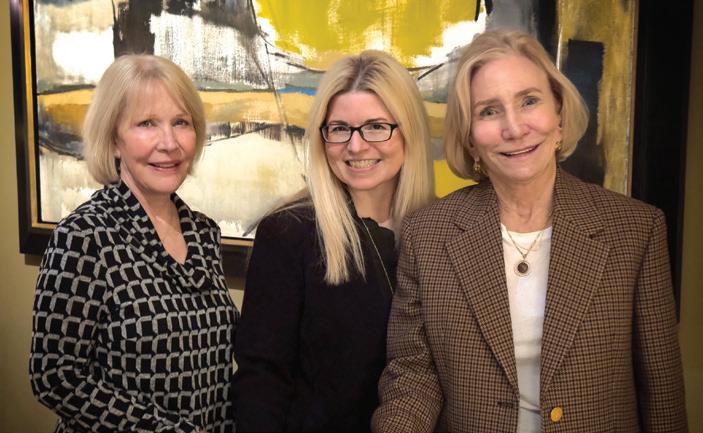
Annie Sandler is recognized by the Romanian government with Romania’s “Grand Officer of the National Order for Merit” while in Bucharest with the Joint Distribution Committee.
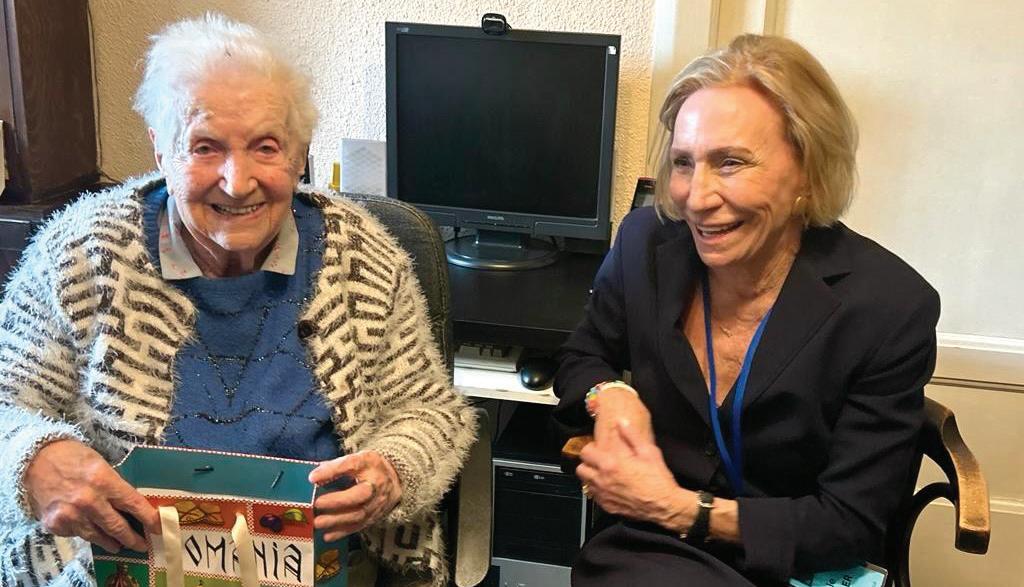
JCRC to lead the fights against misinformation and antisemitic acts.
Still, weddings, new babies, and graduations were celebrated, rabbis were ordained, awards were presented, art exhibits and festivals took place, and generous people donated their time and dollars to important causes. In short, in spite of political tensions and global unrest, it was another busy year for the world-wide Jewish community.
More than 400 Jewish leaders and professionals from 65 communities (including 10 from Tidewater) travel to Washington, D.C. to meet with members of Congress and their congressional aides to advocate for legislation that supports Israel, combats antisemitism, and helps secure Jewish communities.
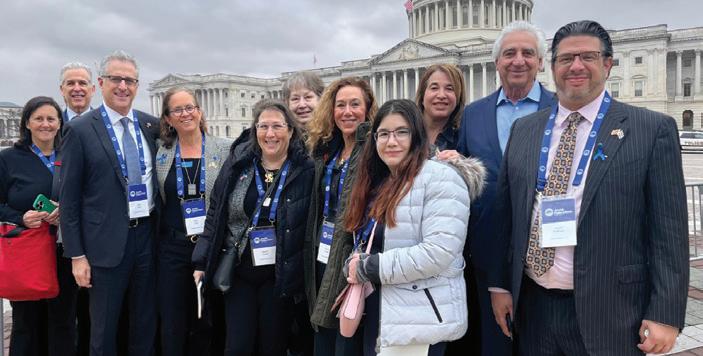
A delegation from Jewish Tidewater travels to Richmond for V irginia Jewish Advocacy Day.

Jewish Family Service and Edmarc, a children’s hospice program, celebrate 25 years of Peace by Piece, a collaboration offering an emotional safe haven for kids and teens who have experienced the loss of a loved one.
While this review of 2024 includes global, national, and statewide news, it primarily concentrates on the news of Jewish Tidewater, of which there is plenty to report – the proof of which can be seen in the very packed Jewish News issues.
Since this is only a sampling, to learn and read more, go to JewishNewsVa.org, click on the e-edition icon and peruse the year’s papers and articles of your particular interest.
Tehilla Mostofsky, Eitan Moore, Dr. Nathan Goldin, and Dr. Norman Goldin travel to Israel to volunteer.
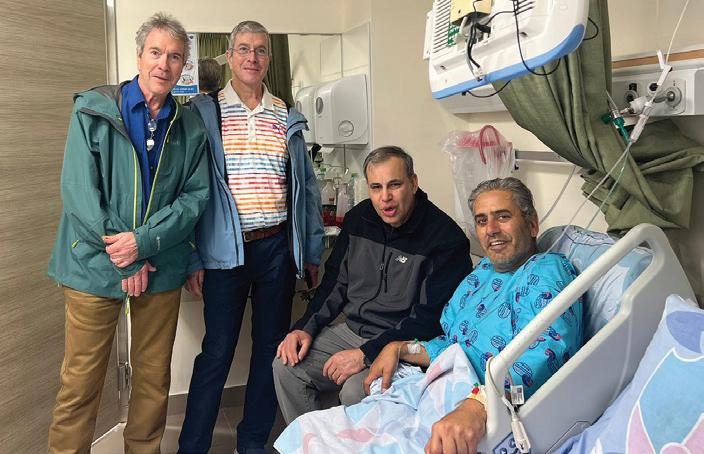
The 31st Virginia Festival of Jewish Film begins with a special event showcasing four Israeli short films honoring the victims of October 7.

Betty Ann Levin, CEO and executive vice president of the United Federation of Tidewater, announces that the Tidewater Supports Israel Emergency Fund raised $4.8 million to aid humanitarian, emergency, and wartime needs through the Jewish Agency for Israel.
Amy Weinstein rejoins Tidewater Jewish Foundation as its development strategist to help reshape the Foundation’s multigenerational endowment development plan.
The Truman Holocaust Torah is returned to its home aboard the USS Harry Truman after being safeguarded at Temple Israel while the ship underwent repairs.
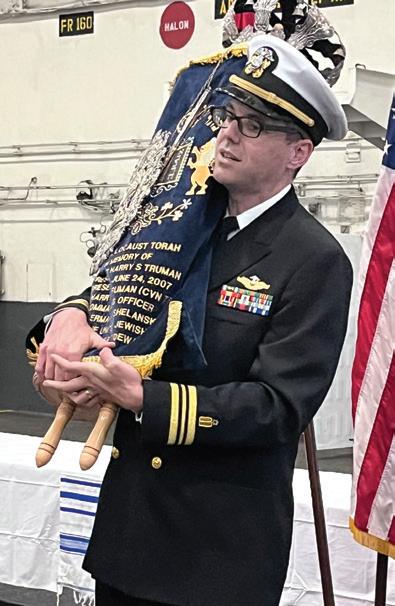
Virginia Attorney General Jason Miyares sends a letter to the University of Virginia’s Board of Visitors about concerns of a student-led referendum directly attacking Israel through the international Boycott, Divestment, and Sanctions campaign (BDS).
Jewish News unveils a new logo and updated website. Cookbook author Joan Nathan visits Tidewater as part of the Mickey Kramer Scholar-in-Residence Program.
Clay H. Barr and the Barr Foundation bequeath a collection of more than 150 Torah pointers, or yads, to The Fralin Museum of Art at The University of Virginia, marking the university’s fi rst
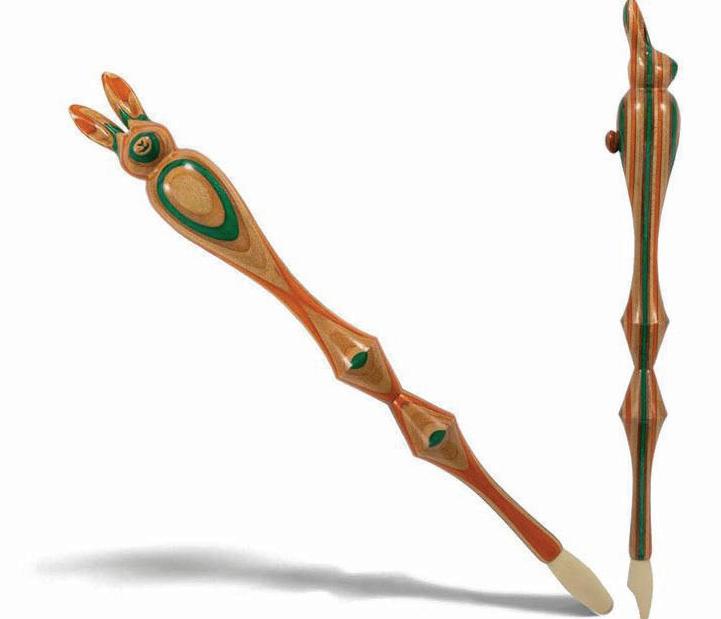
Jerry Miller receives the U.S. Naval Academy’s Distinguished Graduate Award.
Laura Gross is honored at the 60th Annual VCIC Tidewater Humanitarian Awards Dinner.
Governor Glenn Youngkin signs bipartisan hate crime legislation aimed at safeguarding Virginians from unlawful discrimination, hate crimes, and antisemitism.
Senator Tim Kaine meets with community members on the Sandler Family Campus to discuss a host of issues, including the Israel-Hamas War.
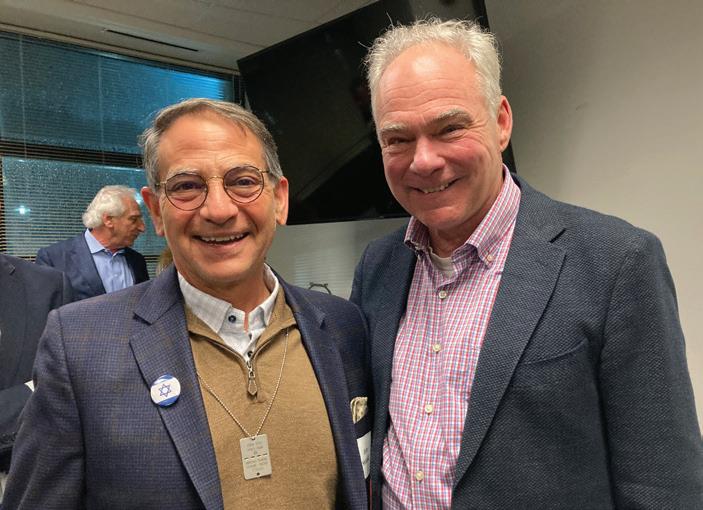
Congresswoman Jen Kiggans visits the Sandler Family Campus after her fi rst trip to Israel. She shares conversations with hostage families and details of her time spent at Kibbutz Nir Oz and the site of the Nova Music Festival.
The Virginia Beach School Board adopts a resolution in support of Jewish American Heritage Month, which takes place each May.
Congregation Beth El bids farewell to longtime executive director, Pam Gladstone.
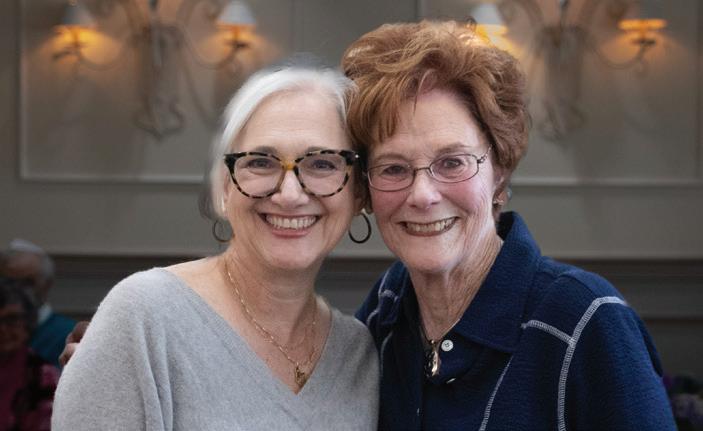
Jewish Family Service of Tidewater honors Ron Kaufmann and Jody Laibstain for their service.
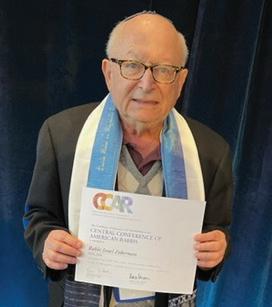
Rabbi Israel Zoberman celebrates 50 years in the rabbinate with numerous local, state, and federal recognitions.
Virginia Congressman Rob Wittman visits the Sandler Family Campus, addressing questions about antisemitism, protests on college campuses, and fentanyl coming from China and Mexico.
Sandler Family Campus celebrates its 20th anniversary.

Ukrainian native Jenny Kosatykh is awarded the Stein Family Scholarship after arriving in the United States nine months earlier.
The Honorable Scott Joseph Flax is sworn in as a judge of the Second Judicial Court. He is the third Jewish circuit court judge to be appointed in Virginia Beach.
Jewish American Heritage Month is celebrated at the White House. Tidewater’s Jody Wagner is among those attending who is invited by President and Dr. Biden.
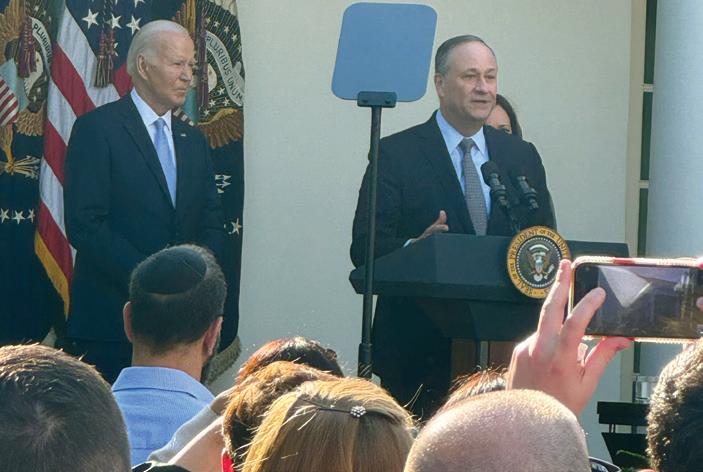
Todd and Robin Copeland’s Sam Brooke Memorial Medical IMPACT! Scholarship Fund is announced to benefit Israel Defense Forces soldiers who are leaving military service and wish to attend medical school.
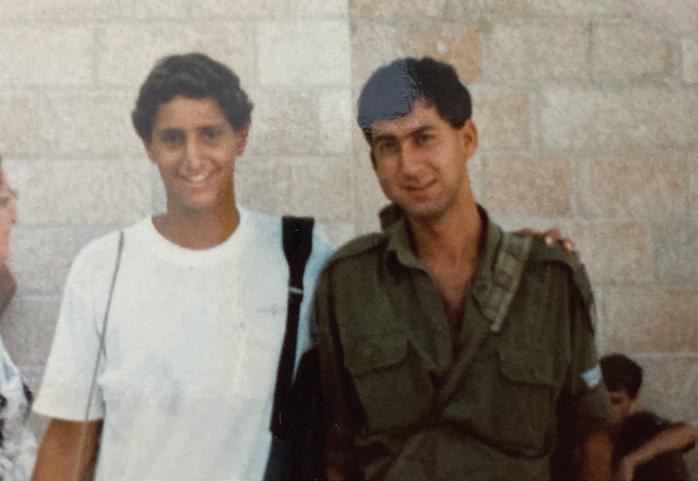
VADM Herman Shelanski, USN (ret) joins nearly 100 retired U.S. military leaders in an open letter in support of Israel.
Two students visit the U.S. for one month as part of the exchange between Eastern Virginia Medical School and Azrieli Faculty of Medicine in Israel. This exchange had been on hold since COVID.
Leyla Sandler visits Israel as part of Healing Ink, an organization offering tattoos to those who have suffered harm, including victims of October 7, 2023.
The Holocaust Commission and Jewish Community Relations Council host the 16th Biennial Educators Conference which aims to provide educators with the tools and resources to combat hatred and foster understanding and empathetic classrooms.
UJFT’s Women’s Division holds its fi rst “Girls Night Out” to encourage women to build community through a better understanding of the work of the Women’s Division and the Federation.

Shinshinim Emily Patyuk and Danielle Hartman join the Tidewater Jewish community.
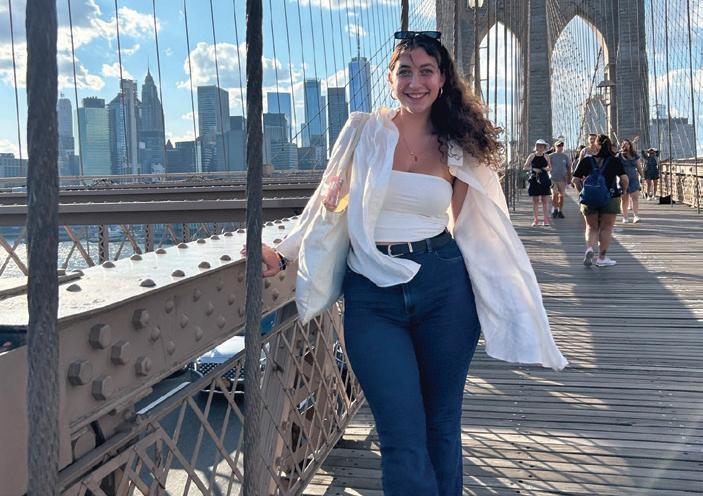
Strelitz International Academy receives full accreditation from the Virginia Association of Independent Schools.
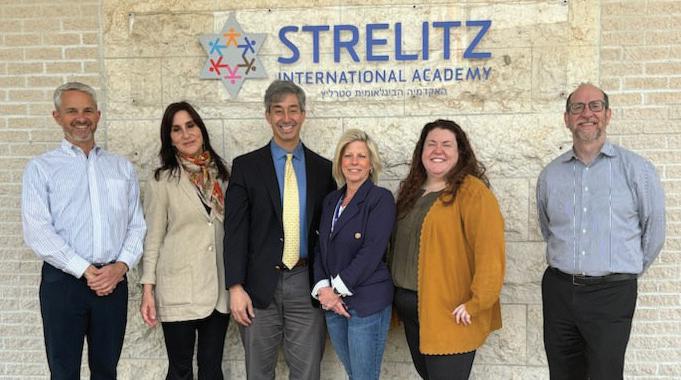
The 36th Annual Strelitz International Golf Tournament is a swinging success, raising more than $150,000.

Full-scale exercises take place at Ohef Sholom Temple to prepare for an effective response during a critical incident. UJFT, Ohef Sholom Temple, and the Secure Community Network participate in the simulation.
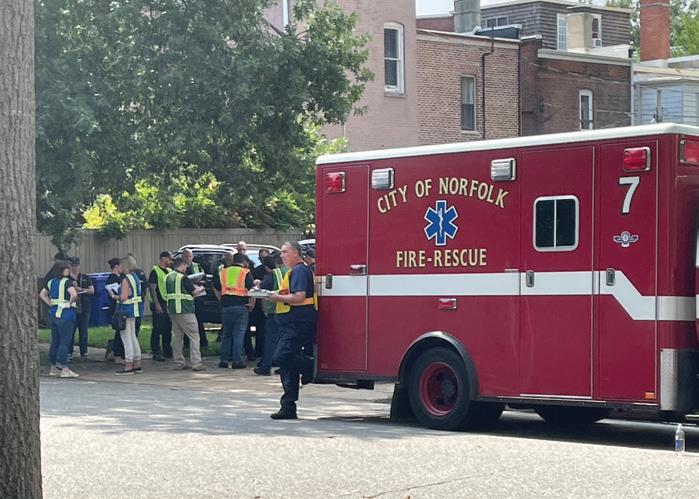
Seven members of Team Virginia Beach travel to Houston, Texas to compete in the Maccabi Games.
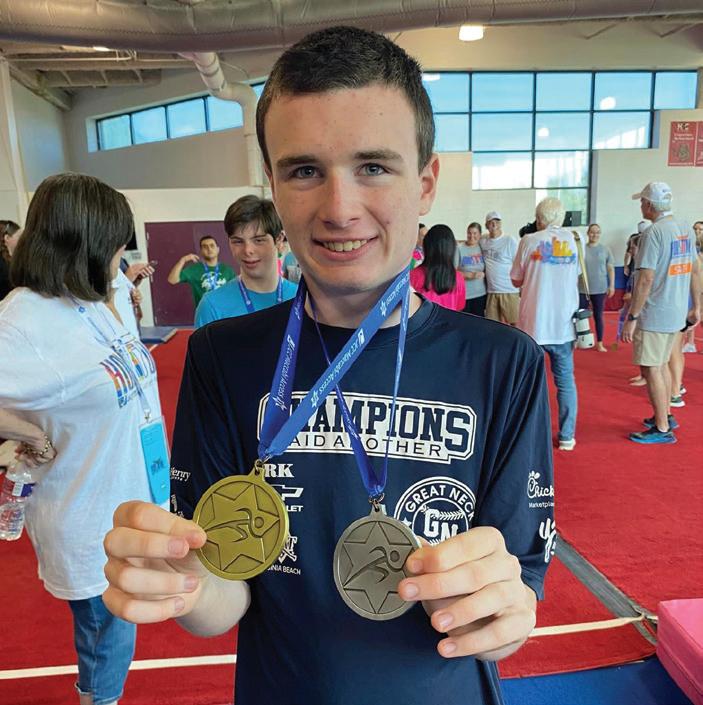
A Tidewater Jewish Foundation grant enables Strelitz International Academy to purchase 50 enhanced emergency first aid and Stop the Bleed kits, enhancing the school’s preparedness and response capabilities.
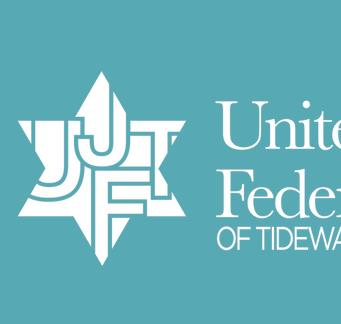
Beth Sholom Village and Westminster Canterbury collaborate to open the Dozoretz Hospice House of Hampton Roads, the fi rst freestanding inpatient hospice house in Hampton Roads.
Aryeh Litt is named the 2024 Feldman Family Medical and Health Professions Scholarship recipient.

Nearly 150 people from throughout Hampton Roads attend Jewish Family Service of Tidewater’s first Guardianship and Conservatorship Summit.
Governor Glenn Youngkin orders all flags to be flown at half-staff in memory of murdered American Israeli hostage, Hersh Goldberg-Polin, who had family roots in Virginia.
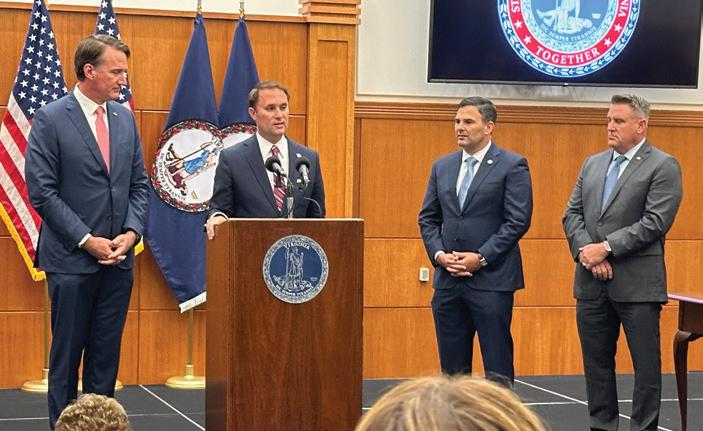
Tree of Life documentary is screened at the Sandler Family Campus.
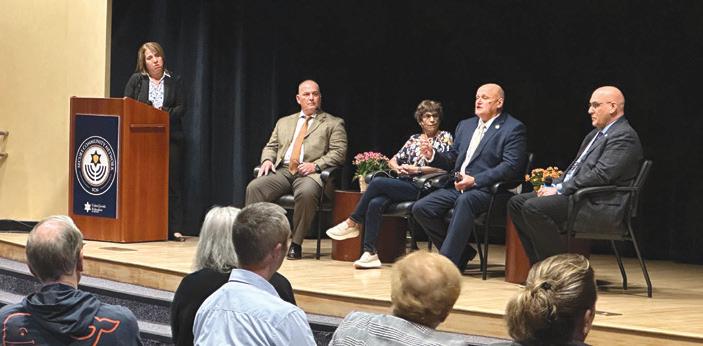
Tidewater’s Jewish community commemorates the fi rst anniversary of the October 7 Hamas attacks. Local and state dignitaries participate in the event, including Governor Glenn Youngkin, who declares October 7 as an official state day of remembrance for victims of the horrific attacks by Hamas on Israel.
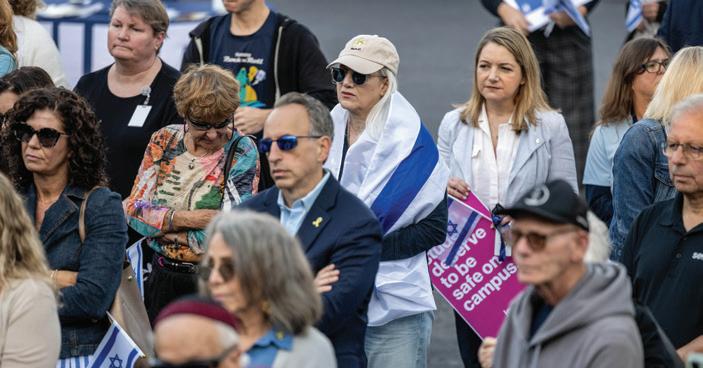
The 2nd Annual Strelitz Fall Festival is held at the Sandler Family Campus. The Strelitz International Academy event is a day of food, activities, and even live animals.
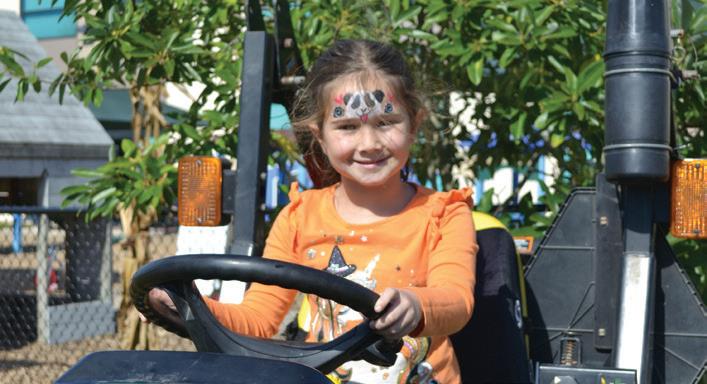
Be A Reader (BeAR) Literacy Program celebrates its 25th year of continuing to ignite a love of reading with young students of Norfolk and Virginia Beach Title I schools.
Donald Trump wins the 2024 election. Polls indicate Jews, who comprise approximately two percent of the U.S. population, supported Kamala Harris by somewhere between 63% and 71%, but Donald Trump won a higher percentage of Jews than he did in 2020.

Cantor Jennifer Bern-Vogel travels to Germany to present the key from her mother’s synagogue, which was destroyed on Kristallnacht, to the History Museum in Bielefeld.
The first Community Impact Day: Creating Kindness and Jewish Camp Curiosity, takes place on the Sandler Family Campus. The Mitzvah Mall shows the next generation of philanthropists and leaders the impact that even a small donation can make.
UJFT’s 2025 Women’s Philanthropy Lion Tikva Chai Lunch hosts Israeli chef, Naama Sheffi.
Aviva Pembroke, a retirement community managed by Beth Sholom opens and its first residents settle in.
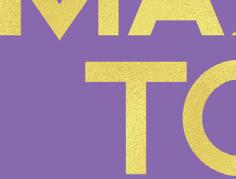
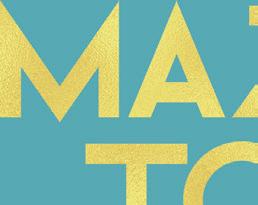

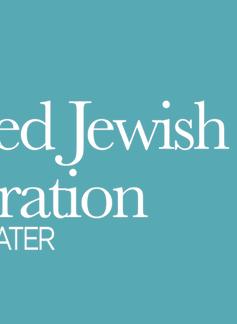


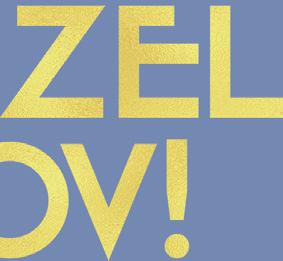





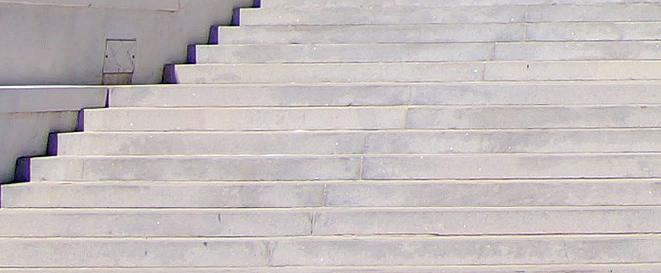



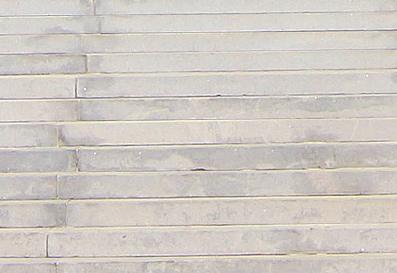


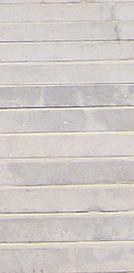









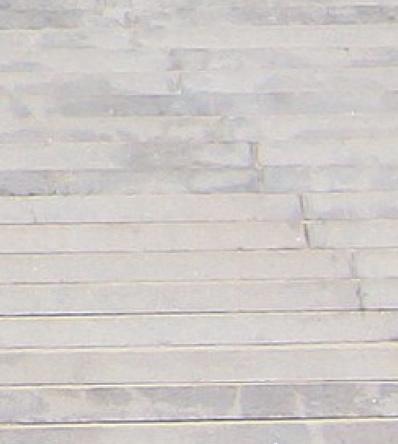


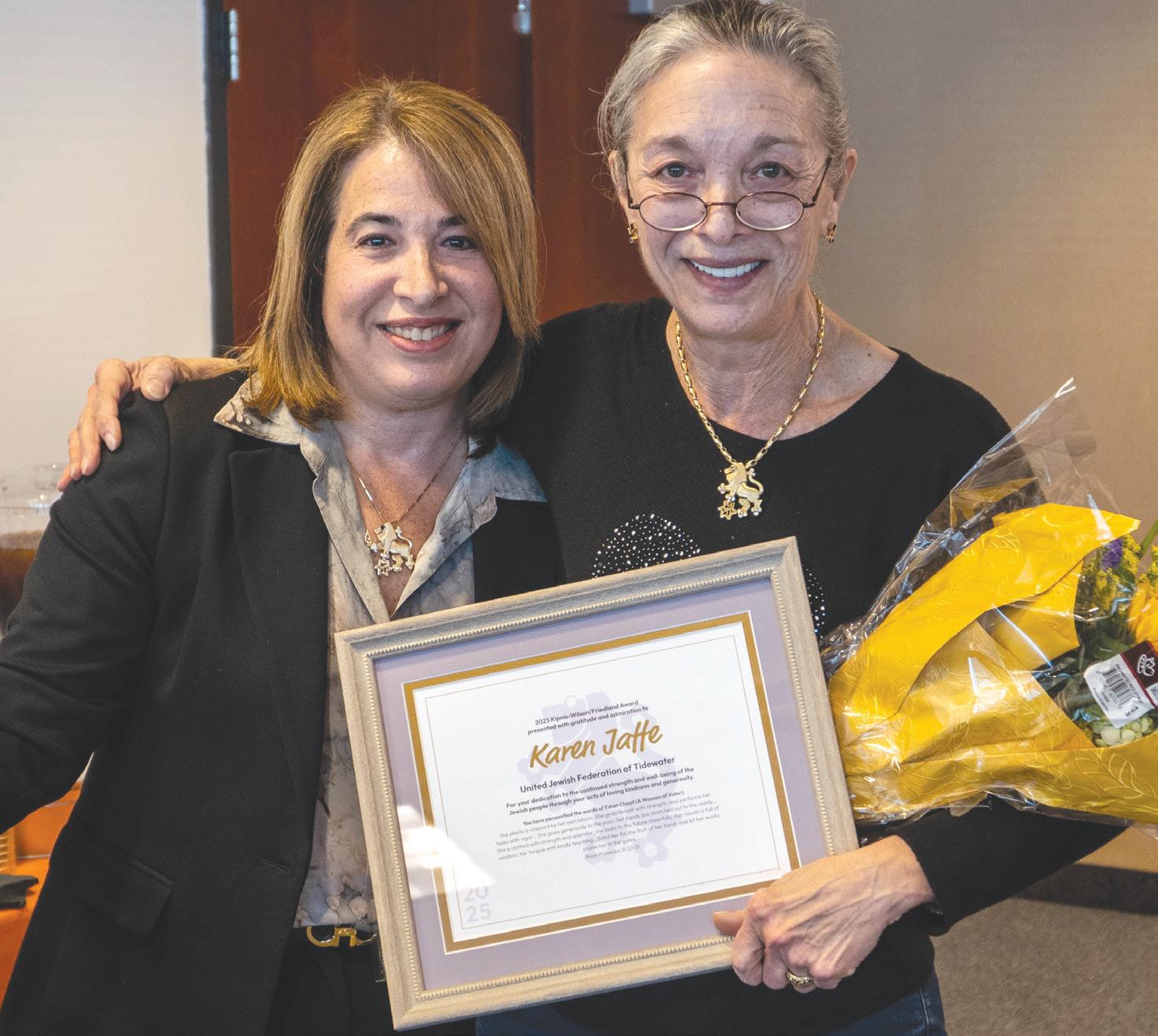
Anyone who’s worked alongside Karen Jaffe on committee or in community leadership will confirm: Karen Jaffe is special. A muchadmired leader in the Tidewater Jewish community, Jaffe has been a role model for her family, friends, and an entire generation of emerging women leaders.
Leading by example, Jaffe inspires peers and young leaders alike to engage in meaningful service, philanthropy, and tikkun olam. Her many years of service on community boards and committees reflects a lifetime dedicated to strengthening and enhancing Jewish life in Tidewater and around world.
Jaffe is a champion of women’s philanthropy and empowerment. And she carries an unwavering love for Israel and the Jewish People – believing with her whole heart in the collective responsibility for world Jewry. Perhaps nothing illustrates this better than the fulfillment of her late parents’ vision
to build a Jewish Family Service similar to the one in Jewish Tidewater in an at-risk community in Eastern Europe. Together with her brother, Nathan Jaffe, they brought the Jaffe Family JFS in Budapest, Hungary from a vision to a reality. And it was likely no coincidence that much of this took place during the time when Jaffe was the (national) chair of JDC –Europe. She then led Tidewater’s very first community mission to Budapest and Prague.
Through her every action, Jaffe embodies the spirit of the Lion of Judah, using her “join me” spirit to influence others and bring good in the world.
When asked to reflect on what being a Lion of Judah has meant to her, Jaffe had the following to say:
“I’ve always tried to live a values-driven life, and my values are Jewish values. My late-parents, Lee and Bernard, were wonderful role models – inspiring me to
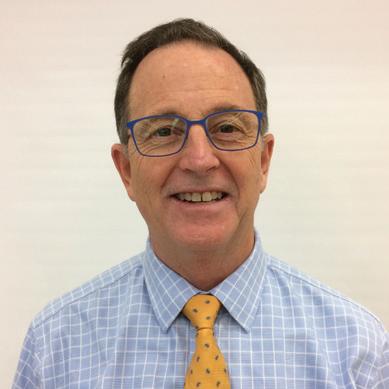
MEET: Ira M. Steingold, Esq.

“Our experience with Payday Payroll has not just been positive but fabulous! They are true experts at what they do. Whenever we have an ‘internal hiccup’ even if not directly related to payroll, but in record keeping or data collection we call them and they always help us out. They find a solution for everything.”
Our client relationships are anything but transactional. We are long-term partners, dedicated to the success of our clients, and most importantly, their people.
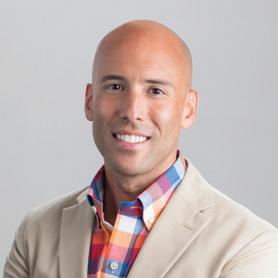
meaningful service, philanthropy, and tikkun olam. Looking back at the boards and committees on which I’ve served, I see a lifetime of working with others to build, strengthen, and enhance Jewish life at home and around world.
“As a proud Lion, I constantly try to be a force-multiplier for bringing good into the world.”
Jaffe will receive the Kipness/WilsonFriedland award. Selected by their local federations, KWF award winners embody the values of the Lion of Judah. Winners of this prestigious, nationally-recognized award are leaders in their communities
— women whose body of work has left and continues to leave an enormous imprint for generations to come; women who’ve inspired and motivated others to take an active role in philanthropy and Jewish community involvement.
Jaffe’s award will be presented in January at the International Lion of Judah Conference.
The Tidewater Jewish community is incredibly pleased to wish Karen Jaffe a hearty Mazel Tov on this much deserved award.
Amy Zelenka is United Jewish Federation of Tidewater’s chief development officer.
Ron Kampeas (JTA) — WASHINGTON — Adam Schiff, the freshman Democratic senator from California, was sworn into office on a 1490 edition of Maimonides’ Mishneh Torah, one of the most revered and prominent codes of Jewish law.
Schiff, in a statement ahead of his swearing in on Monday, Dec. 9, said the edition, published in the duchy of Milan, now in northern Italy, was “a monumental legal code and one of the most organized, comprehensive, and influential works of Jewish law.”
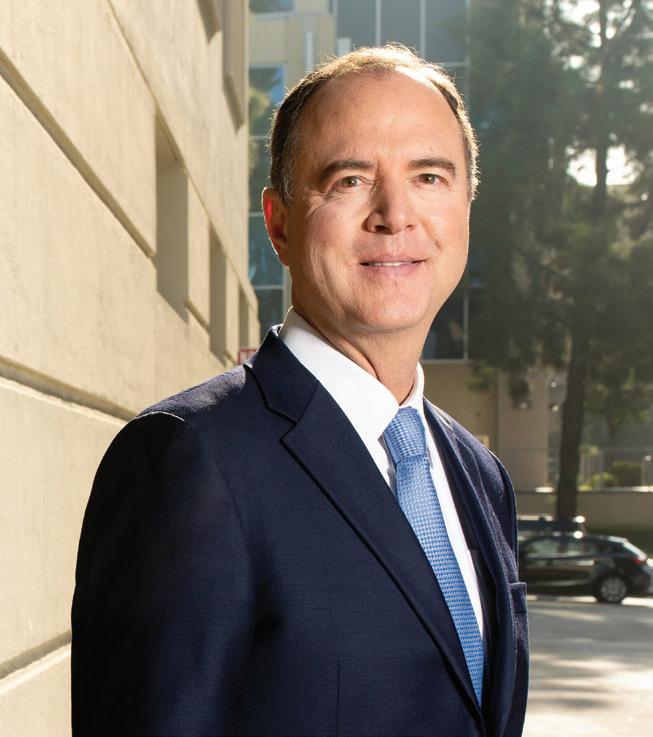
The edition was published by Gershom ben Mosheh ish Sontsino, a scion of a pioneering Jewish printing family known as Soncino. A publishing house in the family’s name is still active.
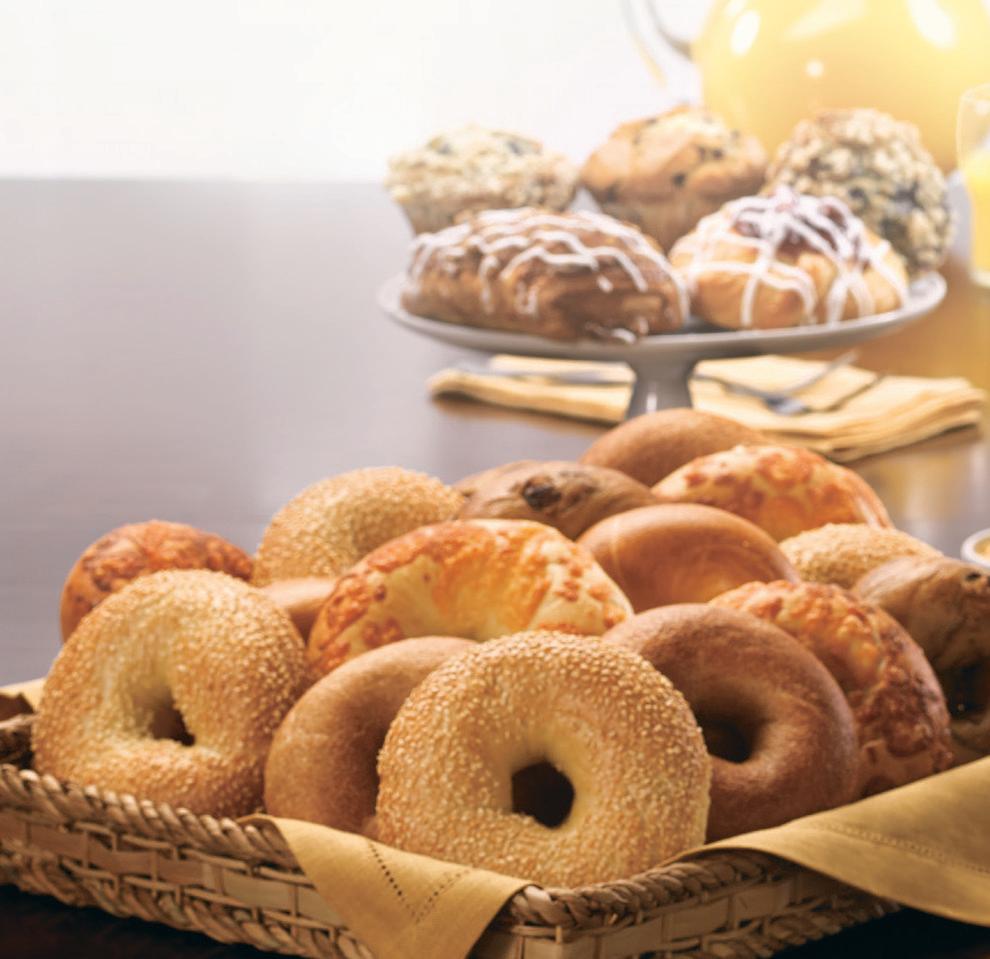
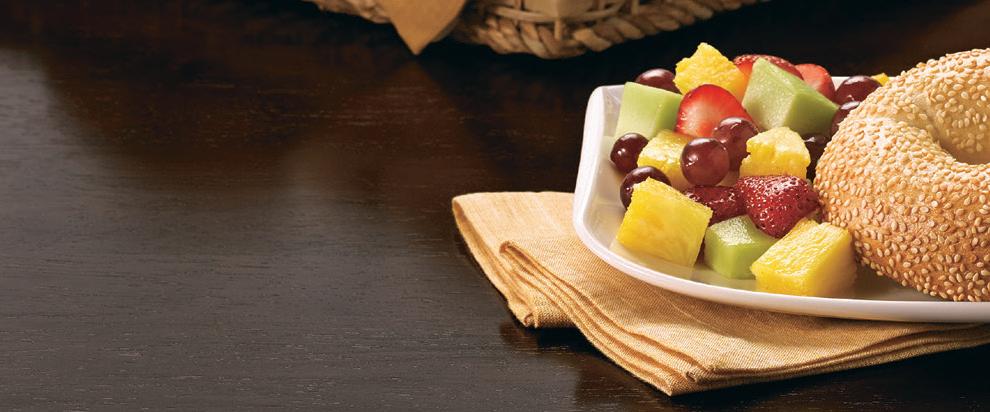
A spokeswoman for Schiff, until this week a U.S. Representative and a former federal prosecutor, says he chose the volume, held by the Library of Congress, in part because of his concerns about the state of the rule of law as President-elect Donald Trump returns to office.
Schiff led one of Trump’s impeachments in the president’s first term and co-chaired the congressional investigation into the deadly Jan. 6, 2021 U.S. Capitol riot, which was spurred by Trump’s false claims he won that election. Trump, who has promised “retribution” against his perceived enemies, said this month Schiff should be jailed.
The spokeswoman says that Schiff was also attracted to the volume because of his intellectual curiosity. “It’s
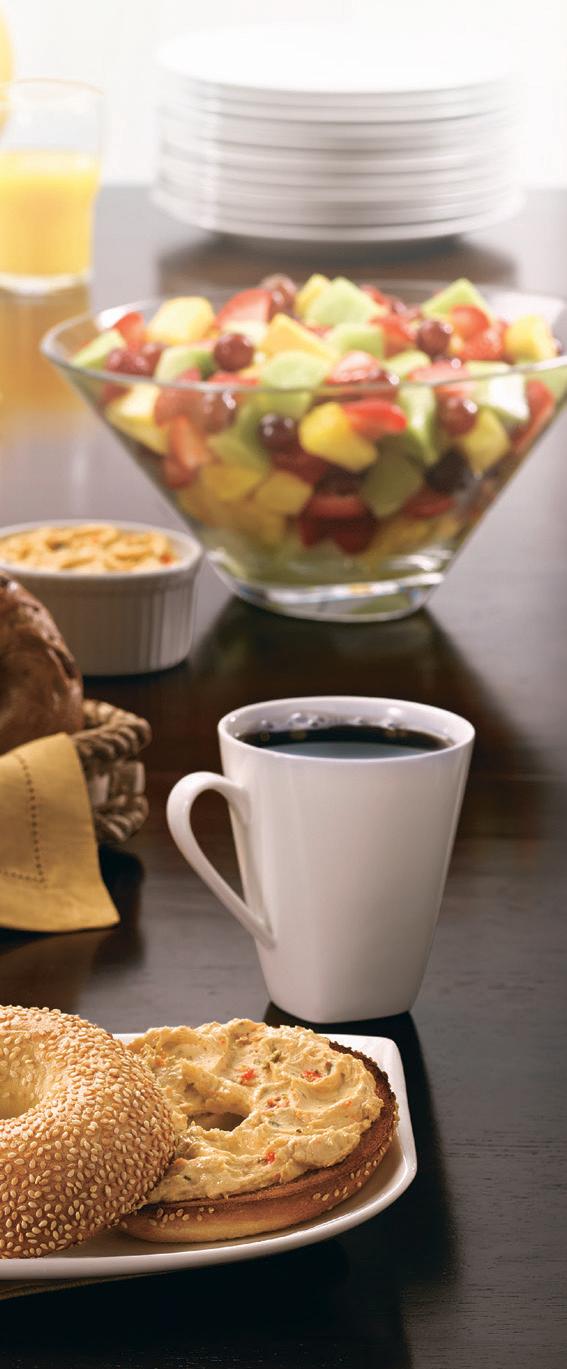
simply his nerdy interest in how old this volume is and how comprehensive it is,” she says.
Maimonides, also known as Rambam and considered one of history’s preeminent Jewish scholars, wrote the Mishnah Torah in the 12th century as an all-inclusive guide to the system of Jewish law. Written in Hebrew and divided into 14 volumes, it is a fi xture of Jewish houses of study and other educational institutions.
Schiff is not the only Jewish elected official who in recent years chose to be sworn into office on volumes that reflect why they got into politics. Pennsylvania Gov. Josh Shapiro, a Democrat, in 2023 was sworn in on a stack of three Hebrew Bibles, including the one that was on the bimah when a gunman massacred 11 Jewish worshipers in a Pittsburgh synagogue in 2018.
Georgia Sen. Jon Ossoff, a Democrat, in 2021 was sworn in on a book of Hebrew scripture once owned by an Atlanta rabbi whose synagogue building was bombed by white supremacists in 1958.



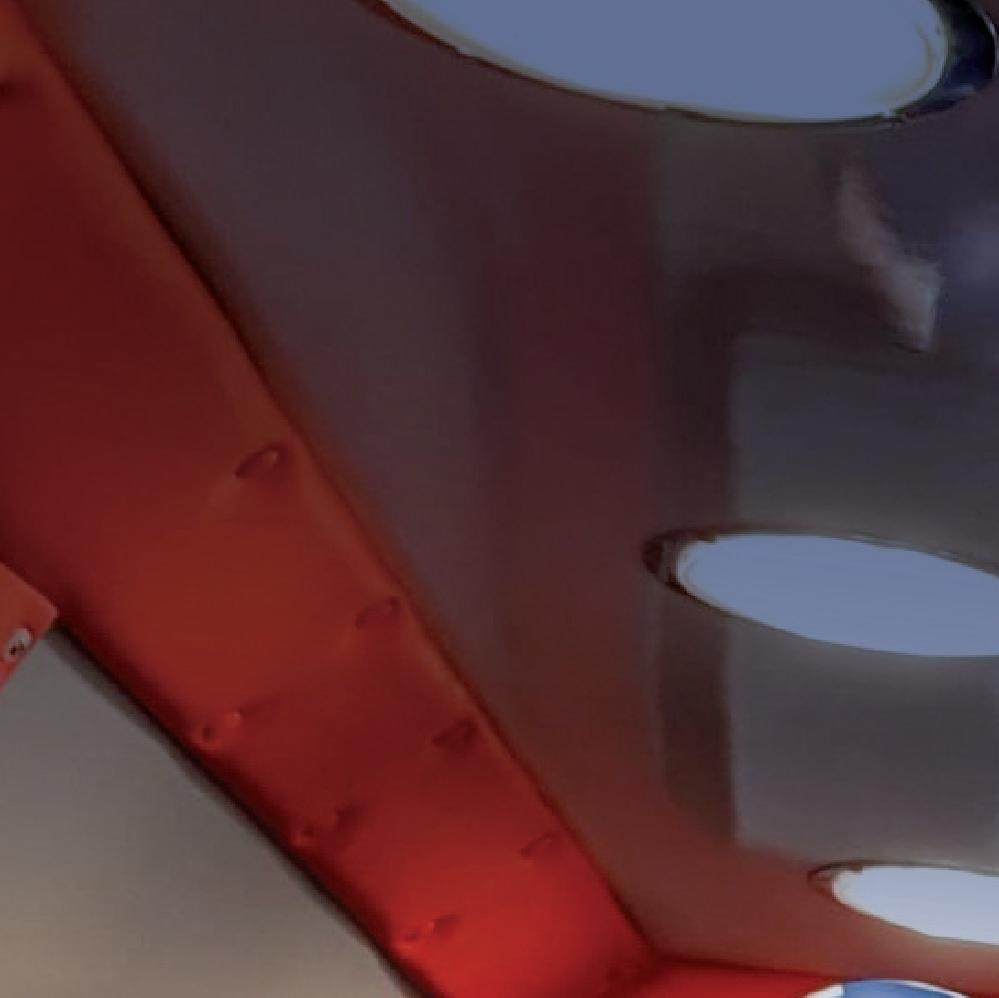

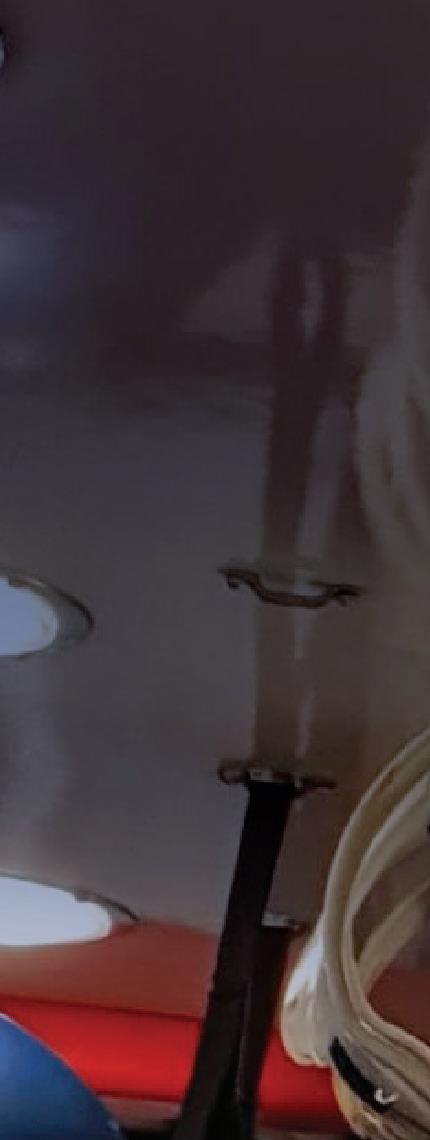




Like all Jewish holidays, Hanukkah moves around on our daily calendar, though it stays the same on the Jewish calendar, beginning on the evening of 24 Kislev.
Sometimes, that movement sparks additional holiday fun. Remember in 2013 when Hanukkah fell on Thanksgiving, creating Thanksgivukkah? That convergence shouldn’t happen again until 2070.
The lighting of this year’s first candle will take place on Dec. 25 at nightfall, which means the holiday begins as Christmas Day is winding down, and will extend into 2025, with the eighth candle on Jan. 1. Always a festive holiday, it should be double-so this year!
The holiday’s almost tardy appearance this year has resulted in some Hanukkah celebrations already over, but plenty are still to come. A listing of area events can be found on page 31. And, a look at Frozen Flames, one celebration that took place earlier this month, is on page 24.
One of the many fun aspects of the Festival of Lights is playing with and admiring dreidels, those spinning tops integral to a gambling game traditionally played on Hanukkah. Fashioned from just about every material imaginable, many people have multiple dreidels. Wendy Auerbach, Ilene Goldman, and Jamie Alpern share their collections beginning on the next page.
While most associate the lights of Hanukkah with the nine candles of a hanukkiah, that’s not how the observation began. Rabbi Michael Panitz writes about the original oil lamps and how the holiday’s ritual of lights has evolved. See a couple from his and Mark Solberg’s collection on page 30.
This Chanukah, there are many ways to support Israel and its people, but none is more transformative than a gift to Magen David Adom, Israel’s emergency medical system. Your gift to MDA isn’t just changing lives — it’s literally saving them — providing critical care and hospital transport for everyone from victims of heart attacks to casualties of rocket attacks. Join the effort at MagenDavidAdom.org or call 866.632.2763.
Hanukkah books for children, a cool funnel cake recipe, how to bring Hanukkah to classrooms, a unique gift idea, and more comprise the many articles in this section. And, of course, if you’re searching where to purchase a gift, where to dine, or where to make an end-of-year donation, please check out the advertisers within these pages.
All of us at Jewish News wish you a Hanukkah filled with light – from love, laughter, and blessings – and a happy and healthy entrance into 2025!
Chag Hannukah Sameach,
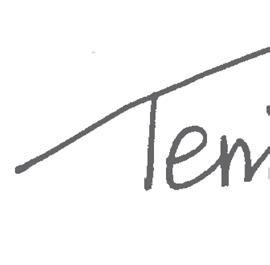
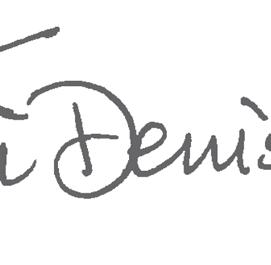
Terri Denison Editor

“Dreidel, dreidel, dreidel, I made it out of clay…” (and
Stephanie Peck and Terri Denison
The center piece of a Jewish gambling game, dreidels are almost as important to Hanukkah as Hanukkiahs and latkes. Each of the four sides of the spinning top contain a specific letter: Nun, Gimel, Hei, Shin (or Po if in Israel). The letters represent the phrase: A great
Twenty-four-year-old Jamie Alperin, a Tidewater native currently studying for her Psy. D. in clinical psychology, has amassed a dreidel collection beyond her years.
Started by her maternal grandfather when she was five years old, Alperin’s collection stands at 32 dreidels, often receiving more than one per year from her Florida-based grandparent.
James Jacobson decided it would be fun to start collections for both of his granddaughters when they were young. For older sister, Jenna Alperin, he gifted menorahs.
miracle happened there (or ‘here’, if in Israel) and dictate how the game is played, with players winning or losing, depending on how the top lands after its spin.
Found in all sizes and colors, dreidels are made from the most mundane of materials to the most glamorous – from plastic to jewels – and are

Jamie’s dreidels have been purchased from Judaica stores and other shops where Jacobson found the spinning tops. A few in her collection are made from clay, “painted and man-made by my child hands,” Alperin says.

Her favorite? A menorah-dreidel made of glass. “It makes me feel closer to my sister.”
designed to either be played with or showcased as art. With so many possibilities, there’s no wonder that collections of this classic Hanukkah toy abound. Here, Wendy Auerbach, Ilene Goldman, and Jamie Alpern share a bit about their collections.
When Ilene Goldman married her husband, Dean, her parents gave the newlyweds a Hanukkah menorah as a wedding present. Ever since, Goldman has received dreidels and menorahs as gifts, regardless of the occasion. “I guess I’m a hard person to shop for!” she laughs.
Each Hanukkah season, Goldman displays the dreidels and menorahs on her dining room table and makes a big spread. In the collection are roughly 10 dreidels and eight menorahs. Many of these works are not run-of-the-mill Judaica; instead, these high-end selections are made from crystal or other artistic creations. She favors two cut-glass crystal dreidels that she purchased for herself.
When her children were young students at Norfolk Collegiate School, Goldman was the mom who came in for Hanukkah. She purchased small, easy-to-spin, wooden dreidels on Amazon and taught the classes how to play dreidel games. Goldman also brought gelt candy and showed these youngsters how to bet. At the end of the game, this doctor mom threw away the gelt that had been handled by children with colds and other winter crud, and instead sent each student home with a bag of untouched chocolate.
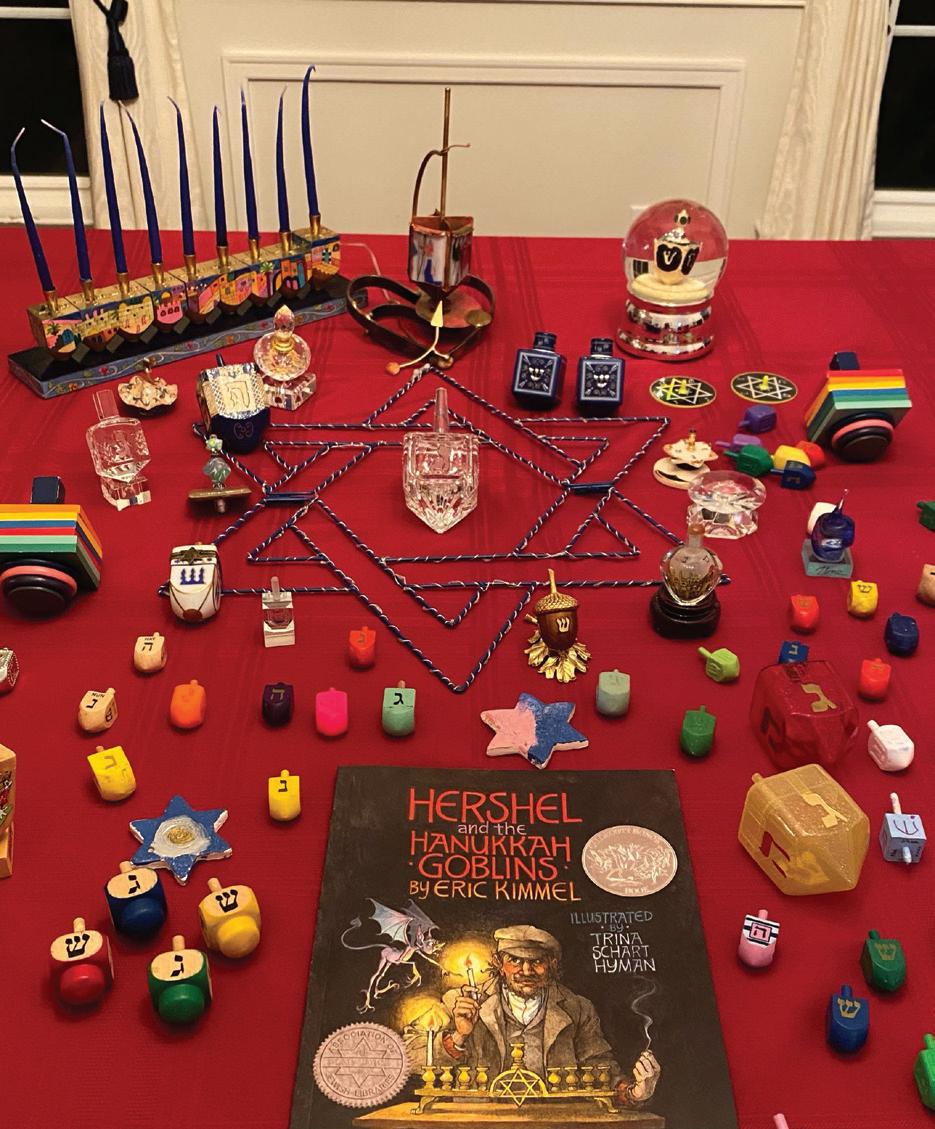

“It started in kindergarten, but the kids wanted me to come through fifth grade. I read the same Hanukkah book to the class for six years in a row!”
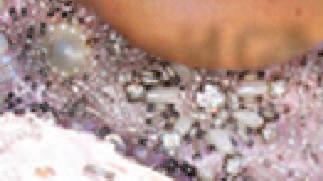



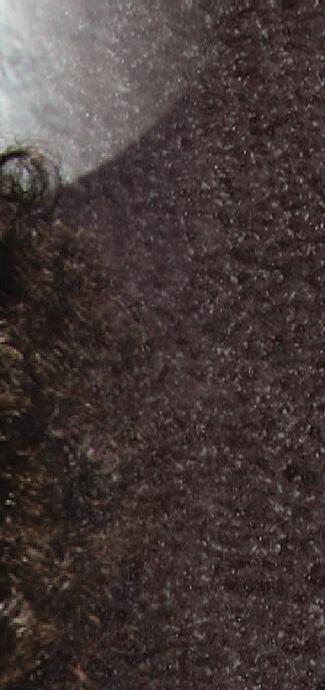
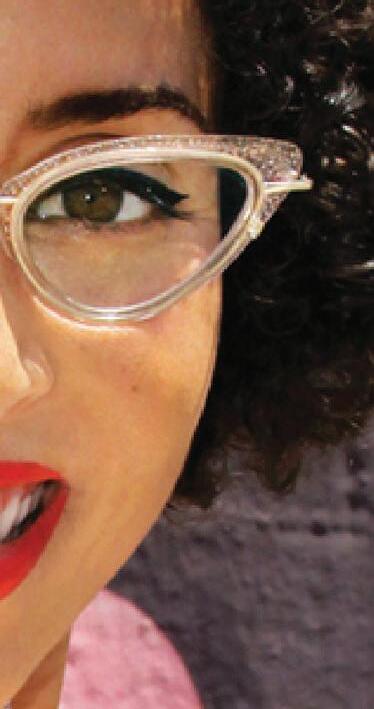
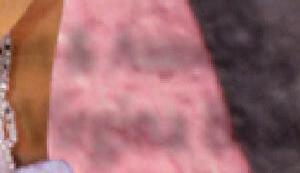


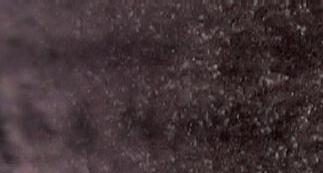
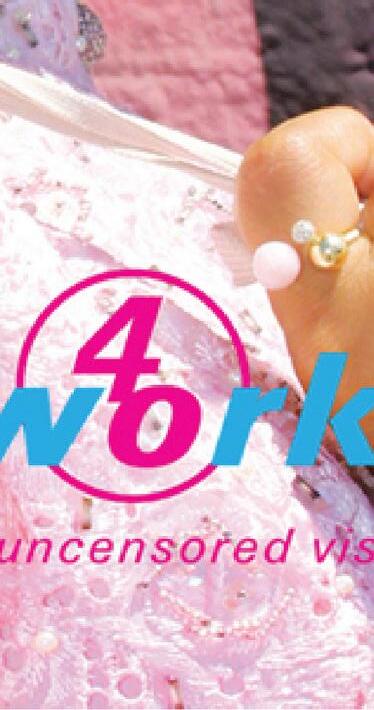

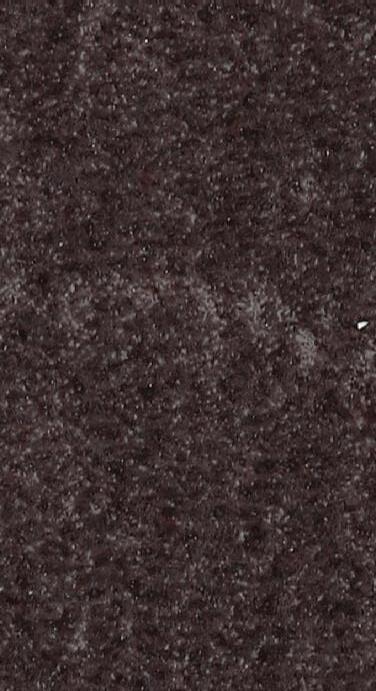

Wendy Auerbach’s dreidel collection, a Maccabean army of 78 spinning tops, started by chance. “I love Hanukkah, and these portable, functional works of art make them fascinating to me. I like that something can be interpreted in so many ways.”

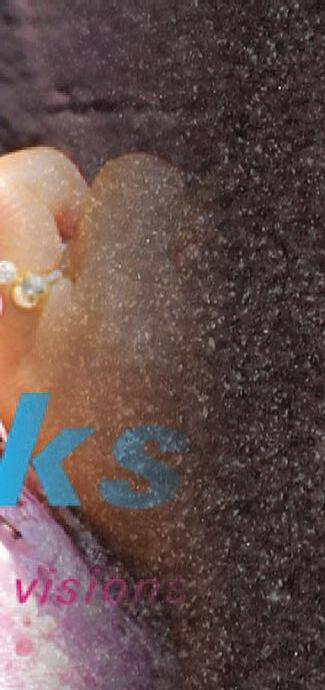






Auerbach’s collection includes dreidels made from various materials, including felt and other fibers, as well as glass and metal. “A few are from my mother, because she knew I was collecting them.”

While most dreidels in Auerbach’s cabinet have been purchased, she has crafted some herself, including an oversized, paper mâché object that she painted, and a dreidel she crocheted from old t-shirts. She considers several standouts in the collection, dreidels made from unusual materials or different shapes, but she is partial to those made from common objects, such as Legos, wood, paper, and nuts and bolts. “I even have one made from leather, which is from the Jewish Museum in New York.”
Auerbach says that most of her dreidels spin, and they all contain the four letters on the sides. Several dreidels in this vast collection come from Israel, where one of the letters differs. Instead of the common “nun, gimmel, hei, shin,” (a great miracle happened there), a dreidel from Israel ends with a “pe” (a great miracle happened here).
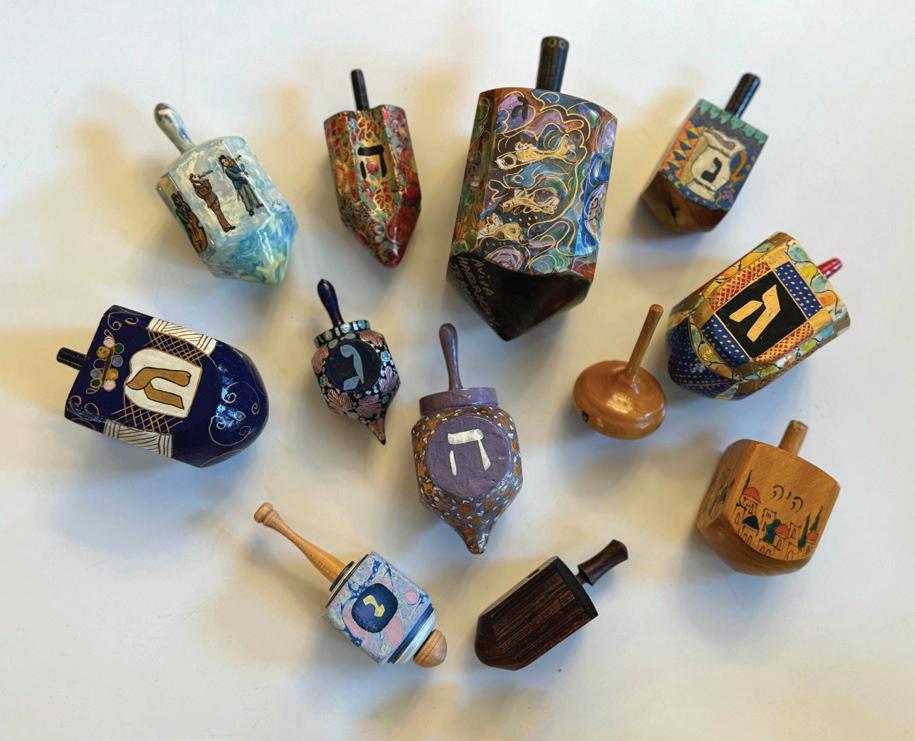























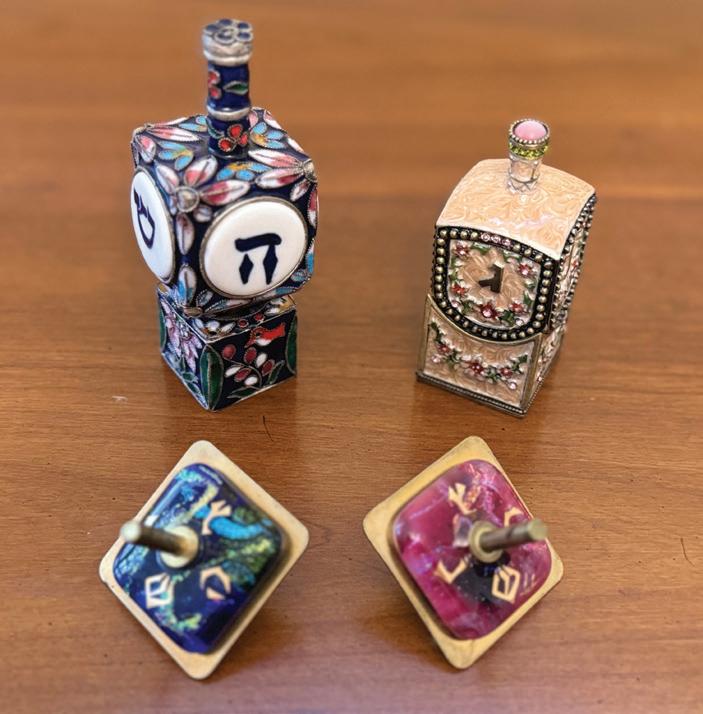


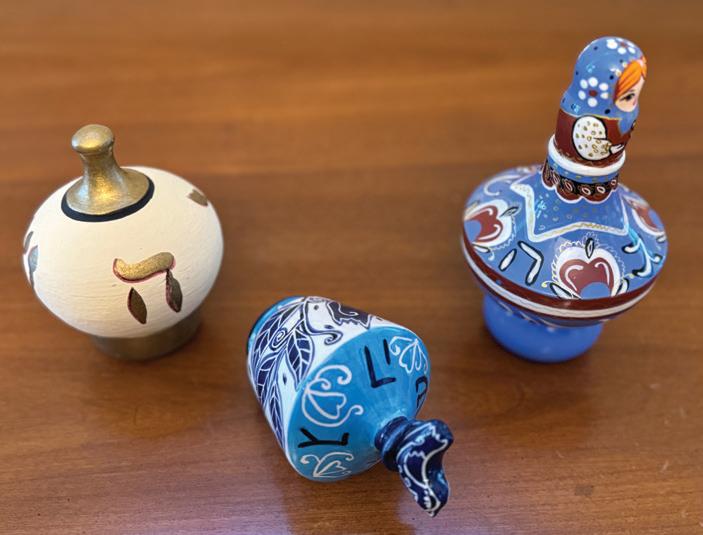

Jackie Hajdenberg
(New York Jewish Week) — As drought conditions continue to put New York City at an elevated risk of fire, Rabbi Shimon Hecht needs a Hanukkah miracle.
Hecht, who leads Chabad of Park Slope, oversees the annual illumination of a massive, 32-foot-tall menorah at Brooklyn’s Grand Army Plaza, just outside the main entrance to Prospect Park. Since 1984, the kerosene lantern menorah has been lit each of the eight nights of Hanukkah, which this year begins on the evening of Dec. 25.
That four-decade tradition could now be snuffed out. A drought watch escalated into a drought warning in late November, putting public menorah lightings at risk of being canceled. On Nov. 20, the mayor’s office, plus the city’s fire and parks departments, announced the cancellation of already-issued permits for fireworks displays and open flames across the entire city indefinitely. The three offices also announced the suspension of new permits for open flames — meaning that,
in addition to New Year’s Eve fireworks, public menorah lightings like Hecht’s may be canceled.
The FDNY will review previously issued permits for activities in city streets or over water on a “case-by-case basis” to determine alternatives, the mayor’s office said in the Nov. 20 email announcing the change.
“While the drought guidelines are in effect, no displays with open flames, including menorahs, will be allowed in parks,” a representative from the NYC Parks Department told the New York Jewish Week. “If organizers had previously been issued a permit for open flame displays, we are asking them to develop a contingency plan (for example replacing the flame with electric lights).”
Hecht is still hoping that the city won’t let the light go out.
Many menorahs put up by Chabad houses around the city use light bulbs rather than real flames — such as those of Chabad at Sutton Place and Chabad of Harlem — and will not be impacted by fire restrictions. But the Park Slope






menorah — which was known, until 2016 at least, as “the world’s largest menorah” — uses flames ensconced in old-fashioned kerosene lanterns. (Chabad of the West Village uses a similar kerosene lantern and flame setup for their menorah.)
“We don’t believe that our menorah poses any type of fire risk whatsoever,” Hecht says. “The fire itself is not just an open flame. It’s in a kerosene lantern, it’s protected. And as well as it’s not directly in the park, it’s outside the park. We’ve been doing it for the last 40 years, thank God, without any incidents and concerns.”
Chabad of Park Slope’s menorah
lightings typically draw a few hundred people each night over the course of the eight-night holiday and the celebrations often include live music, hot chocolate, latkes, and more.
The drought warning is still in effect. Despite the small amount of rain earlier this month, New York City’s seven reservoirs are averaging far below the normal 82% fill mark for this time of year.
As of press time, at least two other events, both on New Year’s Eve, have been canceled or reimagined for this year due to the drought.
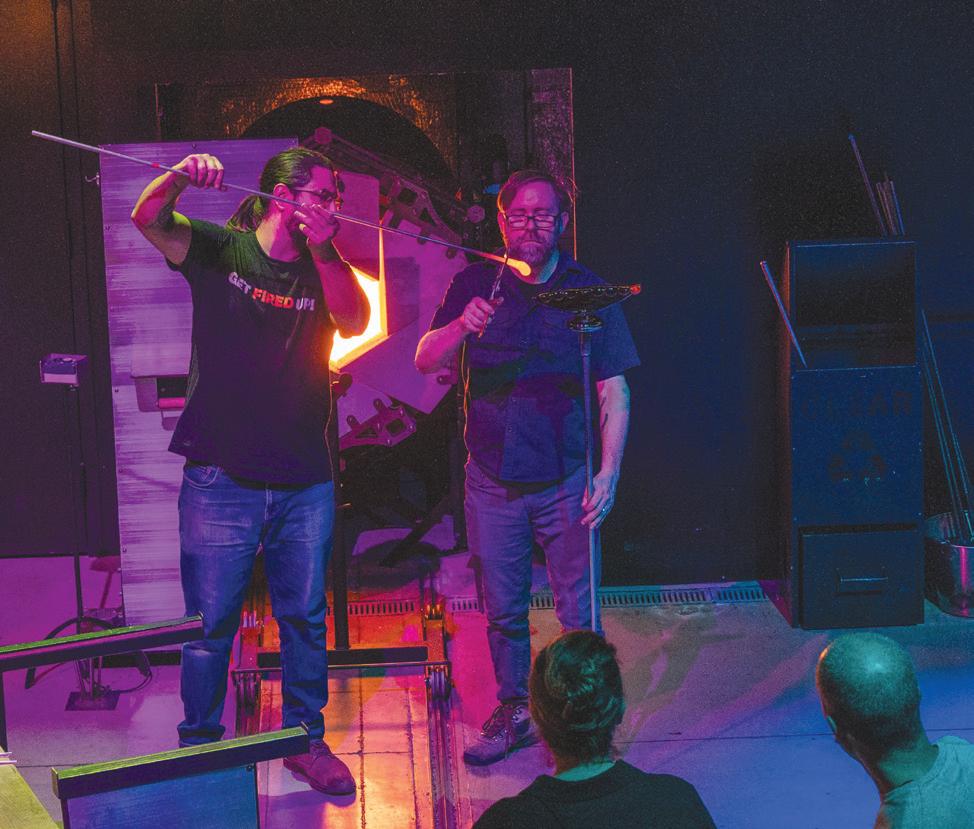
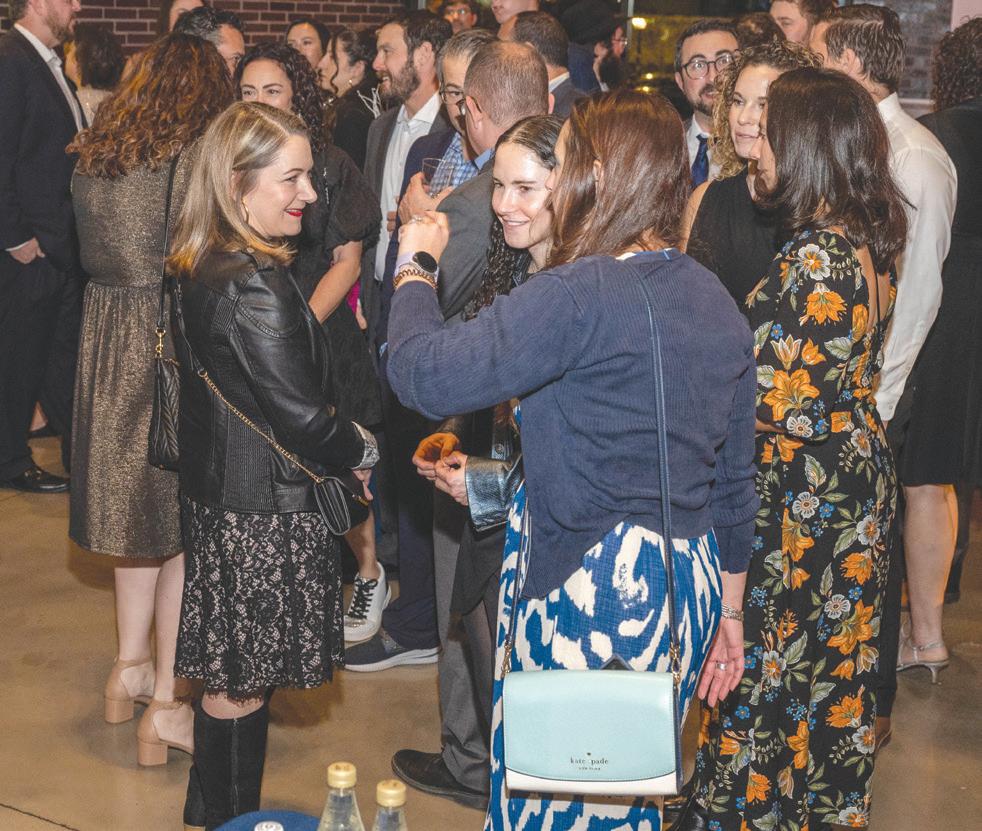

Elana McGovern
More than 150 members of the 21-and-over Tidewater Jewish community and beyond gathered for Frozen Flames, a celebration of heritage, community, and inspiration on Saturday, Dec. 7. Held at the new Perry Glass Studio at the Chrysler Museum of Art, the event was a testament to the power of community and the enduring flame of Jewish identity.
The evening began with Havdalah, marking the close of Shabbat and setting the tone for an unforgettable night.
Attendees were treated to live glassblowing demonstrations as a glass menorah was crafted. Guests spun dreidels, reconnected with old friends, made new ones, enjoyed kosher food and drinks, and danced the night away to the beats of DJ Carneyval – all the elements creating an energy that kept the crowd buzzing.
The event drew a diverse crowd that included newcomers, lifelong residents, and those who traveled back to the area to reconnect with their Jewish Tidewater roots. Adding to it’s
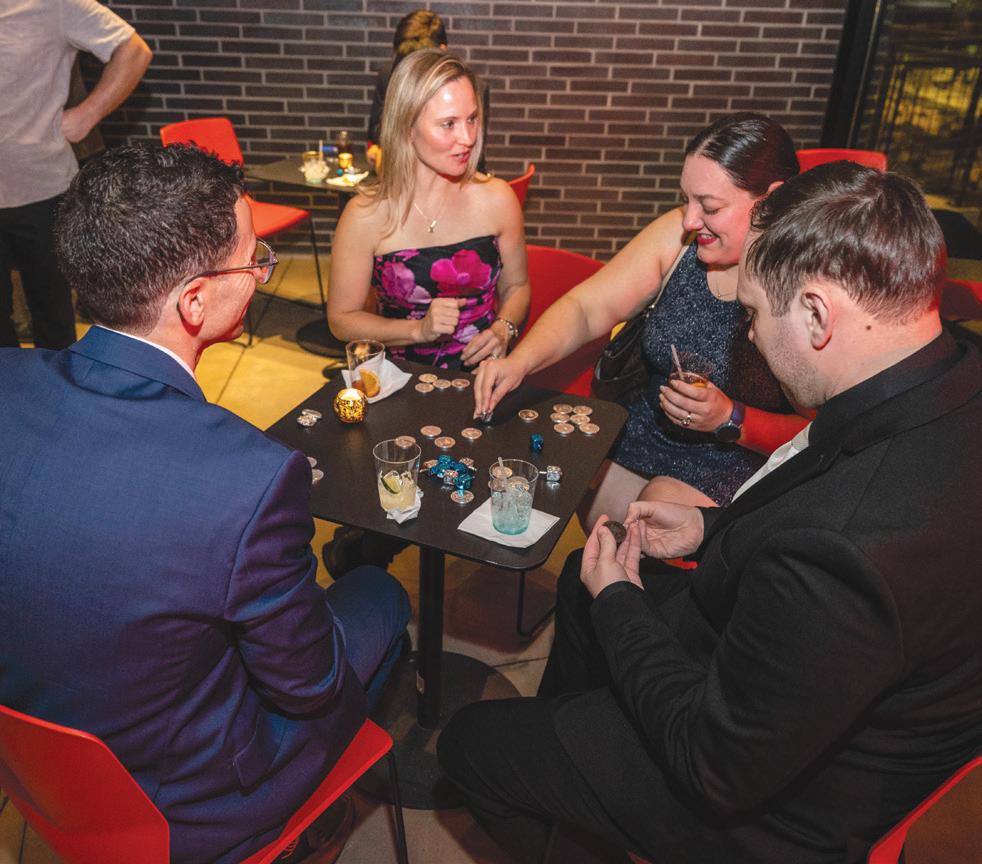
inclusivity, people from every part of Tidewater’s Jewish community could be found together at this special celebration.
“Now more than ever, it’s important for us to come together and rediscover why being Jewish matters,” says Sam Dreyfus, the event’s organizer. “Our community has the potential to be vibrant—not just a source of strength and connection for us, but a meaningful asset for the broader Hampton Roads region.”
The night wasn’t just about a Hanukkah celebration—it was a movement to strengthen bonds and reignite the spark of Jewish life in Hampton Roads. As attendees departed, many were already looking forward to the next gathering – Purim.
Frozen Flames reminded everyone that Jewish Tidewater is poised to shine brighter than ever.
Elana McGovern is United Jewish Federation of Tidewater’s Young Adult Division director.

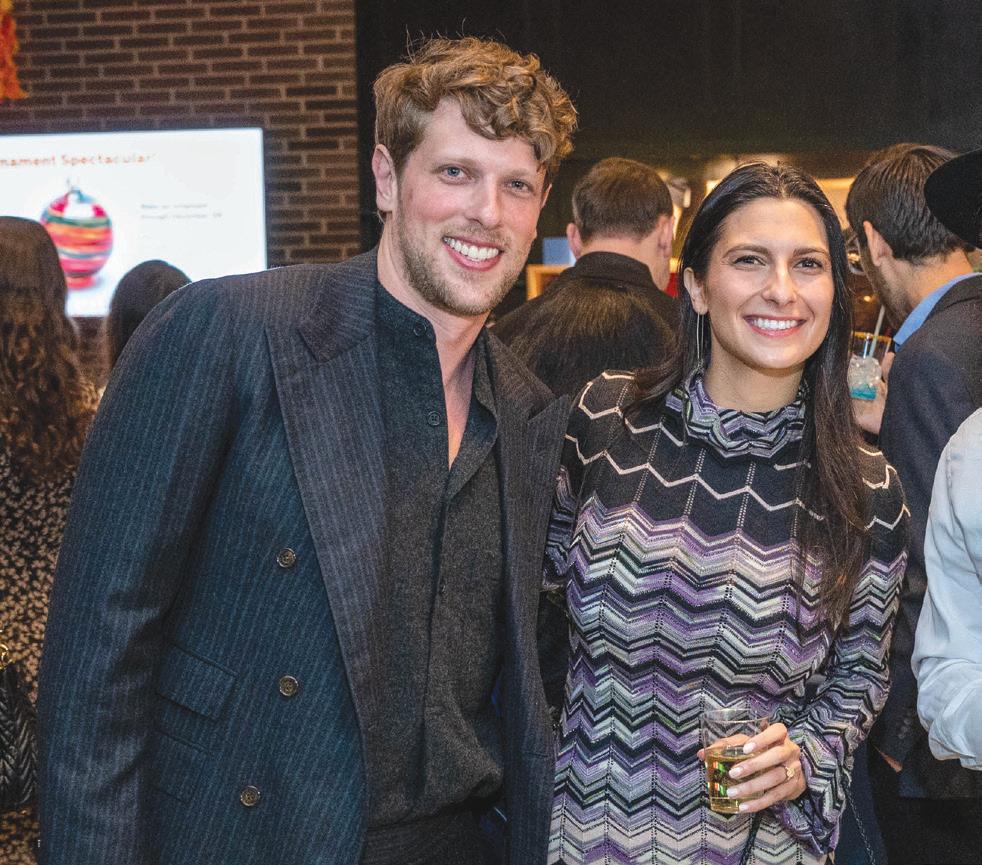
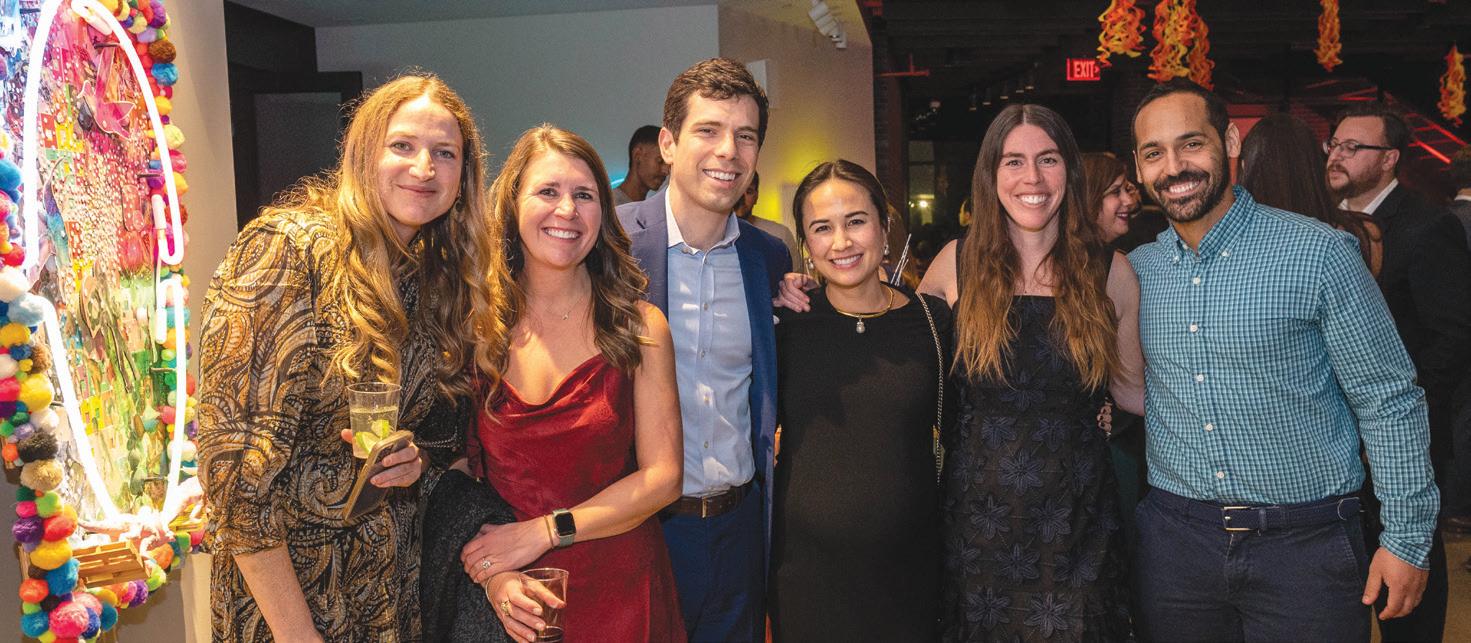
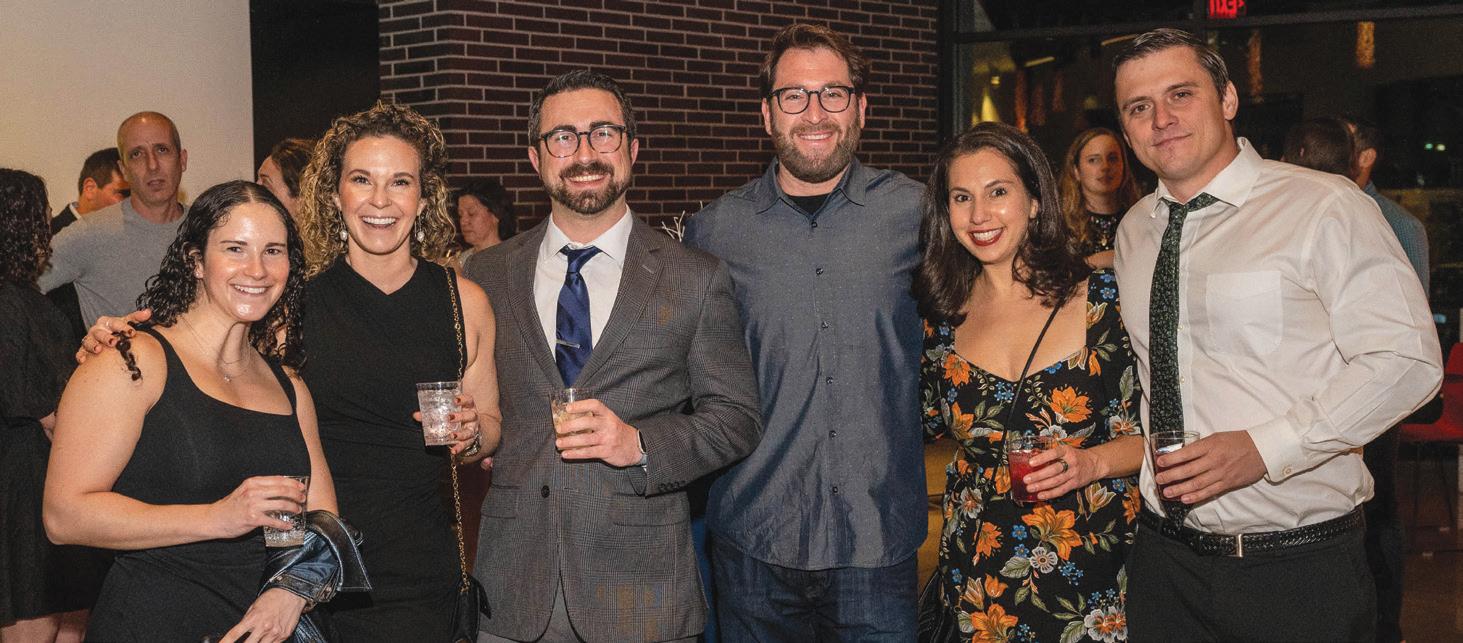
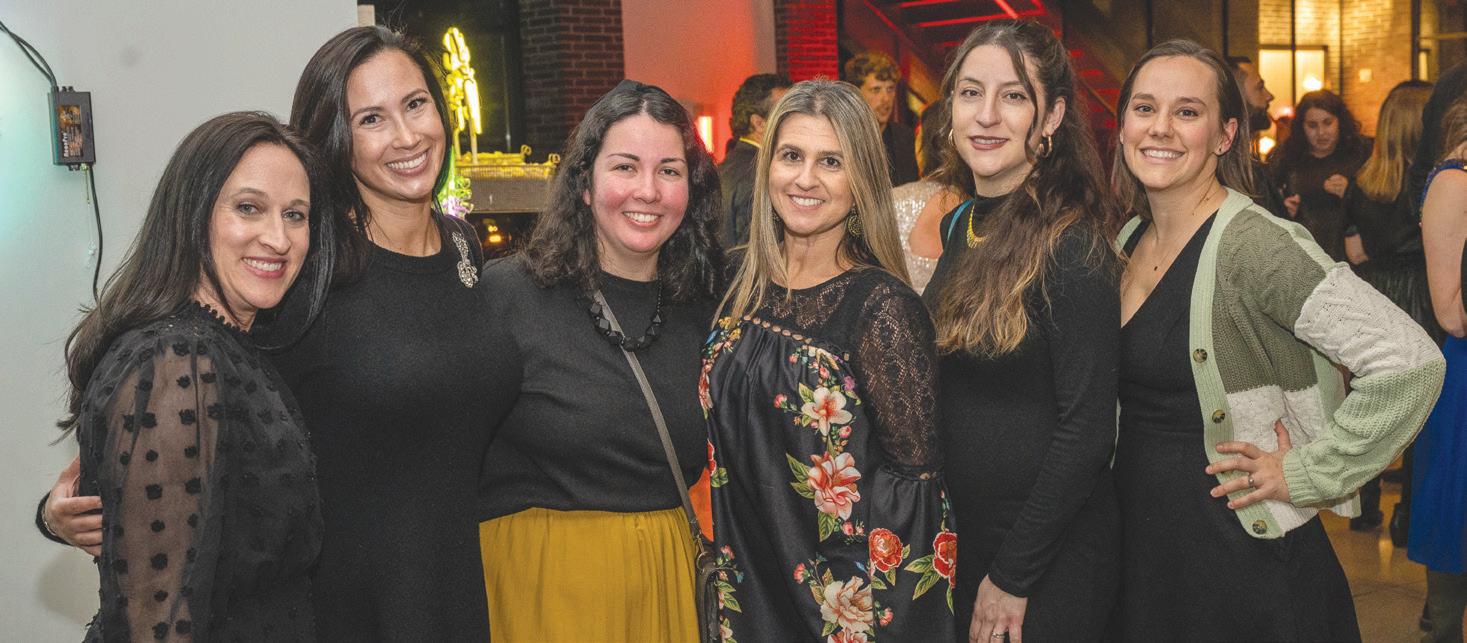
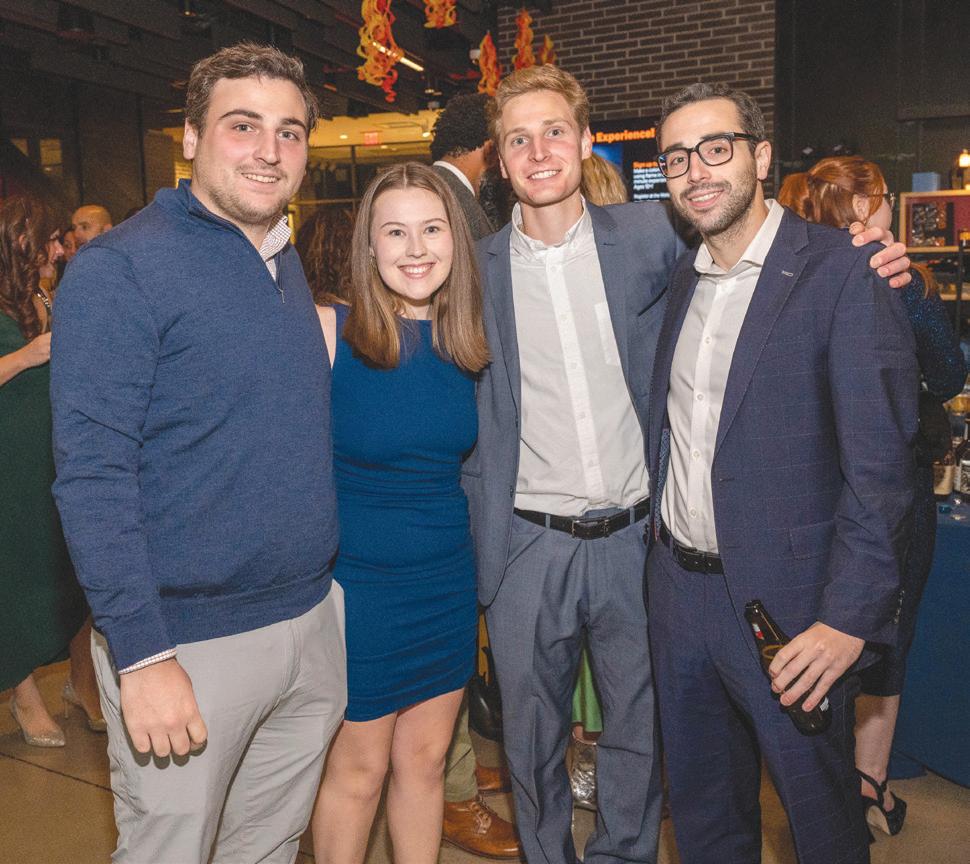


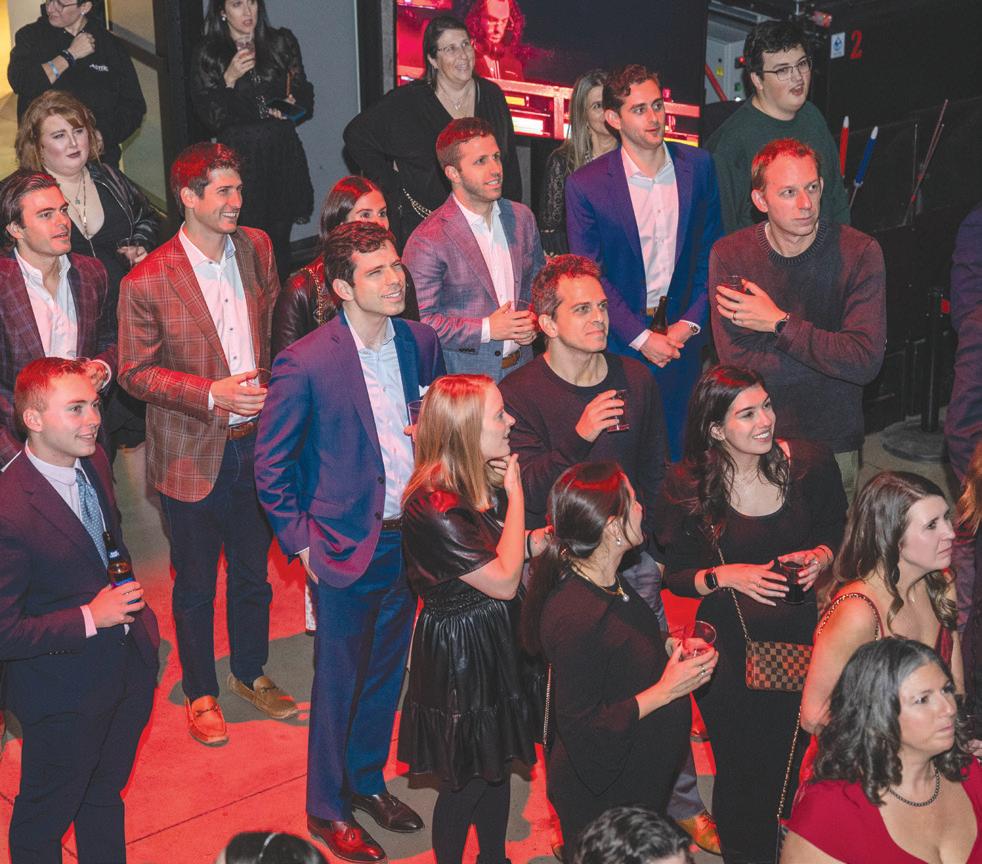


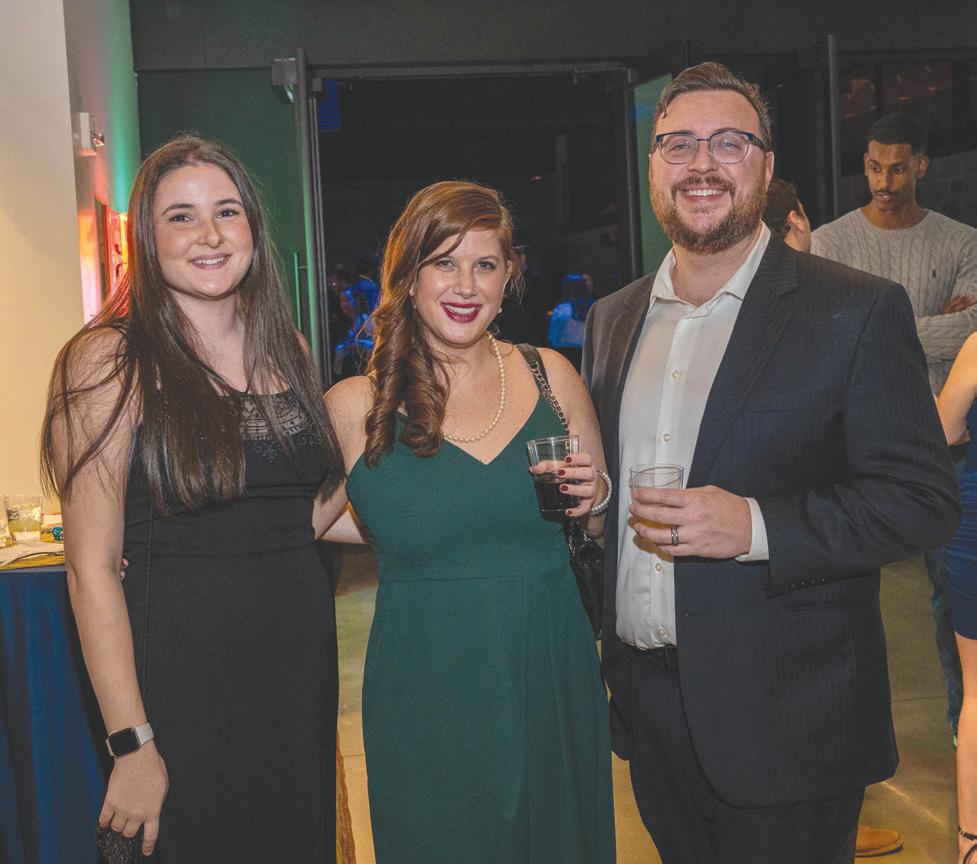

B e A R e a d e r
B B Y O Y o u n g A d u l t p r o g r a m s
J C C S u m m e r C a m p
H o n o r s o m e o n e y o u l o v e w i t h a
t r i b u t e i n s u p p o r t o f t h e i r f a v o r i t e
J e w i s h c o m m u n i t y p r o g r a m s !
J C C C h i d r e n + F a m y p r o g r a m s
J C C M a c c a b i
J e w i s h C o m m u n i t y R e l a t i o n s C o u n c i l I s r a e T o d a y p r o g r a m m i n g F r i e n d s o f t h e J e w i s h N e w s J C C P a t r o n o f t h e A r t s J e w i s h L i f e + L e a r n n g P r o g r a m s J C C A d u t p r o g r a m m i n g
T r i b u t e s a r e w e l c o m e i n a n y d o l l a r a m o u n t A n d s i n c e t h e y b e n e f i t t h e p r o g r a m s w h i c h m a k e u s t h e v i b r a n t a n d a m a z i n g J e w i s h c o m m u n i t y t h a t w e a r e
t h e y ’ r e a n e s p e c i a l l y m e a n i n g f u l w a y t o h o n o r a n d r e m e m b e r y o u r f r i e n d s a n d l o v e d o n e s .
T o m a k e a t r i b u t e , c o n t a c t P a t t y M a l o n e a t U J F T a t 7 5 7 - 9 6 5 - 6 1 1 5 o r p m a l o n e @ u j f t . o r g , o r v i s i t J e w i s h V A o r g / D o n a t e .
I f m a k i n g a t r i b u t e o n l i n e , a d d t o c o m m e n t b o x : T H I S I S A T R I B
Penny Schwartz (JTA) — To celebrate Hanukkah and Christmas, Max and Sophie, siblings in an interfaith family, bake up a batch of gingerbread dreidels.
That’s the plot of a new children’s book out this year, but it could be a real-life occurrence this month, when the first night of Hanukkah falls on Christmas Day. Among the children’s books released ahead of the holidays are several that nod to the unusual calendar convergence and the increasing share of families that include both Jews and people who are not Jewish.
Other notable new Hanukkah children’s books include one about a unique menorah used at the White House; a compendium of stories and essays for older kids; and picture books featuring a bear, a puppy and a dragon.
Here’s a rundown of the new books on the Hanukkah market in 2024.
Jane Breskin Zalben; illustrated by Thai My Phuong Charlesbridge; ages 4-7
In Jane Zalben’s new book, Max and Sophie are excited for the start of Hanukkah and Christmas Eve, which both begin the next day. The siblings are growing up in an interfaith family and celebrate both holidays with all their grandparents. They bake up a batch of gingerbread dreidels – a blend of each holiday’s traditions. When their grandparents arrive the next morning, they welcome Hanukkah and Christmas with latkes, pudding and holiday stories. My Phuong’s illustrations capture the kids’ joy and the book includes a recipe and instructions for readers to make their own gingerbread dreidels.


Marissa Meyer and Joanne Levy Feiwel and Friends; ages 8-12
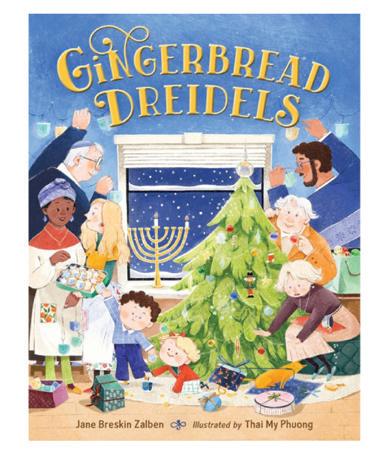

When two 12-year-old girls, each adopted at birth, meet by chance, they discover that they are identical twins. Aviva Davis, a vivacious Broadway hopeful, is growing up in an interfaith, interracial family and loves to hang out with her Jewish Bubbe. Holly Martin, who is Christian and lives with her mother and grandfather, is a more reserved book nerd. In this coming-of-age story, told in the twins’ alternating voices, the sisters secretly switch places at home just in time for Hanukkah and Christmas. When their mischievous scheme goes too far, Aviva and Holly argue. A family health scare draws the two unsuspecting families together in this Chrismukkah Parent Trap mashup, and Aviva and Holly realize the resilience of family bonds and gain a deeper meaning of their faiths.
Joyce Schriebman; illustrated by Gila von Meissner Intergalactic Afikoman; ages 4-9
In Joyce Schriebman’s humorous story, Oliver Overstreet hits send on an email to Santa to let the jolly North Pole giftgiver know that he is Jewish, and that Santa and his reindeer can skip his chimney. As the pages unfold, Oliver sets Santa straight, to make sure he knows the difference between Hanukkah and Christmas and that Santa should never eat potato latkes with ketchup.
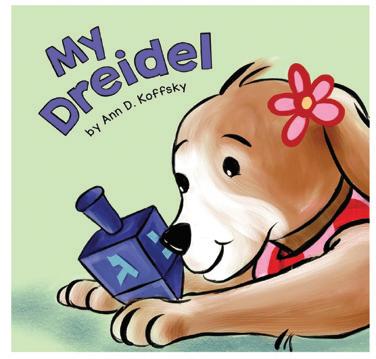

Ann Diament Koffsky
Apples & Honey Press; ages birth to 1
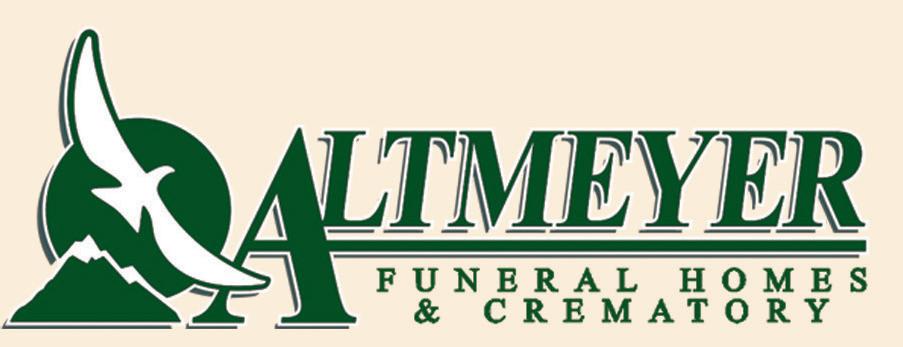
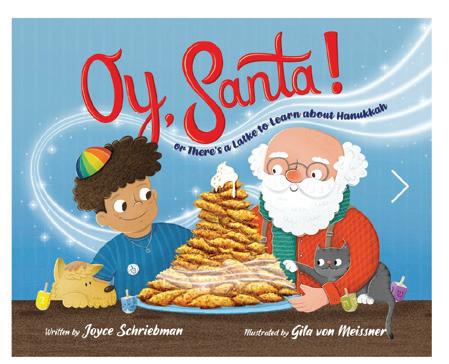

Young ones will relate to the child-like pup in Ann Koffsky’s cheerful board book when she tries to spin the Hanukkah dreidel with her paws. Her older brother helps out as they spin and dance till they plop like the dreidel.
Karen Rostoker-Gruber; illustrated by Carles Arbat Apples & Honey Press; ages 3-6
There’s mayhem in this laugh-out-loud story when a young boy invites a Jewish bear into his house for his family’s Hanukkah celebration. But when the fun turns messy, the boy asks his new friend to leave, a decision he instantly regrets after he realizes the bear is sad. All ends well when the thoughtful boy invites the bear back to celebrate together — outside.


Family owned and operated since 1917
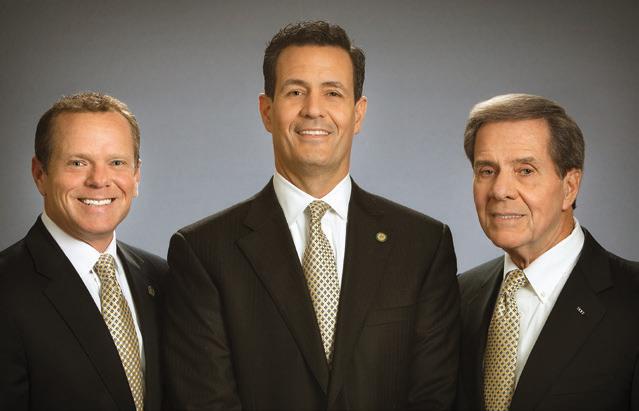

Flexible payment plans
Financing available
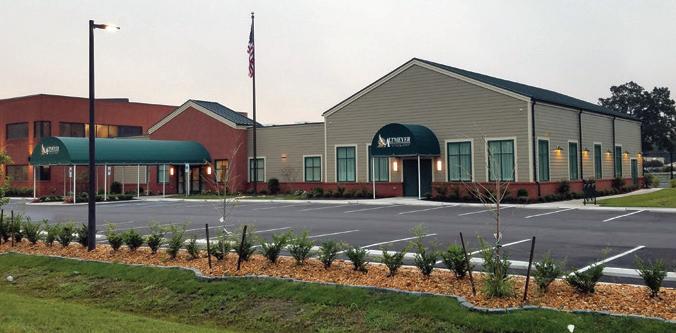

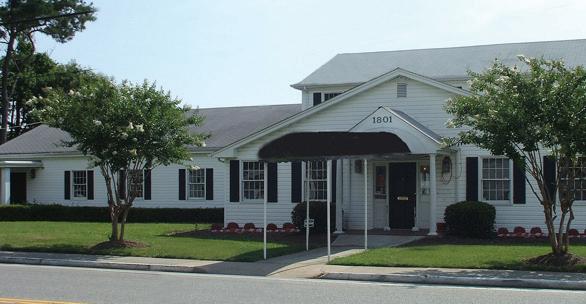



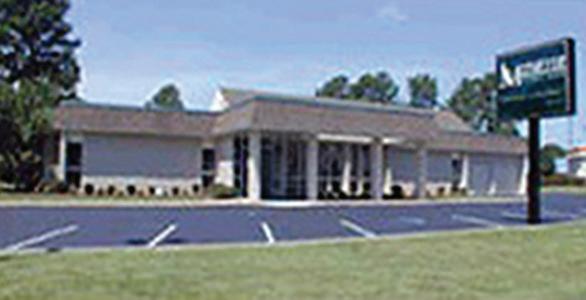

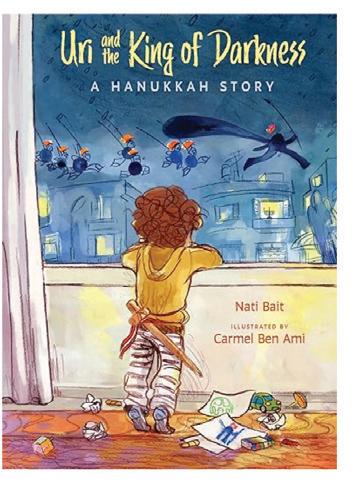
Nati Bait; illustrated by Carmel Ben Ami; translated by Ilan Kurshan Kalaniot Books; ages 4-9
As Hanukkah is about to begin, Uri and his sister Shir worry about their father when he is late coming home from work. Uri is frightened by a dark evening shadow cast from outside his window. He musters his courage, and with Shir, they fend off the imagined monster, waving his toy shield and Shir’s child umbrella. When their father arrives home bearing a boxful of sufganiyot, the fried jelly donuts enjoyed at Hanukkah, the family lights the menorah, with a more confident Uri, knowing he can draw on Hanukkah’s power of light to vanquish his fears.
Making your arrangements in advance is one of the best ways to show your loved ones that you care about them. Our Family Service Counselors have the training and experience that will help you in the process. Our services include a free funeral cost estimate, and we offer many options for financing. Visit our web site for a three-step Pre-Arrangement Guide or contact the Altmeyer Pre-Arrangement Center directly at 757 422-4000
Approved by all area Rabbis and Chevrah Kadisha
Celebrating life’s treasured memories.

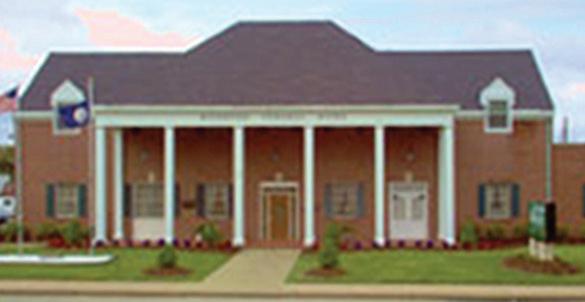


14K white gold 18" ♦ ¼ carats of diamonds Holiday drawing on Dec 23
For a truly special and personal present, allow me to introduce you to the curated list.
This story originally appeared on Hey Alma. My 77-year-old mother does not like stuff. She abhors clutter. She reuses everything. If you were to buy her a bottle of nice olive oil as a hostess gift, it would sit unopened in her pantry for the next 20 to 40 years. When I ask what she wants for Hanukkah, the answer is always the same: nothing.
But last December, my mother came to me with a specific request: She wanted eight lists of cultural recommendations, one per night. It turned out to be the best present I’ve ever given her.
The eight categories I selected were books, movies, TV shows, podcasts, musical albums, recipes, websites, and longform articles. I listed eight items per category, and I annotated them, explaining why I thought my mom might like each one.
This project required a deep dive into my own consumption habits — for example, I read plenty of longform articles, but I don’t have a system for tracking them. I vaguely recalled reading a piece about bagel vendors once taking on the mafia, but who wrote it, and for what publication? (The answer turned out to be Jason Turbow, for New York Magazine.)
female comedians? I hadn’t seen that one yet, but trusted sources (aka my friend Sarah who watches a lot of TV) had vouched for it. I ended up including all three of those on the TV list. Only Murders was the big winner for my mom. Broad City, on the other hand, did not make the cut — I’d absolutely adored it, but ultimately I decided not to include it on my mom’s TV list; I thought the humor might be “too millennial” for her.

More importantly, these eight nights of lists made me think carefully about my mother. What does she like? What media had she already consumed? How did she feel about it?
I didn’t want to recommend The Marvelous Mrs. Maisel to her because I knew she’d already watched it. What else was like that? Maybe Crazy Ex-Girlfriend, another witty comedy starring a Jewish female lead, which I had loved? Maybe Only Murders in the Building, which also has a great old-school Manhattan vibe? I had felt so-so about that show when I watched it, but I could imagine my mom liking it more. Maybe Hacks, which is also about
I realized in doing this project that I could make eight lists for anyone in my life, and they would all be different. The point of gift-giving isn’t just to give your loved ones stuff that you like. If it were, Hanukkah would be easy — I’d just buy everyone eight nights of single-origin chocolates and be done with it. The point is to give people stuff you like that you have reason to believe they will also like. At their very best, gifts feel personal: I am the only person who would have gotten this for you, and you are the only person I would have gotten it for.
That’s a high standard to maintain for every gift. If you need to find something for all your colleagues or cousins,
it’s reasonable to get them some nice soaps on the theory that most people, sooner or later, will wash their hands. But for those few special people where you want to get them something truly personal, I maintain that curated lists are one of the best options. A personalized list of recommendations says: I pay attention to you. I notice what you do and don’t like. I respect your preferences. I have taken the time to look at this piece of media through your eyes. I am happy to work within the overlap between you and me, the segment of Venn diagram where our tastes align.
At a time when more and more people want intangible media or experiences, giving a list can be far better than giving a physical item. If you try this out for your own loved ones, feel free to use the eight categories that I gave to my mom, or create others more suited to the recipient: mobile games to play, cities to visit, local restaurants to eat at… the list for potential lists is endless.
My mother has spent the past 12 months happily working her way through her lists. She still has plenty of untouched items (figuring out how to listen to podcasts has proved elusive), but she always tells me when she engages with something I recommended. She wound up liking The Good Place, once she figured out how to watch the episodes in order rather than at random. (Don’t ask.) And she loved the Moosewood Baked Tofu recipe.
She has shared her eight lists with her friends, and she tells me that they now all think she’s an extremely cool, finger-on-the-pulse sort of person. “They’ve never even heard of Haim,” my mother tells me with deep satisfaction, referring to one of the recommendations on the music list.
As Hanukkah approaches once again, I asked my mom what she wants this year. “I don’t want anything,” she said, like always. “Just add to my lists.”
Jackie Hajdenberg (JTA) — In 2013, there was the “Menurkey,” a turkey-shaped menorah, for the highly unusual overlap of Thanksgiving and Hanukkah.
Now, 11 years later, a new holidaymashup menorah is making its appearance. The Happy Jew Year hanukkiah features a spinning disco ball to mark the rare overlap between Hanukkah and New Year’s.
The menorah is the brainchild of Justin and Michelle Esgar, a New Jersey couple who have made a habit of throwing schticky Hanukkah celebrations complete with holiday staples like jelly doughnuts and latkes, tailored to an annual theme.
Esgars created a make-your-own ramen station and Japanese sweet potato latkes. Their local sushi place arranged the rolls in the shape of a menorah.
Now, they’re trying to bring their festive spirit to the masses from their home base in Jersey City.
“When we realized that Hanukkah this year was going to be over New Year’s, I was like, ‘There’s something there we can do,’” Justin Esgar says. “So, then we came up with the idea of ‘Happy Jew Year,’ and then this menorah concept where it’s representative of the New Year’s Eve ball drop from New York City.”
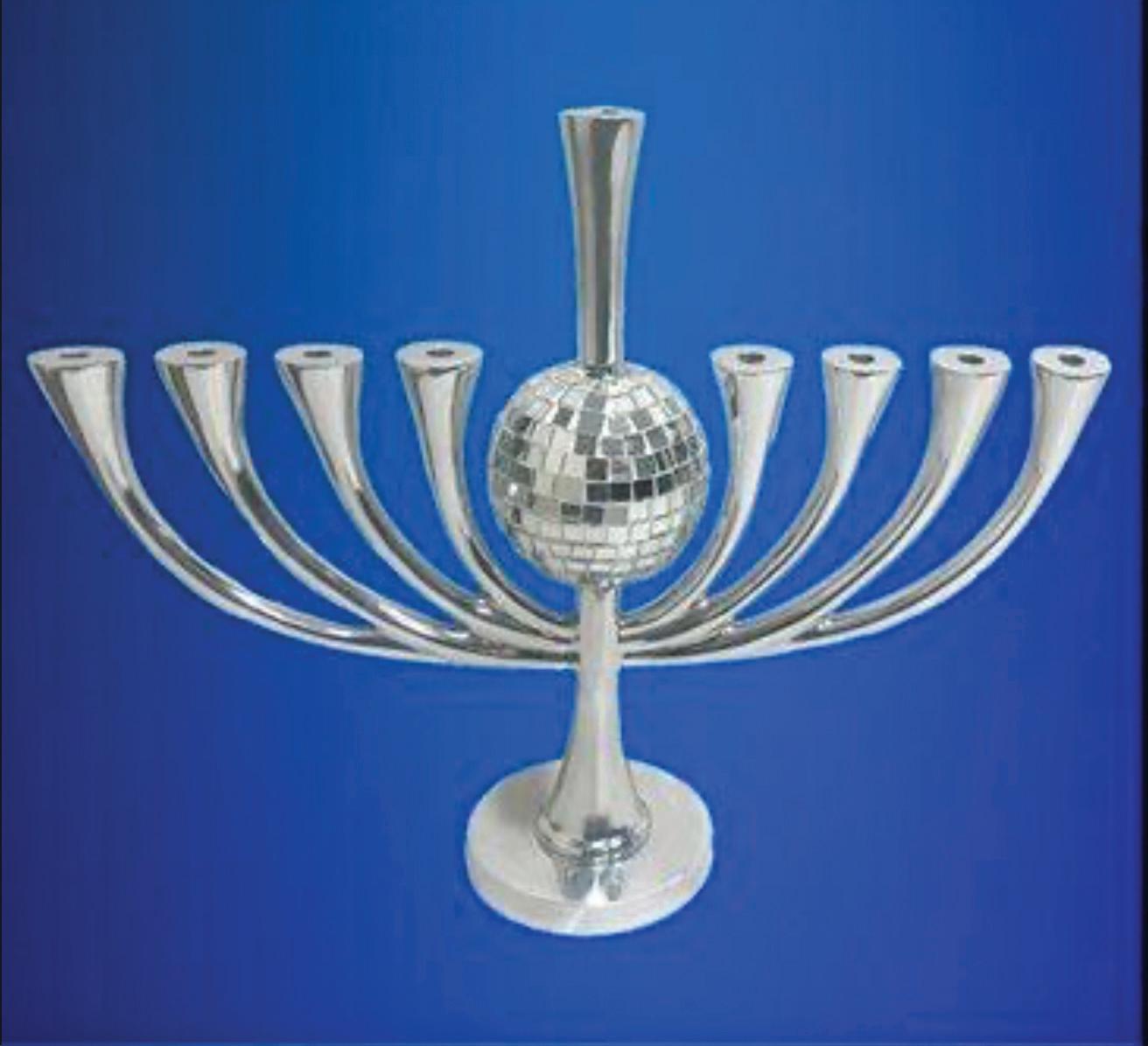
Back to the Hanukkah riffed on the movie Back to the Future. Alo-Hanukkah featured deep-fried King’s Hawaiian rolls. My Big Fat Greek Hanukkah took things back to the nation whose ancient forebears are traditionally depicted as the Hanukkah story’s antagonist. For Japan-ukkah, the
Hanukkah merchandise offerings have exploded in recent years, as corporations have realized the size of the marketplace created by an eightday celebration occurring during the winter holiday season in a society where more and more families include people of multiple faiths. The idea of “Chrismukkah” — another meeting of two holidays that is also occurring this year — is a mainstay of popular hibernal discourse. But new products for calendar quirks such as the New Year’s overlap during an unusually late Hanukkah have often been the province of cottage creators who can devote themselves to a single item.
New Year’s is usually not a prime


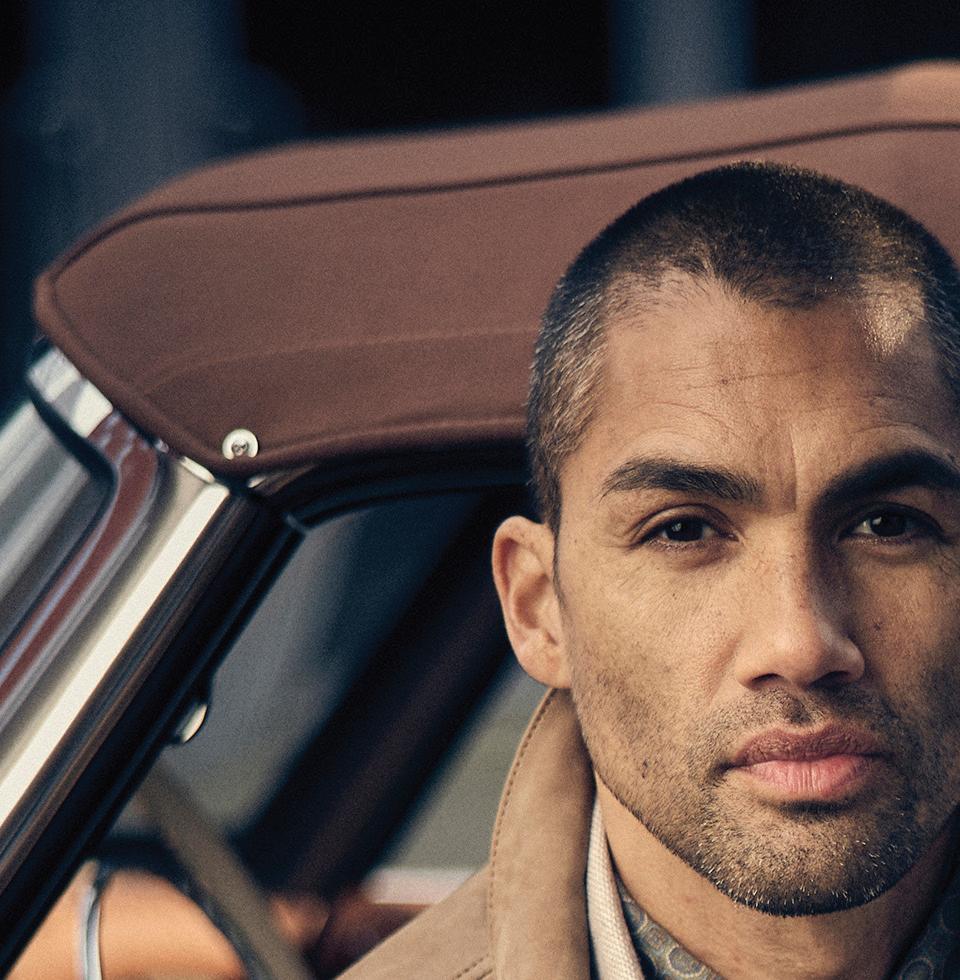

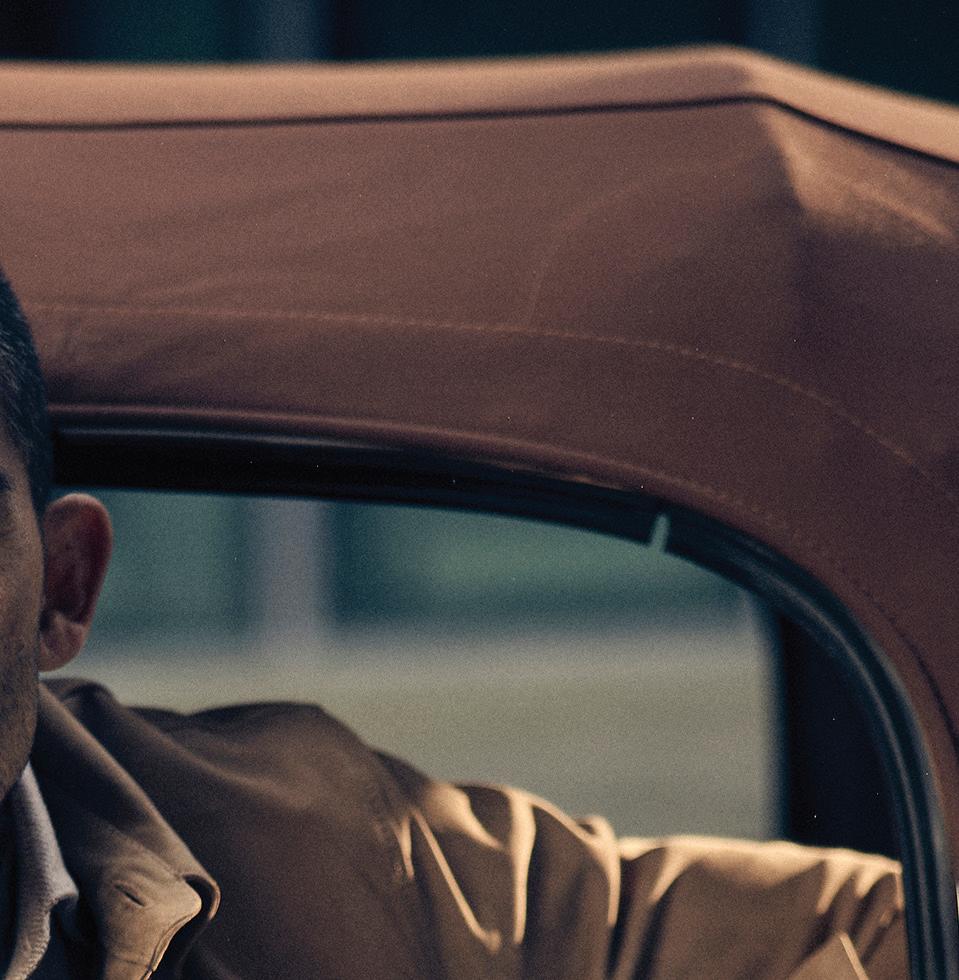


time for Judaica mashups, according to Rabbi Yael Buechler, a creator and self-appointed watchdog of mass-market Jewish products who scours big-box stores’ Hanukkah offerings.
“New Years is a time when more families are away or just returning from vacation. The grownups might have plans, but they are not as synced with kid-based experiences,” she wrote in an email. “I would have loved to see some sparkly NYE/Hanukkah headbands. Maybe they’ll surprise us with a crystal dreidel atop Times Square!”
The Esgars’ menorah is nickel-plated and made by hand. It’s priced at $54 — three times $18, a number that signifies life in Jewish tradition.
Happy Jew Year wasn’t the Esgars’ fi rst idea. They initially considered marking the occasion with sparkler
— but learned that
have to burn for at least 30 minutes to be considered kosher.
“Nobody wants a sparkler in their house going off for a half hour,” Esgar says. “That’s a fire hazard.”
Then their thoughts turned to Asher Weintraub, the 10-year-old who invented and marketed the 2013 Thanksgiving menorah. “It was a kid who made the menurkey,” Esgar says. “We were kind of thinking about that when we were coming up with this idea.”
While the Menurkey was effectively a single-use object for most buyers — Thanksgivukkah will not happen again until 2070, nearly six decades after the last occurrence — the Happy Jew Year menorah will soon be relevant again. Hanukkah will overlap with New Year’s Eve again in 2027, 2035, and 2043.


Rabbi Israel Zoberman
The fragile yet formidable Chanukah candles
We tenderly lit, daringly defy the suffocating Darkness around us and in us, Soothing and softening, we pray, all who Their magic of evoked memories of elation
And trepidation with oil – dripping levivot (Potato pancakes) for expectant levavot (Hearts) while partaking of sustaining sweet Sufganiyot (donuts) to counteract the bitterness Of previous and following defeats, Celebrating a temporary victory before the Hasmonians’ intra-feuds hastened the demise Of short-lived Jewish sovereignty with warning Lessons for the contemporary scene of mounting Extremism and spreading strife, With hostages in death-filled Gaza darkness
Still-second Chanukah’s Festival of Lights
In captivity, how tragically ironic!- desperately Yearning for a light lagging too long
Behind and may not come, and for too many Their wondrous light already snuffed out by Those adoring the dark with the candle of each Unique life burning down before its time and Forever lost is that consecrated inner oil, Though only we possess the priestly power
To extinguish the bright Chanukia (menorah) Embedded deep within us.
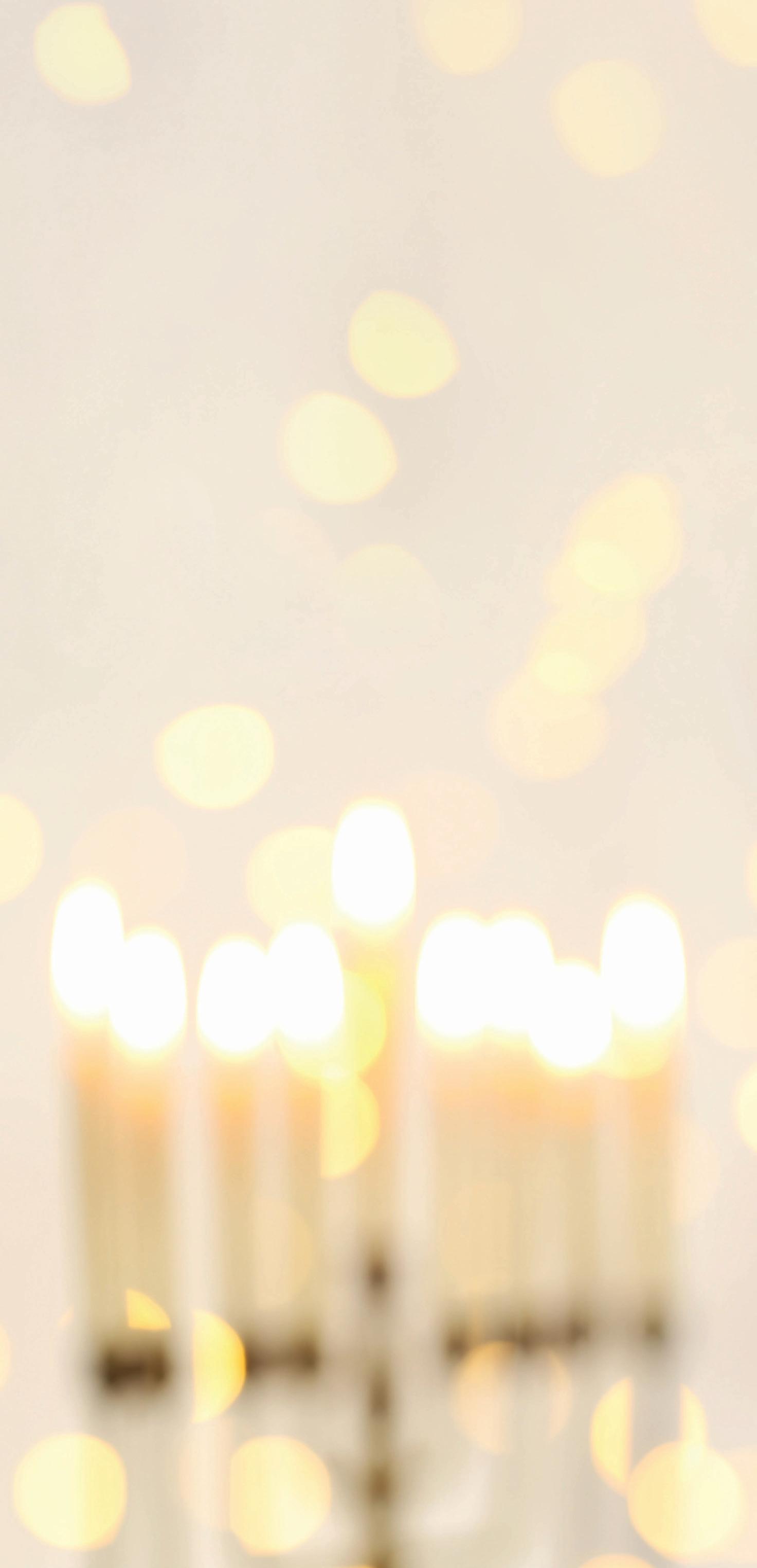
Rabbi Dr. Israel Bobrov Zoberman is the founder of Temple Lev Tikvah and Honorary Senior Rabbi Scholar at Eastern Shore Chapel Episcopal Church,
Joanna Nissim
This story originally appeared on The Nosher.
The thing that I love about Jewish food is that across our wonderful and diverse communities, we often eat pretty much the same dishes, with slight variations in name, fl avor, and technique. For example, the typical Iraqi Hanukkah sweet zalabia — a delicious fried, yeasted funnel cake soaked in a sticky and intensely sweet syrup — is essentially the same as Syrian zalabiah (although theirs is a different shape) and Indian jalebi, both also eaten on Hanukkah.
This makes perfect sense, as Jews who originated from Spain spread across the world after the Inquisition, taking their recipes with them across the Middle East. There are documented recipes for zalabia in a 10th-century Arabic cookbook, which was originally made by pouring the batter through a coconut shell. The recipes were slightly adapted according to their new surroundings, including zalabia. Indian Jews, for instance, use ghee and turmeric, two very common ingredients in Indian cooking; Syrian Jews use orange blossom water as the main flavor of their syrup for similar reasons.
Our family makes Iraqi zalabia, and very little has changed through the ages. I love the nostalgia that Hanukkah holds for so many of us; the memories of watching parents and grandparents frying treats — be they zalabia, sfenj, latkes, or any of the other delicacies Jews enjoy at this time of year — waiting for the chance to taste them.
This year, my five-year-old son stands next to me as I fry the zalabia — he is responsible for dunking them into the syrup, licking his sugary fingers as he goes, I’m sure, and admiring his handy work at the end.
In these troubled times, it brings me reassurance to think of the culinary traditions that have stood the test of time, through wars and atrocities. I am comforted that, like the Hanukkah story itself, we will come out the other side victorious — perhaps with a new festival or culinary traditions to celebrate the time in 2023 when Hamas attempted, and failed, to slay the Jewish people.
Note
• You will need: a kitchen funnel and a squeezy bottle with a nozzle top.
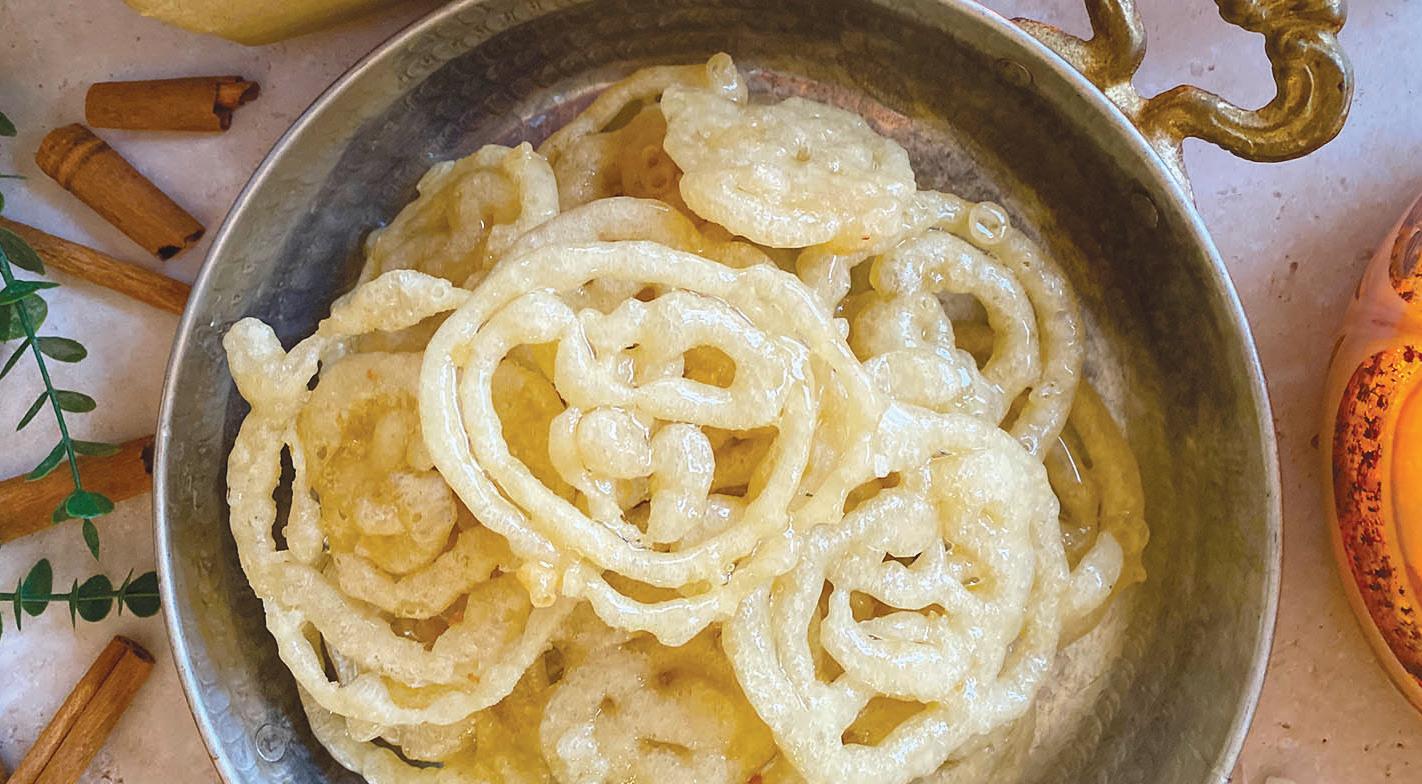
Total Time: 2 hours 45 minutes
Yield: 30
For the batter:
• 2 tsp dried yeast
• 2 cups warm water, divided
• 1 tsp sugar
• 1 pinch salt
• 2 cups plain flour
• neutral oil, enough oil to fill a pan, 4-5 inches deep
For the syrup:
• 3 cups sugar
• 1 cup water
• 1 tsp lemon juice
1. Start by making the batter. Mix the yeast, 1 cup warm water, sugar and salt, and leave for 15 minutes until it foams on top.
2. Add 2 cups flour and the remaining 1 cup water to the yeast mixture and mix well.
3. Leave in a warm place for 2 hours until the mixture is bubbling and smells yeasty.
4. While the mixture is fermenting, make the syrup: Mix the sugar and water together in a pan and bring to the boil. Once boiled, let it simmer until it thickens for approximately 7-8 minutes and coats the back of a spoon. Turn it off the heat and let it cool down while you finish the zalabia.
5. Once the zalabia batter is ready and has bubbled, using a kitchen funnel, pour the mixture into a squeezy bottle with nozzle top.
6. Heat the oil until it is shimmering. Once it shimmers, squeeze the mixture from the squeezy bottle into the hot oil creating a spiral shape, approximately 3 inches wide. Do not overcrowd the pan while frying, as the zalabia will turn soggy.
7. Once the zalabia puff up and slightly change color, flip them over. Cook for another few minutes, when they begin to firm up and become slightly golden. Remove from the pan and drain on kitchen paper.
8. While still warm, take each zalabia and drop into the warm syrup quickly, but ensuring the fritter is completely coated. Remove with a fork, shaking off the excess syrup. Serve warm or at room temperature.
Rabbi Michael Panitz
If you free associate on the word “Hanukkah,” it is likely that among your first mental images will be a Hanukkiyah – maybe a craft project, the work of your own Sunday School-age hands? Or the family’s customary menorah when you were a child? Or an inheritance from a late grandparent that you took to your college dorm? Or perhaps one that you kindled when raising your children? It is likely that all these menorah memories involve a candelabrum with eight candle cups and a ninth one at a different level.
But was that the original Hanukkah menorah? Demonstrably not. Both literary and archaeological sources tell us that our first tradition was to have a lamp. It was filled with a plant-derived oil, preferably olive oil. The amount of oil and the length of wick would determine how long it would burn – the mandated duration was the length of the evening rush hour, so that a maximum number of people, walking home past our doorway, would see our effort to publicize the miracle of the holiday. Candles came later, probably when many of the Jewish people migrated away from the Mediterranean basin into climate zones too cold for olive trees to flourish.

The Babylonian Talmud, an encyclopedia of Jewish law, lore, and Bible interpretation from the centuries after the destruction of the Second Jerusalem Temple, preserves records of how we practiced our religion in its formative era. The standard practice for Hanukkah, we are told
(Tractate Shabbat 21b), was “one lamp per household.” That is to say, from the first through the eighth nights of Hanukkah, the householders would light one lamp in observance of the holiday. The preferable place to display that lamp was in a sconce outside the house, to the left of the main door. That way, the house was framed by symbols of Jewish identity: the mezuzah on the right side of the door (as you face the entrance from the outside) and the Hanukkah lamp on the left side.
It is the nature of fashion to change. The unadorned, hand-made, pinched-spout lamps of Judean households were themselves an innovation from stillolder, simple, saucer lamps, because the pinched spout supported the wick. But that style, in turn, gave way to fancier designs. When Hanukkah was a young festival, in the second century Before the Common Era, the fashion in other parts of the Hellenistic world was to use molds to create lamps. Obviously, having a mold made it easier to produce large quantities of lamps and to put deluxe, elaborate lamps within reach of many more households. It is quite likely, therefore, that some of our ancestors substituted a fancier lamp for the “cocked hat” style of the older lamps.
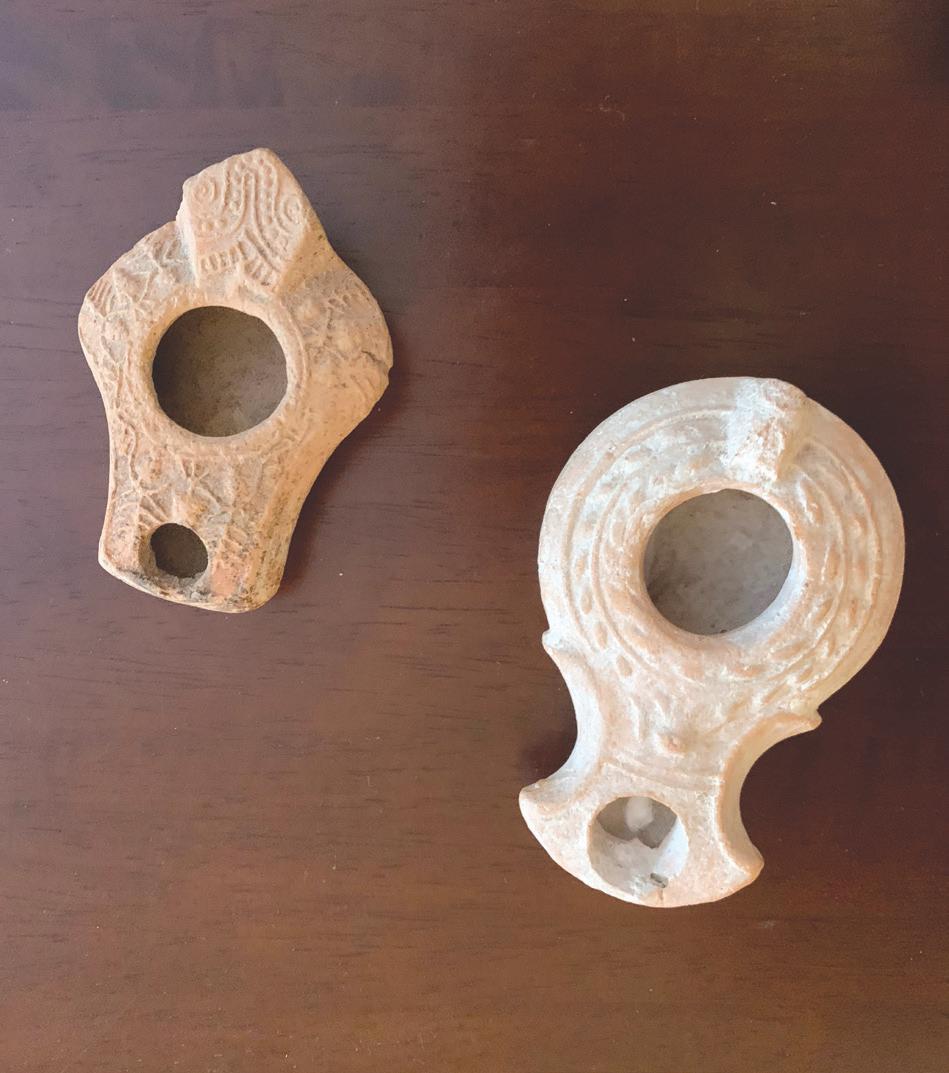
Loyal Jews were not the only ones using lamps. In the pre-Thomas Edison era, lamps were a household necessity. Even in sites from the Land of Israel, there are numerous examples of lamps that definitely would not have been appropriate for Hanukkah use. Floral and geometric motifs are fine, but not idolatrous
themes. The next lamp, featuring pictures of the Greek demigod “Cupid,” would have been unorthodox, to say the least!

How did we get from the Rabbinic norm of “one lamp per household, each night” to the contemporary practice? The Talmud relates that some people, more punctilious in their observance, would have a lamp for each member of the household. There is an echo of this practice in many Jewish homes today, where the number of Sabbath candles increases with each addition to the family.
Finally, we get to the “punctilious among the punctilious” – clearly not the majority in its own day (the 1st century Before the Common Era), but the standard practice today. Such people would light a different number each day. One custom was to begin with eight lamps and reduce the number of lamps by one each night, until only one lamp would be lit on the final night of Hanukkah. That was the practice of the School of Shammai. The famous rival of that academy, the School of Hillel, reversed the order. They lit one lamp on the first night, adding one each night and concluding with eight on the final night – from which our now-standard practice descends.
Like life in general, and certainly like Judaism, Hanukkah observances reflect the ever-shifting balance of the old and the new.
Dr. Rabbi Michael Panitz is the rabbi at Temple Israel in Norfolk.
Light up the holiday by attending one or more of these community-oriented experiences. With some events geared for children and others for adults, some in Virginia Beach and others in Norfolk, plenty of options are available to celebrate Hanukkah with community. Chag Hanukkah Sameach!
Menorah Car Parade – Sharing the light in a world that seems dark
Thursday, December 26, 5:30 pm
Starts at Chabad House
Includes the CTEEN Limo Party. First 30 cars to RSVP will be outfitted with a rooftop menorah.
Dinner to go provided with an RSVP to 757-616-0770.
Giant Menorah Lighting and Celebration – Light up the night and darkness
Sunday, December 29, 4:30 pm
Mount Trashmore parking lot near the YMCA Hanukkah treats, gelt drop, latkes, donuts, and festive music.
RSVP: www.chabadoftidewater.com/light.
Combined Hanukkah services and celebration
Friday, December 27, 6 pm
Temple Emanuel
Musical Shabbat/Hanukkah services with the combined Congregation Beth Chaverim and Temple Emanuel Choir. Stay for latkes, jelly donuts, laughter, and fun. Free.
RSVP by Dec. 20 at 757-428-2591.
Celebrate Hanukkah
Friday, December 27, 5:30 pm
Congregation Beth El Services, dinner, and lighting the menorah (provided by Beth El or bring your own)
$10/adult, $5/children under 13, $30/family.
RSVP by December 20: 757-625-7821.
A Celebration of Lights
Sunday, December 29, 2 - 3:30 pm
Jewish Museum & Cultural Center, Portsmouth Crafts, spin the dreidel, light a menorah, hot chocolate, snacks.
Hershel and the Hanukkah Goblins screening.
RSVP: jmccportsmouth@gmail.com or 757-391-9266
Jewish rapper Ari Lesser
Thursday, December 26, 6 pm
24th Street Park
Chanukkah and Ice
Monday, December 30, 5:30 pm
Town Center
Special Hanukkah gifts for every child, donuts and latkes, and arts and crafts.
$9.50/person includes skates.
VB Menorah Parade, Spreading the light of Hanukkah
Wednesday, January 1, 4 pm
Meet at 3400 Holly Road, Virginia Beach
Receive an LED menorah. Stops at Trader Joe’s and Town Center for menorah lighting, Hanukkah gifts and donuts.
Indoor and Outdoor Menorah Lighting
Monday, December 30, 5:30 pm
KBH
Light dinner, latkes, and Hanukkah music.
Drinks & Dreidels
Tuesday, December 17, 6 – 8:30 pm
Ohef Sholom Temple
Latkes and vodka, improv show, and trivia competition.
For adults, with babysitting available.
$25/person
RSVP: ohefsholom.org
Friday, December 27, 7:30 pm
Temple Lev Tikvah
Candle lighting service on the last night of Hanukkah during Zoom minyan.
Thursday, January 2
Call for Zoom information: 757-489-4550.
Chanukah Celebration
Wednesday, January 1, 6 pm
B’nai Israel Congregation
$8 per person, $40 per family.
Information: Norfolkkollel.com.
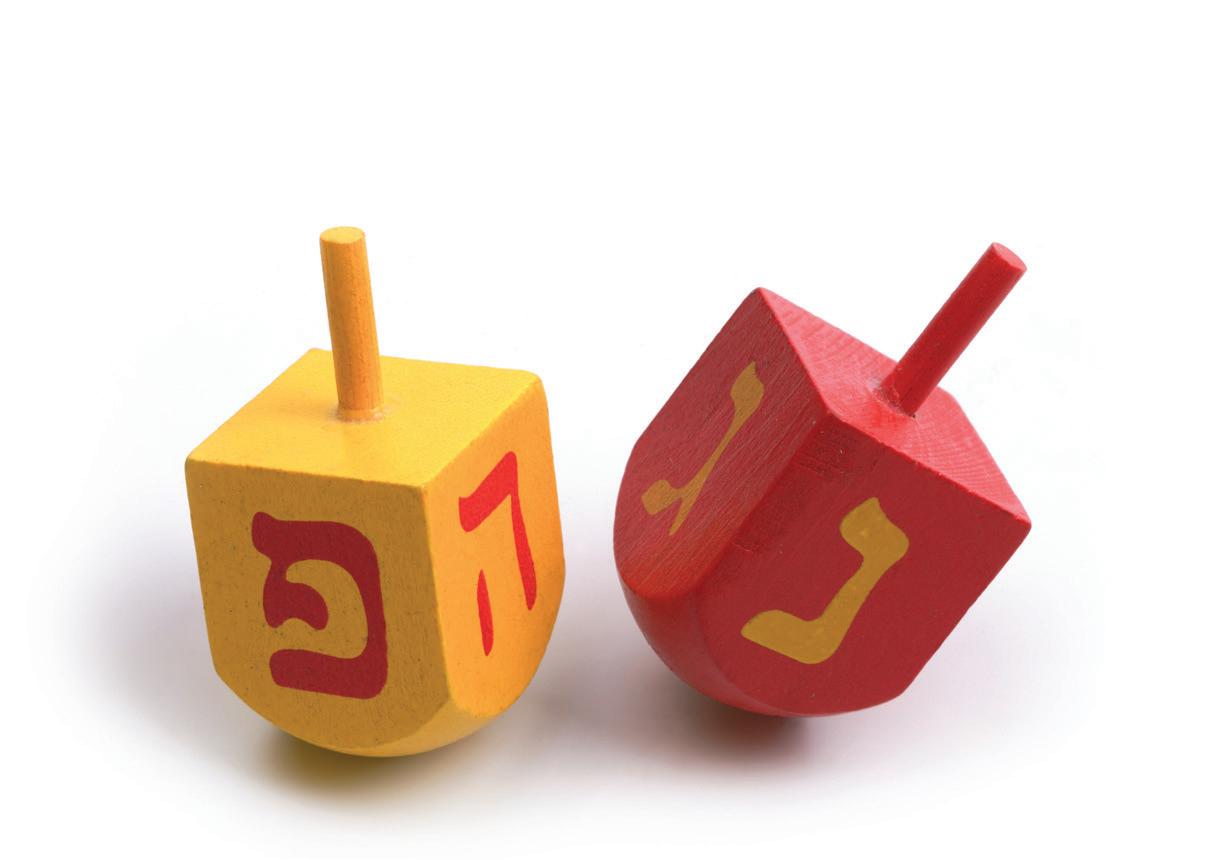
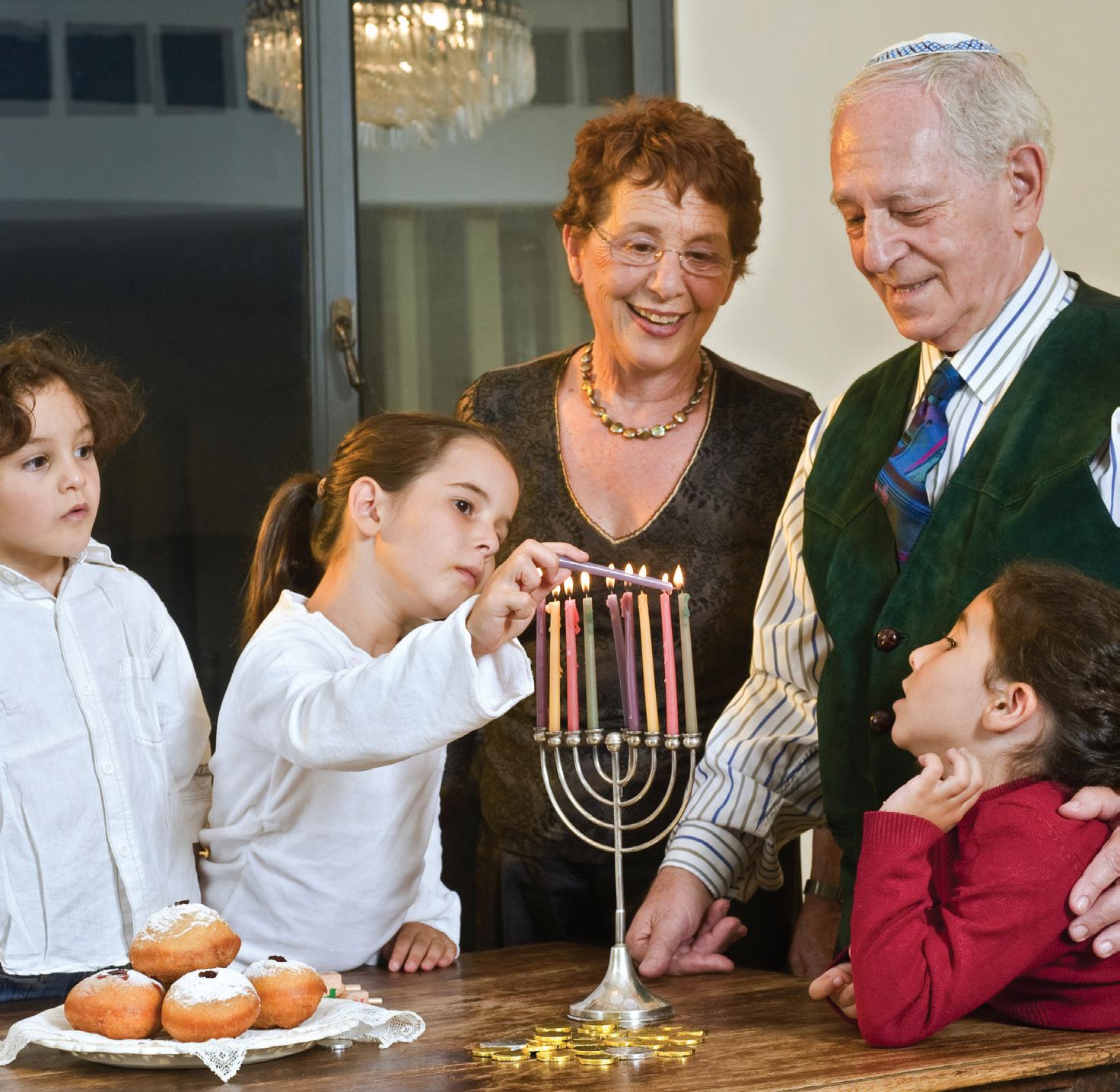
Through your legacy gift of any size, you’ll ensure that the warmth of Hanukkah continues to spread its glow for future generations while helping sustain our most cherished Jewish Organizations in Tidewater:
• B’nai Israel Congregation
• Beth Sholom Village
• Chabad of Tidewater
• Congregation Beth El
• Jewish Family Service of Tidewater
• KBH Kempsville Conservative Synagogue
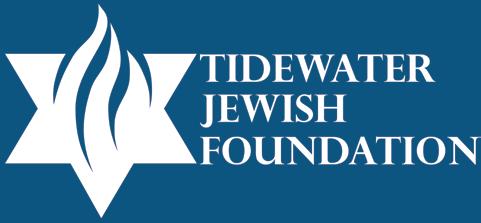
• Ohef Sholom Temple
• Simon Family JCC
• Strelitz International Academy
• Temple Emanuel
• United Jewish Federation of Tidewater
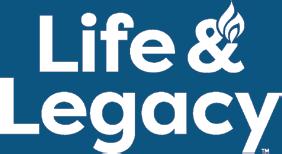
Learn more and start building your legacy today: foundation.jewishva.org/life-legacy.
Sierra Lautman
As Hanukkah approaches, Jewish families look forward to celebrating the Festival of Lights with candles, latkes, and community traditions. For many, this time of year also brings the opportunity to share the beauty of the holiday in diverse community settings, including public schools.
Parents and grandparents often fi nd themselves in the role of the “Hanukkah parent,” helping teachers and classmates understand this holiday. Those volunteering to speak or bring a Hanukkah-themed activity to a child’s class might consider sharing the story of the Maccabees and the miracle of the oil, alongside hands-on experiences such as spinning dreidels or adding candles to a menorah. PJ Library offers a wealth of child-friendly resources, including crafts, books, and recipes, at pjlibrary.org/hanukkah.
In a classroom, remember to focus on what makes Hanukkah unique, rather
than comparing it to other holidays. Bring joy, education, and hands-on learning, helping children of all backgrounds appreciate the values of resilience and light that Hanukkah represents.
It’s equally important to navigate public school traditions with awareness of inclusion. The Anti-Defamation League’s guide on the December Dilemma provides strategies for ensuring holiday celebrations respect all students’ backgrounds and meet constitutional guidelines. This resource is a must-read for parents working with teachers to make classroom activities inclusive: JewishVA.org/DecemberDilemma. Consider printing a copy and using it as a conversation starter with teachers or school administrators.
For more resources to help celebrate Hanukkah and share it with the greater community to foster inclusivity and understanding, contact Sierra Lautman at SLautman@UJFT.org



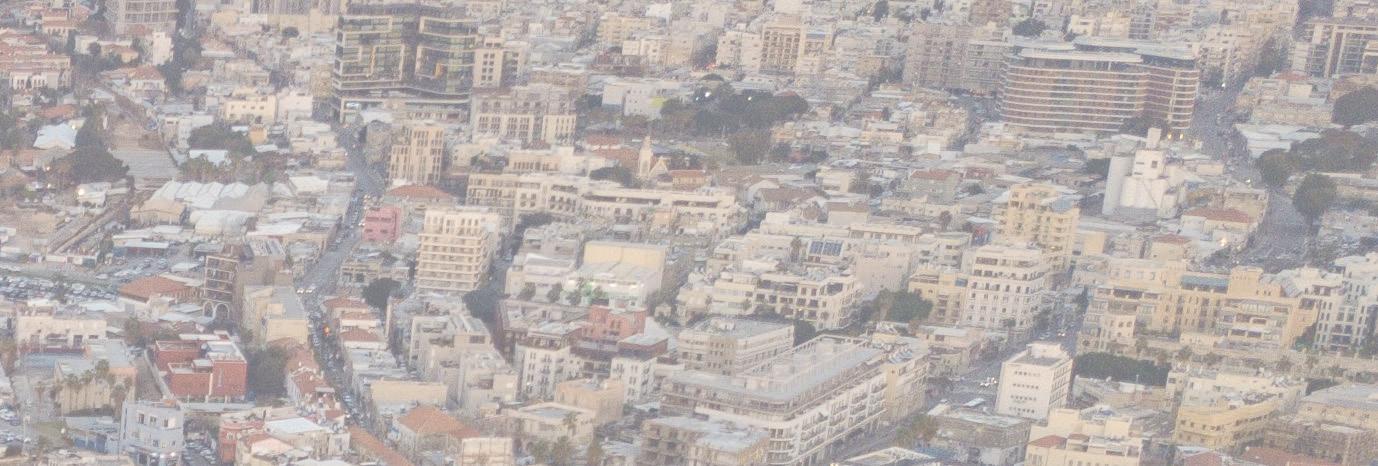

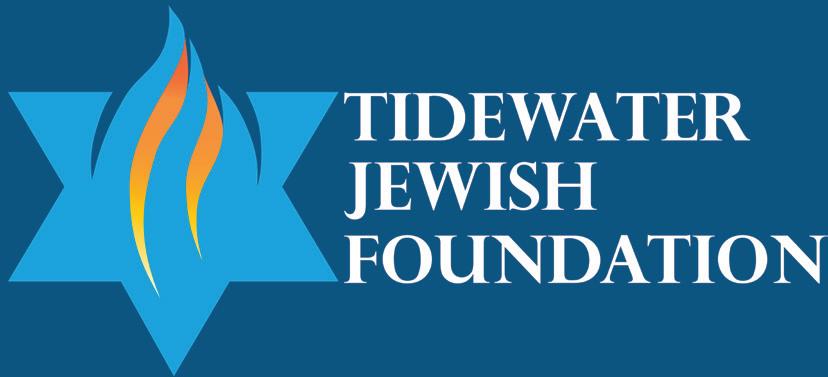
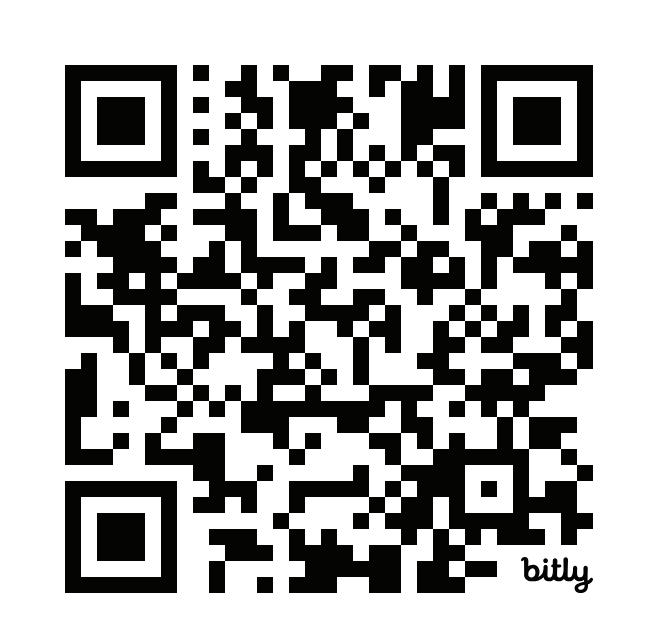

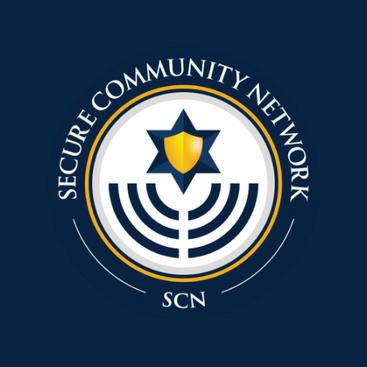
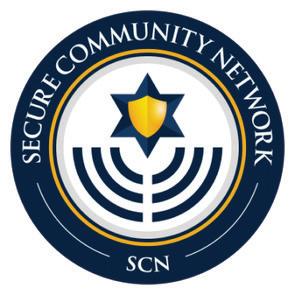
Pati Menda Oliszewski

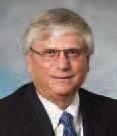




Love may be a universal theme, but the way it is portrayed can vary profoundly from one work to another. This is evident in the series Nobody Wants This and the fi lm Transmitzvah. Both productions, available on Netfl ix, revolve around dilemmas involving Judaism, sibling dynamics, and the complex relationships between love, identity, and values. However, while one seems to disdain our traditions, the other honors them with respect and depth.
Wants
Nobody Wants This tells the story of a rabbi who, while trying to balance his religious role with his personal life, finds himself in love with a non-Jewish woman.
was still a boy. Now, she sees this ritual as a chance for reconciliation and acceptance.
The narrative follows her journey of self-discovery and reconnection, supported every step of the way by her brother. The film delves into complex issues of identity, belonging, and faith, demonstrating that traditions can be adapted and recontextualized without losing their essence.
Here, Judaism is not seen as a hindrance but as a solid foundation upon which family relationships and self-acceptance can be built. The story celebrates the beauty of love that embraces, respects differences, and reinforces the importance of values that transcend generations.
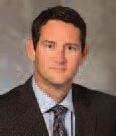
The storyline, fi lled with witty dialogue and sarcastic humor, carries an unmistakable message: it’s better to abandon faith and traditions for the sake of a shallow love, devoid of roots and respect for one’s origins. While the premise is intriguing, its execution feels caricatured, even disrespectful, ignoring the depth of the dilemmas that such choices truly entail. The series offers a simplistic and disposable view of Jewish beliefs, treating them as outdated accessories. The rabbi’s emotional and ethical struggles are portrayed superficially, while the notion that “love conquers all” serves as justification for forsaking values and traditions—something that impacts not just individuals, but an entire community and cultural heritage.
On the opposite end of the spectrum, we have Transmitzvah, an emotional film that tells the story of a trans woman who, as an adult, decides to reconnect with her family and Jewish heritage by celebrating her Bat Mitzvah. As a child, she had rejected the opportunity to have a Bar Mitzvah when she
Although both works center on love, Nobody Wants This and Transmitzvah present radically opposing views on the role of Judaism in their characters’ lives. While the series portrays love as something that supersedes values and traditions, the film depicts it as a force that strengthens them.
Personally, I can’t help but ask: which love is genuine? Can love that disregards our roots and beliefs truly be real? Or is true love the kind that accepts us wholly, including our convictions and the legacy we carry?
Between the fleeting laughter of Nobody Wants This and the heartfelt tears of Transmitzvah, I choose the latter. Transmitzvah reminds us that love and values don’t have to confl ict; they can coexist, creating a richer, more inclusive, and more meaningful legacy. After all, true love doesn’t demand that we abandon who we are—it inspires us to be even more faithful to ourselves.
Pati Menda Oliszewski and her husband, Rabbi Ari Oliszewski, live with their family in Virginia Beach. They moved to the area in 2023.
The views and opinions expressed in this article are those of the author and do not necessarily reflect the views of Jewish News.
Ambassador Stuart Eizenstat, former U.S. Ambassador to the European Union and Deputy Secretary of both Treasury and State, visited Tidewater on Monday, Nov. 18 to discuss his new book The Art of Diplomacy – How American Negotiators Reached Historic Agreements that Changed the World. His talk was part of the Lee & Bernard Jaffe Family Jewish Book Festival and the Jewish Community Relations Council of the United Jewish Federation of Tidewater, Simon Family JCC, all area synagogues, and community partners’ 14th annual Israel Today series.
Eizenstat is also the author of President Carter: The White House Years, The Future of the Jews: How Global Forces are Impacting the Jewish People, Israel, and Its Relationship with the United States, and Imperfect Justice: Looted Assets, Slave Labor, and the Unfinished Business of World War II.
Eizenstat explained to the more than 120 people in attendance why he felt the need to write this book, emphasizing the impact of U.S. involvement in historic global affairs and how it contributed to a better world. He also outlined the essential requirements for a successful
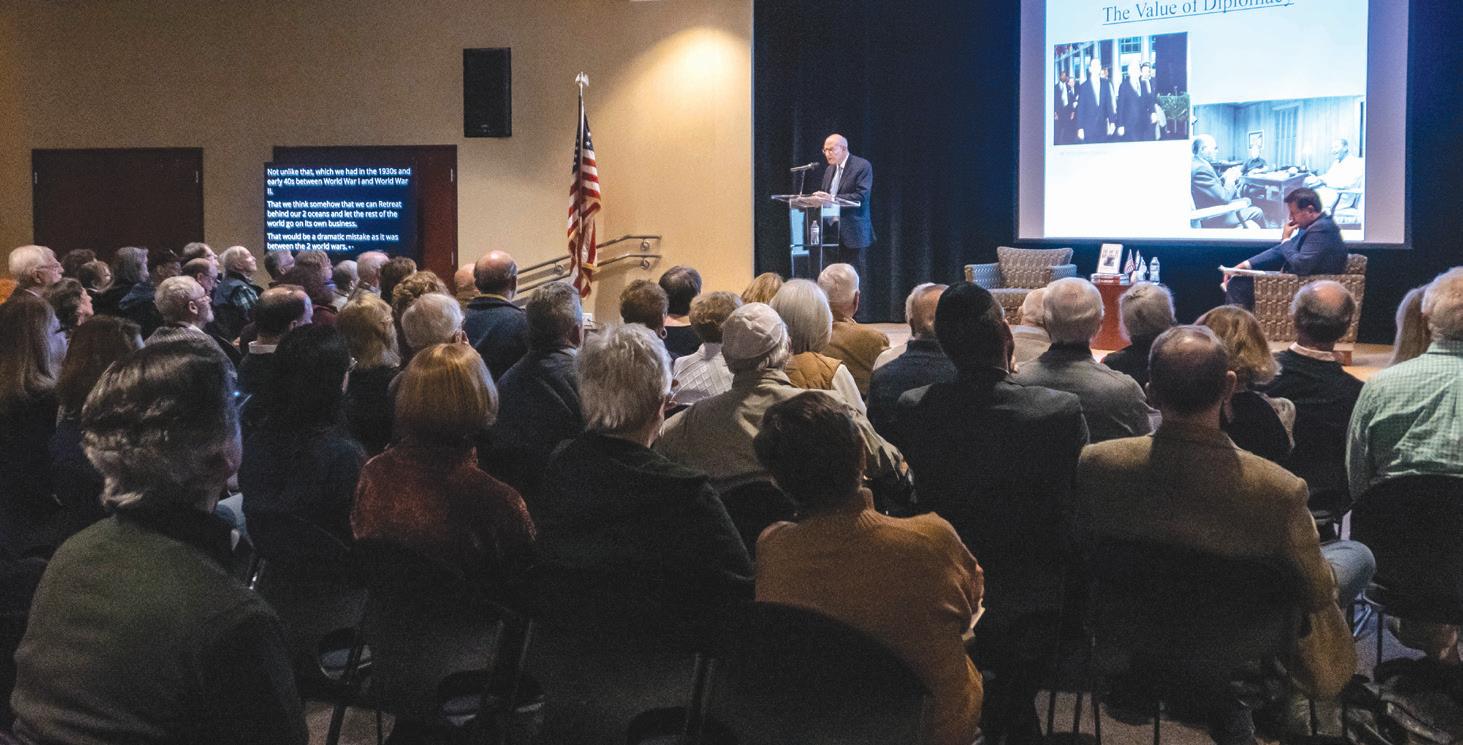
negotiation and how they apply to the current situation in the Middle East.
Drawing on insights from more than 130 interviews he conducted for the book, Eizenstat offered a unique perspective on international diplomacy.
Following his talk, City Councilman Joash Schulman engaged in a conversation with the Ambassador. Among the topics Schulman asked about were the complexities of Middle East peace efforts, what is required in addition to diplomacy for both the wars in Israel and Ukraine, and the potential roles of the U.S. and
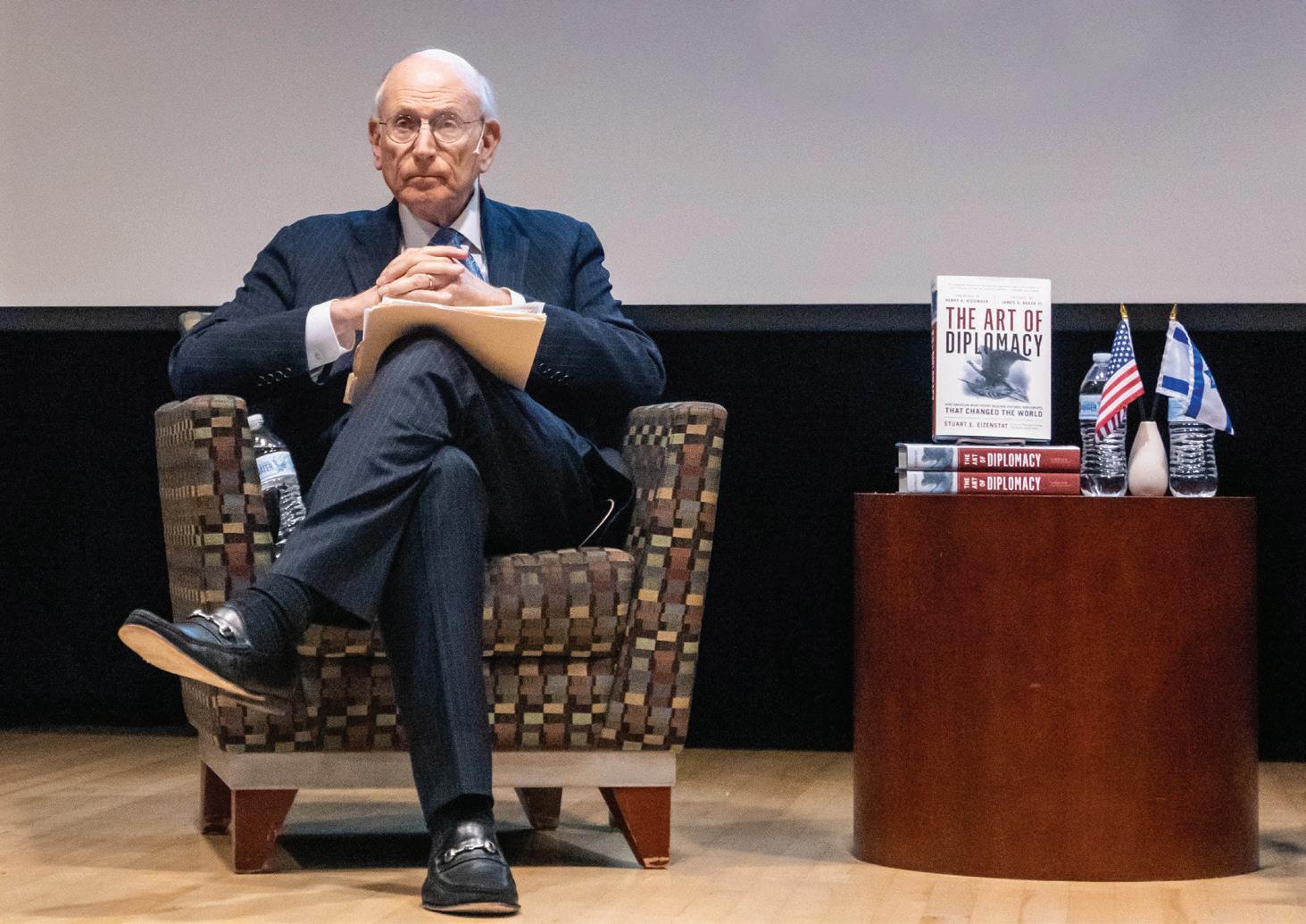
NATO in tackling the threats by Russia and Iran. Shulman also highlighted some of Eizenstat’s diplomatic victories and got an
inside look at what Ambassador Eizenstat thought and felt in those moments.
“It was a profound honor to welcome Ambassador Eizenstat to Virginia Beach,” says Schulman. “Hearing him share firsthand accounts of some of history’s most significant international negotiations, including the establishment of reparations for Holocaust victims and their families, was both enlightening and inspiring.”
This event was a reminder of the enduring relevance of diplomacy, continued engagement, and dialogue in creating a more secure and more peaceful world.
To learn about upcoming Israel Today events, visit JewishVA.org/IsraelToday or contact Nofar Trem at ntrem@ujft.org.

Sierra Lautman
Nearly 200 members of Tidewater’s Jewish community gathered at the Simon Family JCC for the first-ever Community Impact Day on the last Sunday of November. Partnering with 18 local non-profits and seven Jewish camps, participants raised more than $700 while fostering connections that will strengthen the community.
The event’s success was a result of strong partnerships. “I am so delighted by the incredible participation in our first-ever Community Impact Day,” says Alyson Morrissey, director of lifelong learning at Ohef Sholom Temple, and the initiator of the concept. “We are truly blessed here in Tidewater to have such strong partnerships within the Jewish community and beyond.”
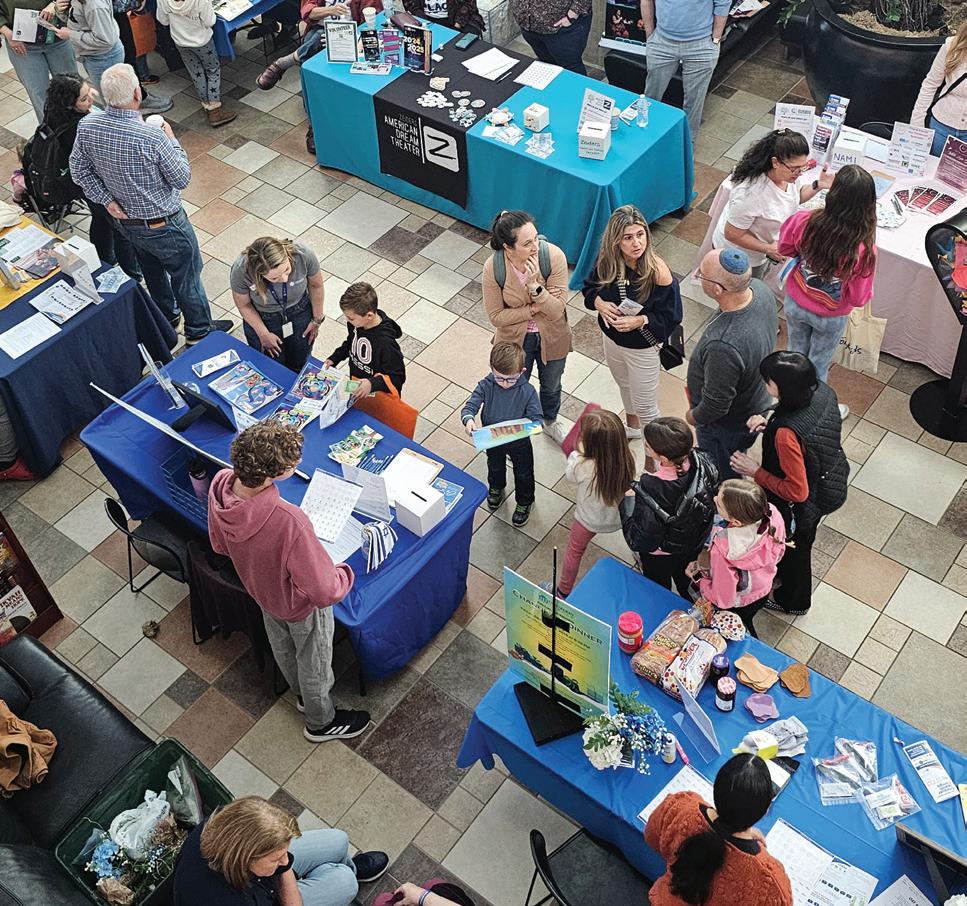
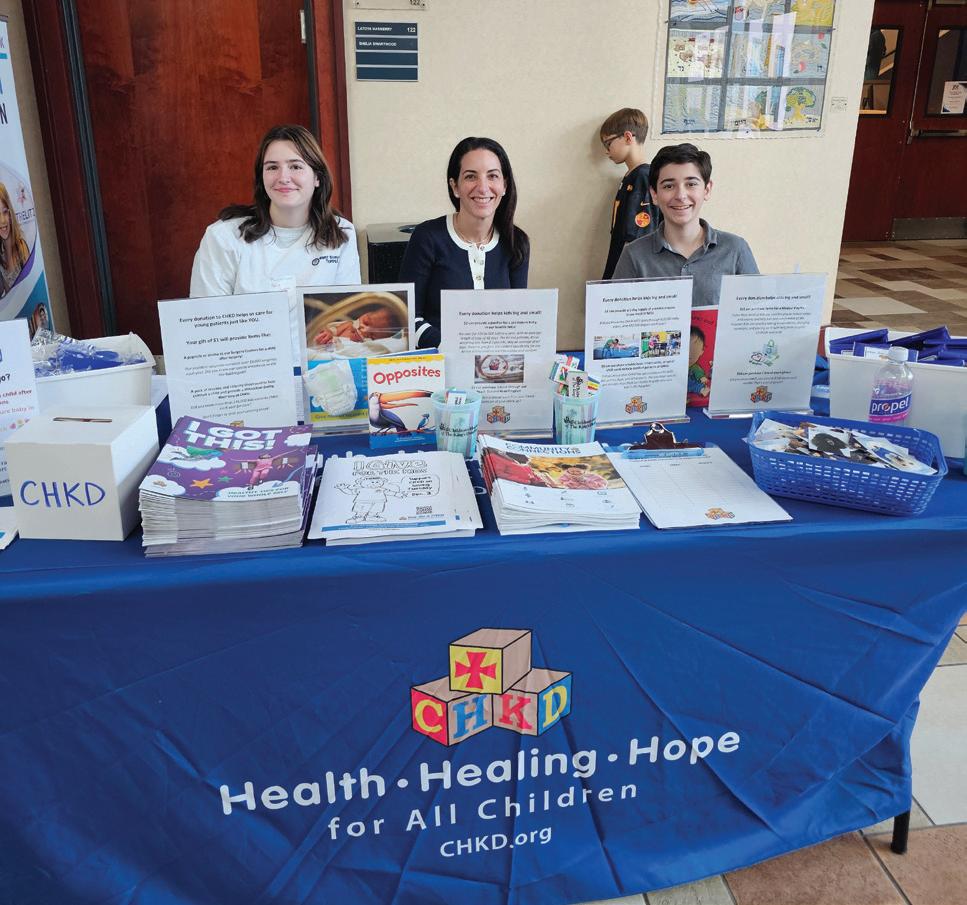
Jewish value that unites us all – Tzedakah.”
Religious schools from Congregation Beth El, Ohef Sholom Temple, and Temple Emanuel met at the JCC for the day so students could participate. “I loved having all the Sunday Schools and community members unite for one special day,” says Carin Simon, Strelitz International Academy’s director of advancement. “Community Impact Day was such an innovative approach to the one

The day featured a Mitzvah Mall – an interactive experience where families and children learned about nonprofits and chose where to donate. “What a wonderful way to gather the youngest of our community together to learn about the magic of mitzvah and to see how they can make a difference in the lives of others,” says Kelly Burroughs, CEO of Jewish Family Service of Tidewater.
Organizations such as Habitat for Humanity of South Hampton Roads engaged attendees in hands-on activities. “This incredible opportunity allowed us to connect with a younger audience,” says Kathleen Peterson, Habitat for Humanity’s executive director. “By donating or signing a stud that will become part of a Habitat home, they saw they could truly make a difference.”
The camp fair was another highlight. “It was incredible to see so many camps represented in one space, showing the breadth of options for our community,” says Dave Flagler, UJFT’s director of camp and teen engagement. He noted that families discovered programs they hadn’t known about. “We’re all here to support one another,” Flagler adds, highlighting the event’s spirit of collaboration, which included six Jewish overnight camps.
For many, the event stood out because of its intentionality. “I was blown away by the thoughtfulness of the kids,” says Brooke Rush, Jewish Family Service’s director of marketing. “It was clear the message of the day was getting through. One boy even said he wanted to make sure his money helped homeless people, which was so lovely.”
The collaborative atmosphere resonated with community members. “I am loving this so much,” says Bernie Mayer. “It reminds me of my childhood (in Cincinnati) at the JCC, with kids running around getting stamps on their cards and everyone here helping each other.”
With such a strong turnout and enthusiastic feedback, Community Impact Day is set to become a new annual tradition. As Ellen Hundley, a planning committee member, says, “It was a win-win for everyone—attendees, non-profits, and the entire Tidewater Jewish community.”
From young participants filling their mitzvah passports to families building new connections, Community Impact Day embodied the power of collective action. The event serves as a reminder of what is possible when people come together to learn, give, and grow.
For more information about community partnerships, learning opportunities, and family programming at United Jewish Federation of Tidewater, contact Sierra Lautman at SLautman@UJFT.org.

$60,000 $60,000
APPLY NOW FOR THE LARGEST SCHOLARSHIP IN JEWISH TIDEWATER UP TO $15,000/YEAR

ELIGIBILITY
The Stein Family College Scholarship is dedicated in loving memory of Arlene Shea Stein who was unable to finish college due to financial hardship.
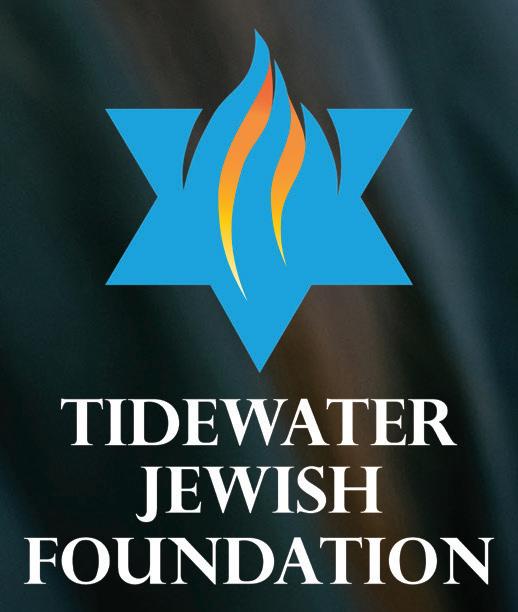
Administered through the Tidewater Jewish Foundation, this annual college scholarship is awarded to Hampton Roads Jewish students entering college. Applicants are evaluated on financial need, Jewish/community engagement, and academic potential. Learn more and apply now at foundation.jewishva.org

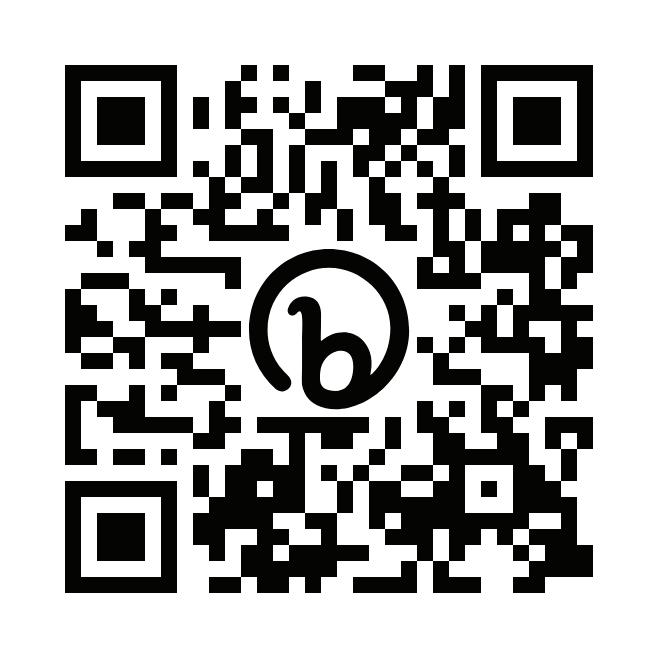

Cars started lining up down Corporate Woods Drive at 8 am on the Tuesday before Thanksgiving, eagerly waiting for the Jewish Family Service Food Pantry to begin its Thanksgiving food distribution.
Busy volunteers and staff were loading carts carrying bags of Thanksgiving turkeys and fixings, bagging onions, potatoes, and yams – preparing for one of the largest Thanksgiving food giveaways ever.
More than 120 people registered for food bags, each of which is meant to feed about four people. With more than 400 hungry Thanksgiving mouths to feed, JFS took on the challenge, thanks to help from the Tidewater Jewish community and other supporters. Funding for these programs comes from a variety of sources, including the Foodbank of Southeastern Virginia, United Jewish Federation of Tidewater, and private donors who make cash donations. Contributions of canned and boxed goods, turkeys, pies, and other food items were plentiful. In fact, two area congregations rented U-Haul trucks to carry the amount of food donated! Each of Strelitz International Academy’s classes selected a theme for which item they would collect, and many, many people held canned food drives at their places of worship or employment, or in their neighborhoods. “The generosity of our community is overwhelming,” says Emily Krouse, JFS special projects coordinator.
As cars streamed through the parking lot, volunteers and staff loaded their trunks with bags of food and a fresh turkey. “We love you all!” shouted one older woman, who is a regular to the pantry. “We wouldn’t make it without you!” “We love you back!” we replied. “It is days like these that make this
work so meaningful,” says Brooke Rush, JFS director of marketing. “Knowing that we are helping people come together with their families is so touching.”
As the flow of cars ebbed away, the rain began to slowly warn that it was time to pack up. Just as the last cart of food was brought in and one of the volunteers returned with the food pantry signs, a young man sheepishly approached. “Is it over?” he asked, looking around at the now empty tables. “I saw your signs earlier when I was waiting with my kids at the bus.” As he spoke, a shy looking woman appeared by his side. The couple lives with their children in the trailer park adjacent to the Sandler Family Campus. “We never been to a food pantry before,” she said. “How does it work?” Without skipping a beat, the family was provided with enough food for Thanksgiving and some special treats for the kids to tide them over until school on Monday where they usually eat breakfast and lunch.
“People think of the meals for the holidays, which are so important for creating traditions and celebrations,” says Rush. “But we also provide food throughout the year. Without the constant support of volunteers and donors, we couldn’t do this work.”
The food pantry is open on Tuesdays and Thursday mornings, and by appointment. Individuals in need of food assistance can make a confidential call to 757-321-2227. In addition to food items, families are also in need of laundry detergent, dish soap, toilet paper, paper towels, feminine hygiene products, shampoo, soap, and toothpaste.
Kelly Burroughs is the CEO for Jewish Family Service.
Yisroel Stein
The 2024 Tidewater Shabbat Project was once again a smashing success. The weekend began with the Travelling Chassidim leading Friday night services at B’nai Israel Congregation on Nov. 15. The synagogue came alive as everyone joined together in dance while singing the ancient songs of Kabbalat Shabbat.
The evening continued with a traditional Friday night meal held in Richel’s hall. More than 270 attended, filling the room to capacity. Before Kiddush was recited, fathers and mothers placed their hands on their children’s heads, giving them a special blessing reserved for Friday night.
Several spoke throughout the meal, including Rabbi Aharon Lipman from Toras Chaim, who shared a story for the children. Aron Slone shared a quick, ‘food for thought question,’ observing that around the room there were Jews from many different backgrounds and levels of practice. He asked, “What truly connects us to each other?” In response, hotly debated discussions ensued.
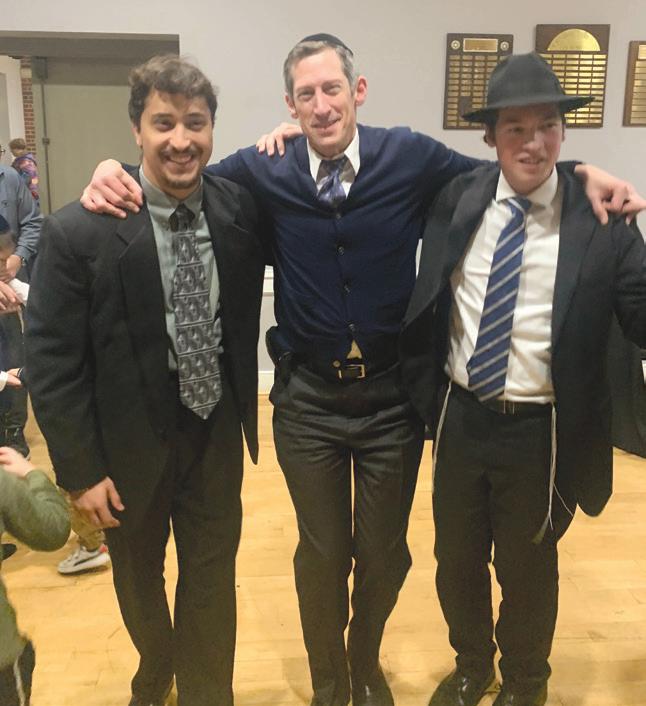
With the Travelling Chassidim present, it wasn’t too long before everyone got up from their seats, joined forces, and began singing and dancing, attracting many dancers and singers along the way.
As the evening ended, a surprise presentation was made in honor of Jon and Susan Becker for years of community involvement on so many different levels and for so many organizations. The Beckers have moved to Atlanta to be closer to their children. Everyone left in good spirits and on a full stomach.
On Saturday night, the community received a very special treat as the Travelling Chassidim performed a Carlebach-style Havdalah to perfection, followed by very lively dancing and singing. A keyboardist, two guitarists, and several singers contributed to the festive atmosphere. As the evening came to an end, people were talking about how this year’s Shabbat Project weekend was the best yet.
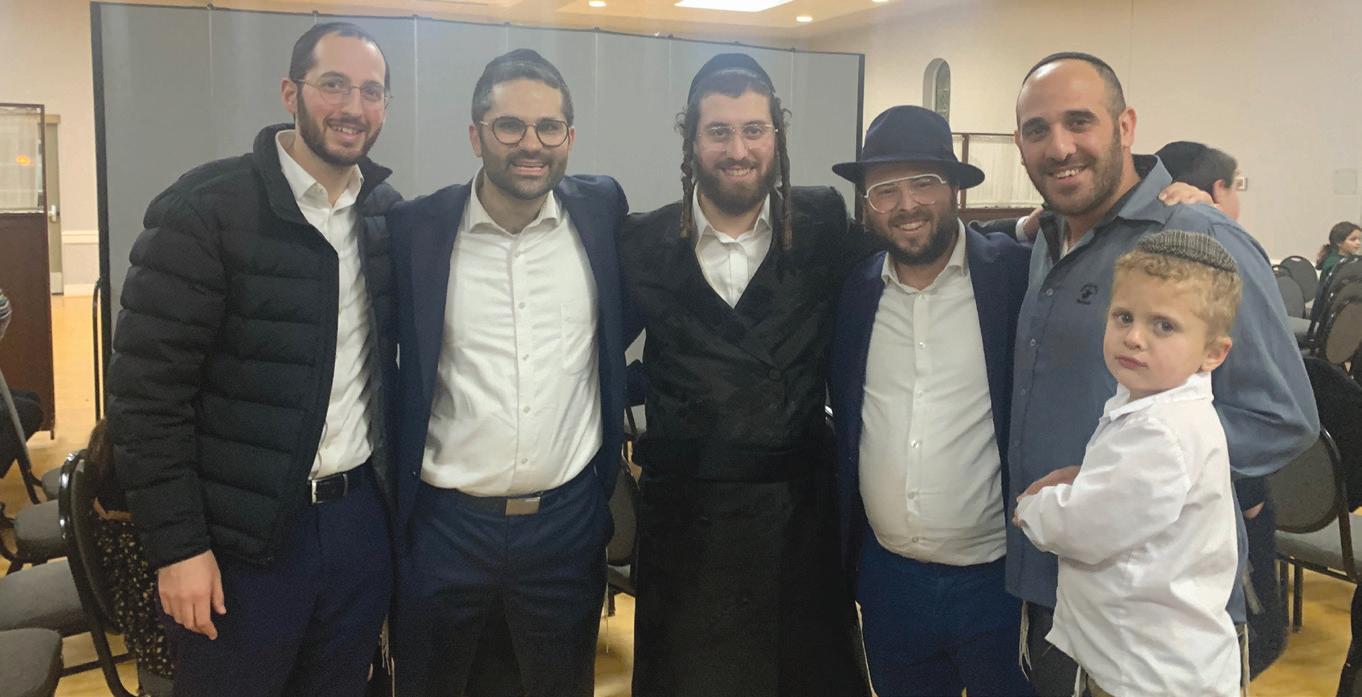
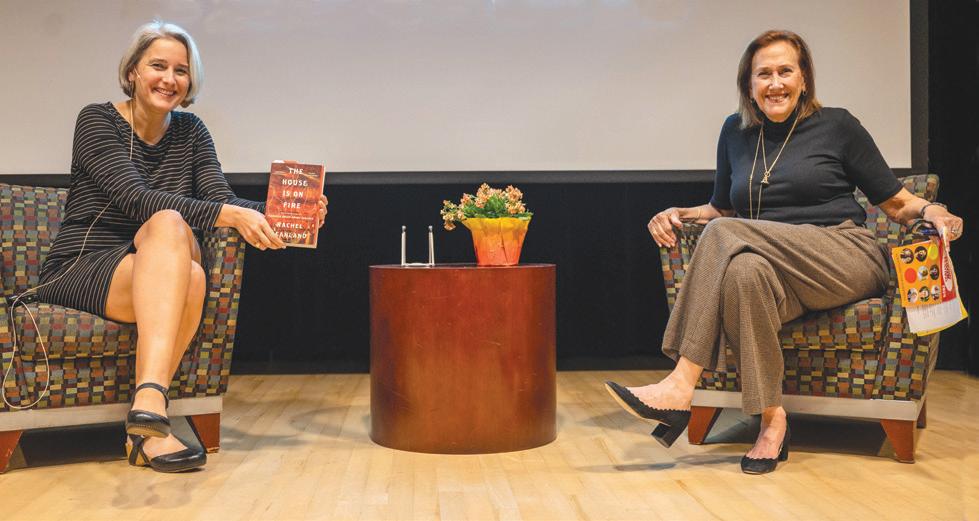
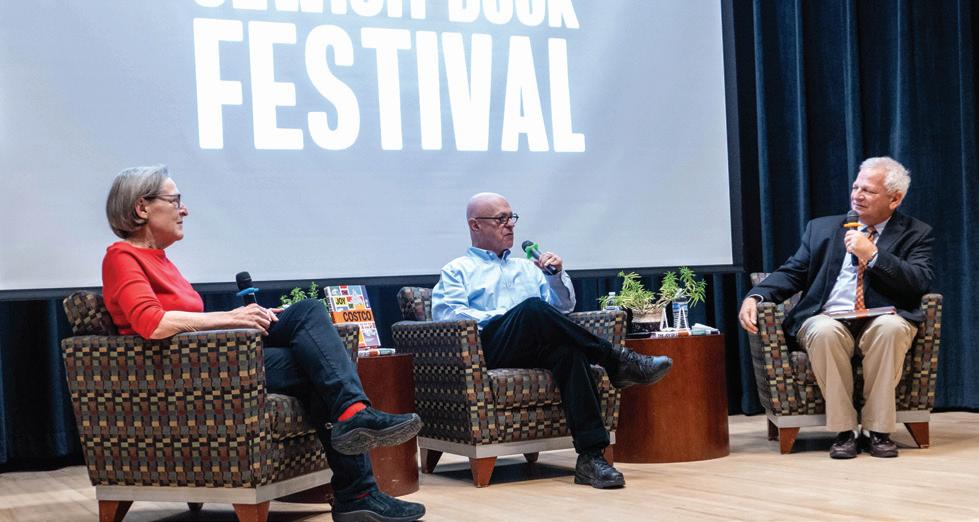
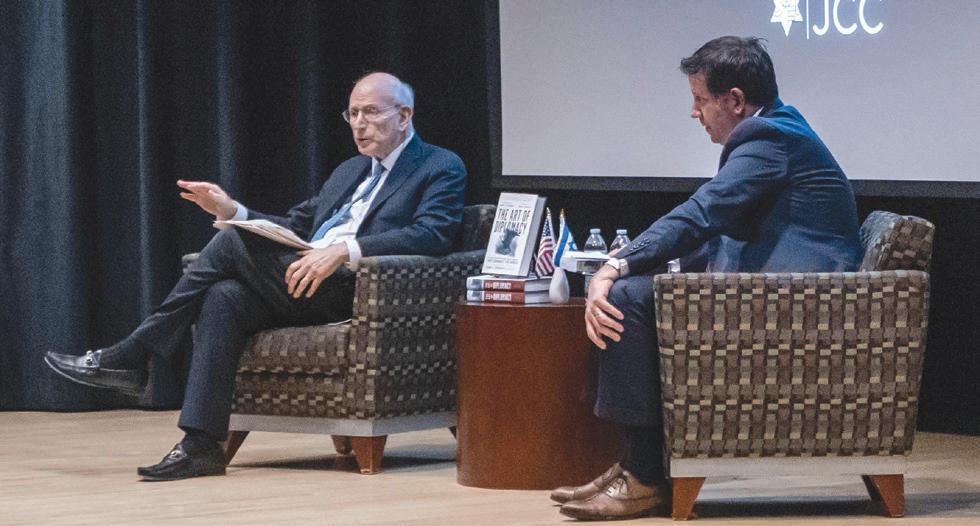
Hunter Thomas
Over six weeks, the 2024 Lee & Bernard Jaffe Family Jewish Book Festival brought together bestselling authors, emerging voices, and an audience hungry for stories.
The festival began with a look into history, as novelist Rachel Beanland transported attendees back to 1811 Richmond with The House is on Fire on October 28. Her storytelling and moderator Mona Flax’s thoughtful questions painted a picture of courage and chaos in the aftermath of America’s deadliest theater fire.
The following week, Holocaust researchers Elizabeth White and Joanna Sliwa shared the extraordinary story of Dr. Josephine Janina Mehlberg as told in their book, The Counterfeit Countess. At this lunchtime event, Carol Jason, a Holocaust Commission member, interviewed the authors who described Mehlberg’s daring deception; saving thousands from Nazi persecution by posing as a Polish aristocrat. Attendees
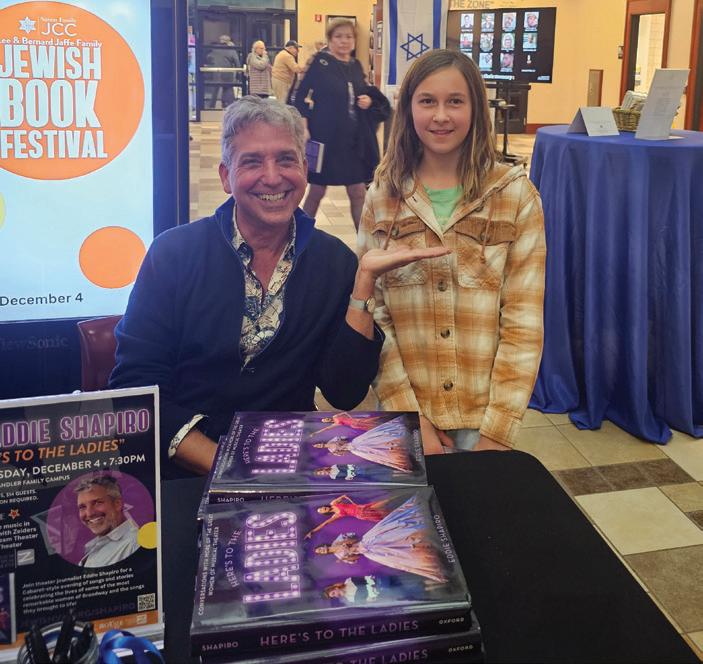
walked away not just moved but inspired to confront today’s injustices with similar courage.
The festival moved into the later 20th century and into the 21st on November 18 when Ambassador Stuart Eizenstat spoke with Virginia Beach City Councilman Joash Schulman about the behind-the-scenes accounts of the world-changing negotiations he describes in The Art of Diplomacy. His firsthand stories of high-stakes talks—spanning from the Vietnam War to the Iranian Nuclear Accord—left the audience with a newfound appreciation for the intricate art of global diplomacy. Read more about this event on page 35.
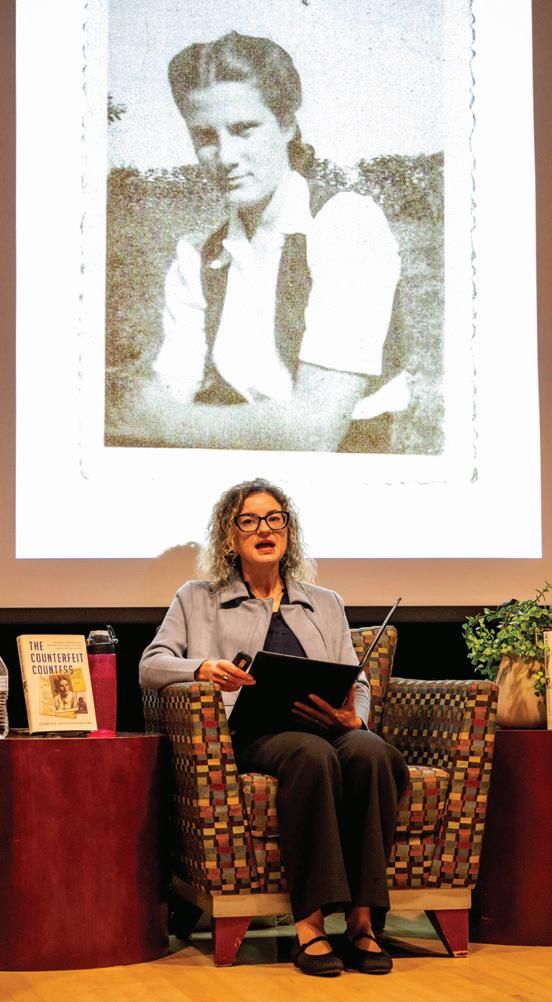
For something lighter but equally engaging, The Joy of Costco by David and Susan Schwartz was a hit on November 20. Who knew a warehouse retailer could spark so much fascination? From their behindthe-scenes tours of more than 250 Costco locations to quirky facts (like
Costco selling more hotdogs than all Major League Baseball stadiums combined), the Schwartzes and moderator Joel Rubin had everyone chuckling — and rushing to renew their Costco memberships.
And who could forget the festival’s grand finale? On December 4, theater journalist Eddie Shapiro brought Broadway to Tidewater with Here's to the Ladies. The cabaretstyle event, which featured live music in partnership with Zeiders American Dream Theater and ROÙGE Theater Reinvented, was a dazzling tribute to the iconic women of musical theater. With heartfelt stories and powerful performances, it was a night that left everyone singing as they walked out the door.
The 2024 Lee & Bernard Jaffe Family Jewish Book Festival wasn’t just about books—it was about people, stories, and the power of words to transform lives. The countdown to 2025 is already underway. Be there. Be inspired.
For more information and updates, visit JewishVA.org/BookFest.
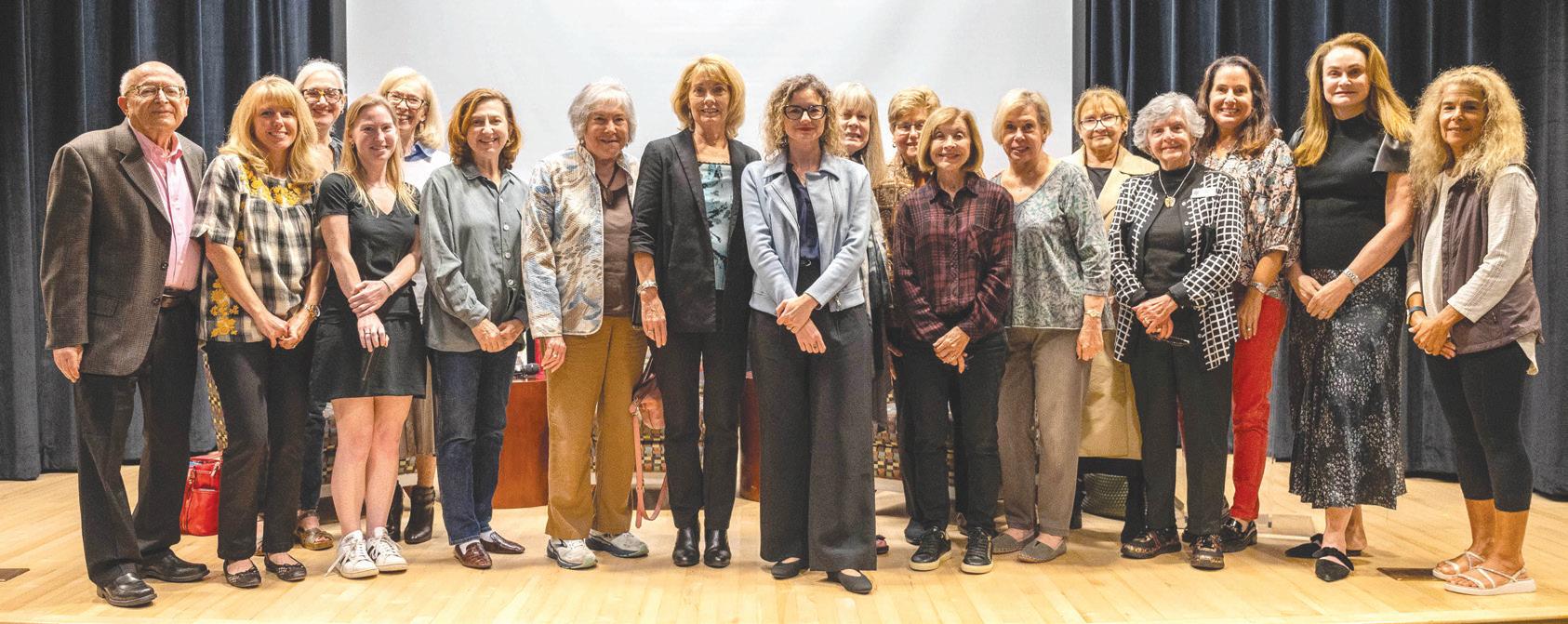
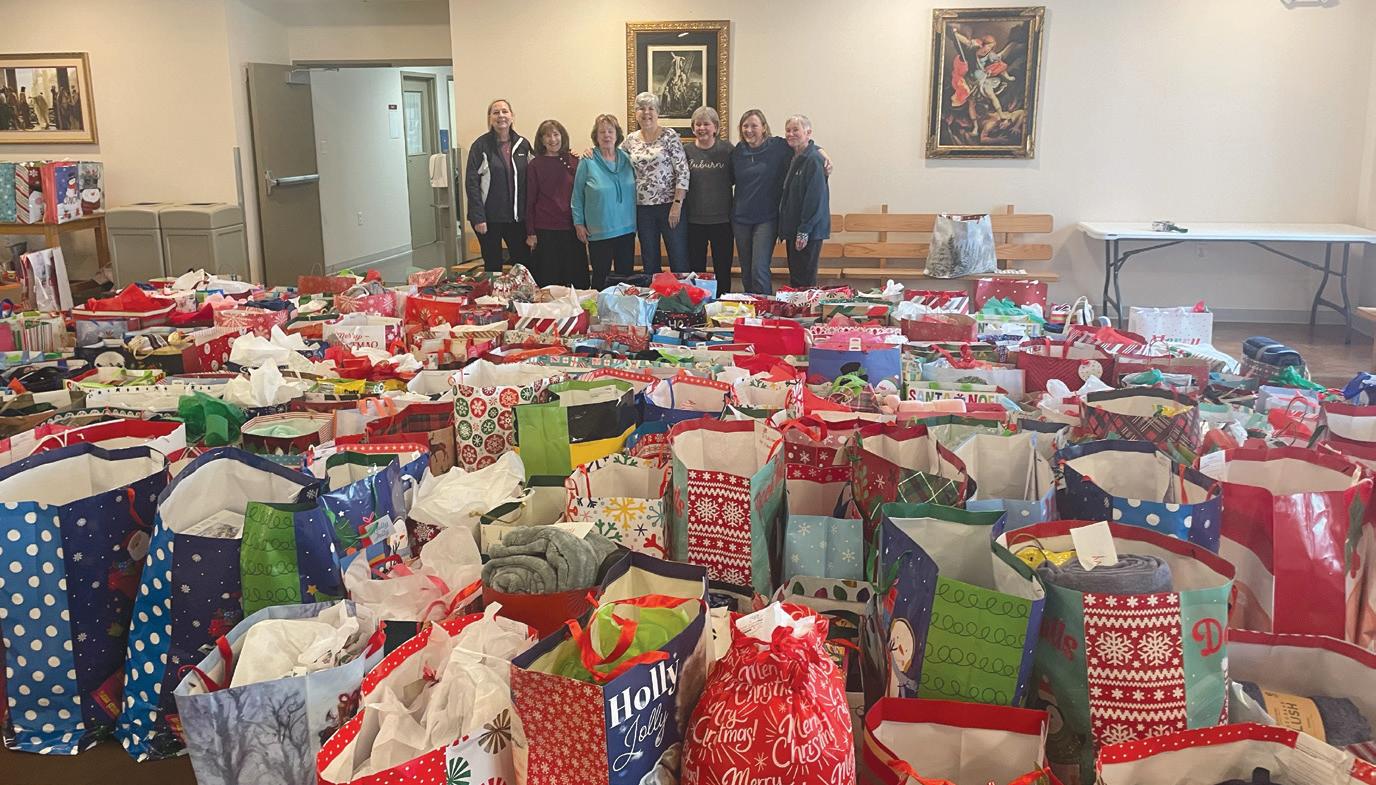
For the eighth consecutive year, clients at Jewish Family Service of Tidewater have been adopted by members of the Catholic Church of St. Stephen in Chesapeake.
Carol Ehrbar, who coordinates this project for St. Stephen each year, helped collect more than 3,000 gifts for JFS clients in the Personal Affairs Management (PAM) Program. People in the program are often indigent and have no friends or family to care for them.
JFS rented a U-Haul to bring the gifts to its offices to sort. In addition to the U-Haul, five cars were filled with bags of gifts.
PAM clients are at least 18 years old, and usually have an intellectual, developmental, or mental health condition that prevents them from being able to make decisions on their own. JFS is appointed guardian for these folks.
From a ‘tree’ of wish list items for specific clients, church members selected a list and then purchased those items.
The case workers who had completed the wish lists with their clients, will deliver them the gifts.
“In addition to all these gifts, we have the knitted and quilted items from the knitters group and Ohef Sholom’s Quilt Group—enough so that everyone gets something to help them know they were not forgotten,” says Kelly Burroughs, JFS CEO.
“This interfaith project shows the meaningful impact of collaboration. Thank you, St. Stephen’s Catholic Church!”
Wednesday, January 29, 7 am – 4 pm Sandler Family Campus to Richmond
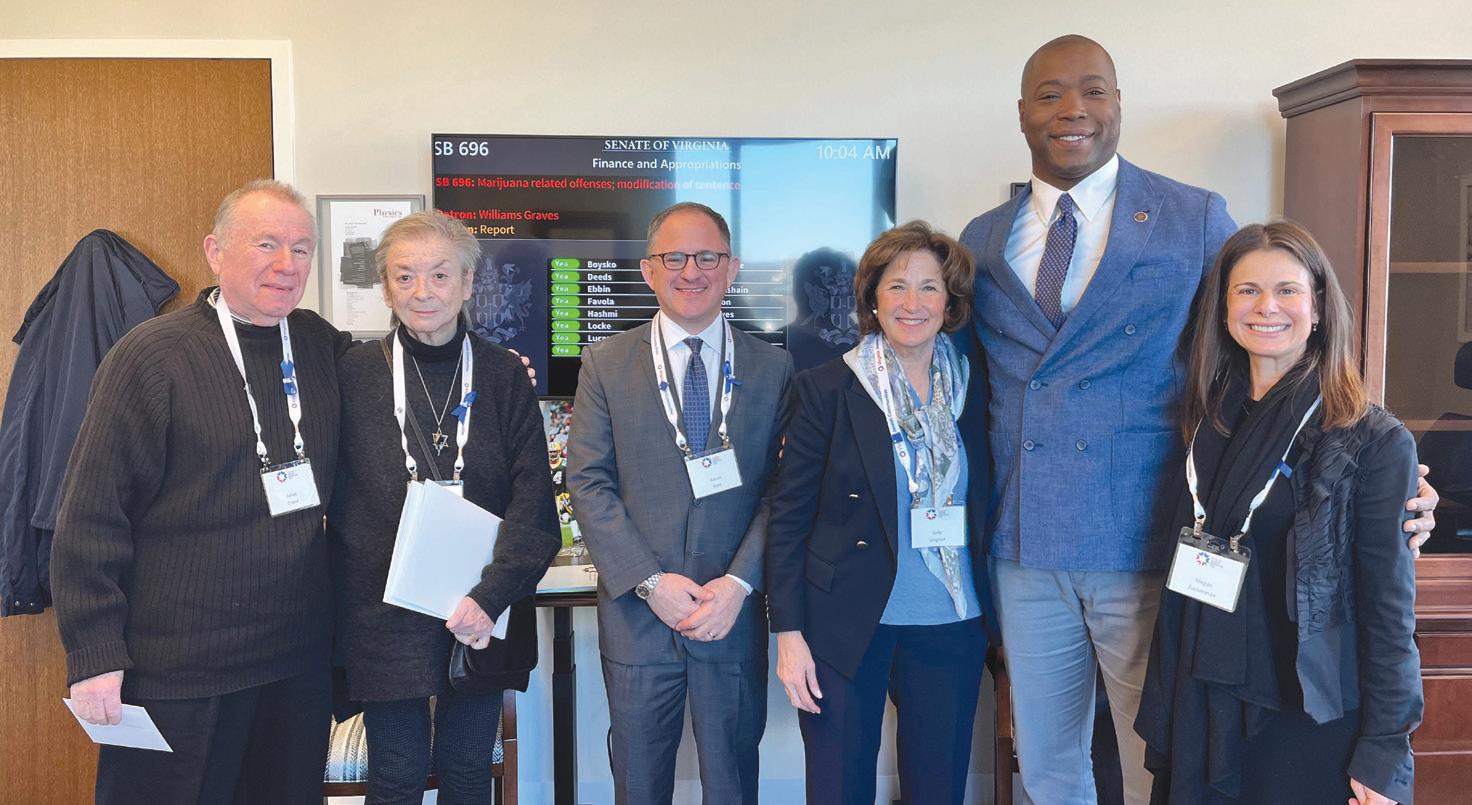
Robin Mancoll
Date with the State, also known as Virginia Jewish Advocacy Day, provides an opportunity for the statewide Jewish community to come together to raise awareness around topics of importance such as countering antisemitism, maintaining funding for Jewish institutions, and ensuring that the Virginia Israel Advisory Board continues to have the funding to help Israeli companies build and grow their operations in the Commonwealth providing tax revenue and jobs across the state, etc.
Multiple reasons exist to attend this important day in Richmond. Virginia Jewish Advocacy Day:
• Provides attendees the time and place to connect with their local legislators on issues affecting the Jewish community.
• Allows attendees – Jewish community members and allies – to make a visible impact in the state capitol.
• Provides Jewish community advocates from across the Commonwealth a forum to learn and share with one
another over lunch.
• Educates and motivates on important issues facing the Jewish community and encourages grassroots advocacy.
• Provides a forum for Virginia’s highest elected officials to give remarks to Jewish community advocates, and for the officials to see the strength of the statewide Jewish community.
Join members of Jewish Tidewater to advocate for the community – even just by being there. Each person’s presence demonstrates the strength and significance of the community’s collective voice.
A bus leaves from the Sandler Family Campus at 7 am. $54 includes kosher lunch and helps defray the cost of transportation. For more information about how to join this year’s delegation or to register, visit JewishVA. org/DWTS or contact Julie Kievit, JCRC program coordinator, at jkievit@ujft.org.
Robin Mancoll is United Jewish Federation of Tidewater’s chief program officer and Jewish Community Relations Council’s senior director.
Sierra Lautman
The Great Jewish Bookshelf is ready to inspire 2025 reading journeys, starting with an exceptional lineup for January. Beginning Jan. 1, subscribers will choose their first book from a selection of titles that touch on Jewish identity, history, and imagination. Subscribers will have the opportunity to add one copy of a bonus book, It Takes Two to Torah by Abigail Pogrebin and Rabbi Dov Linzer, for just $10.
1. The Letter in the Scroll by Rabbi Jonathan Sacks
on the struggles of familial relationships, particularly between mothers and daughters, and asks the question: ‘How do you ask for forgiveness?’ More importantly, it challenges us to reflect on whether we can offer forgiveness when it’s needed most.”
3. Pumpkinflowers: A Soldier’s Story of a Forgotten War by Matti Friedman

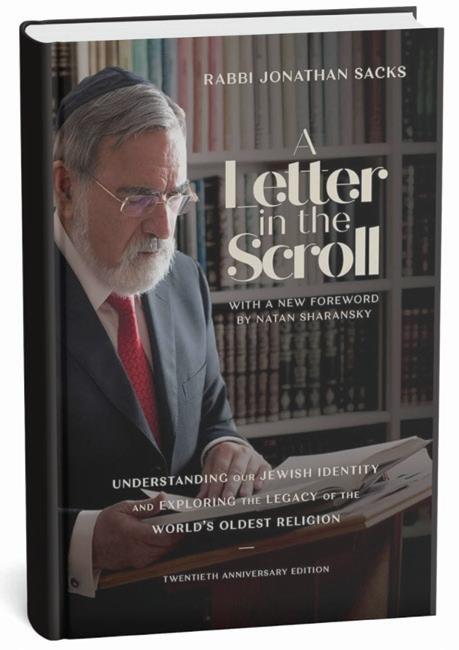
Readers are invited to explore what it means to be part of the Jewish story in The Letter in the Scroll. This passionate work argues for embracing one’s Jewish spiritual inheritance and personal link in the chain of Jewish history. Craig Schranz, a member of the Jewish Innovation steering committee and facilitator of Tidewater’s Rabbi Sacks Community Book Club, calls it, “A tour de force that you won’t want to put down!!! If there is one book you could pass on to your children to instill what it means to be and live as a Jew, this is it. Rabbi Sacks passionately argues for each of us to embrace our spiritual inheritance and forever be a letter in the scroll.”
2. Mother Doll by Katya Apekina
This intriguing novel blurs the boundaries between the real and the supernatural, weaving a tale about familial relationships, forgiveness, and the mysteries of life and death. Hilary Truman, a member of the Great Jewish Bookshelf 2025 selection committee, says, “Have you ever wondered what lies beyond death or wished you could speak with someone who has passed on? What if one day, your long-dead great-grandmother called just to chat?
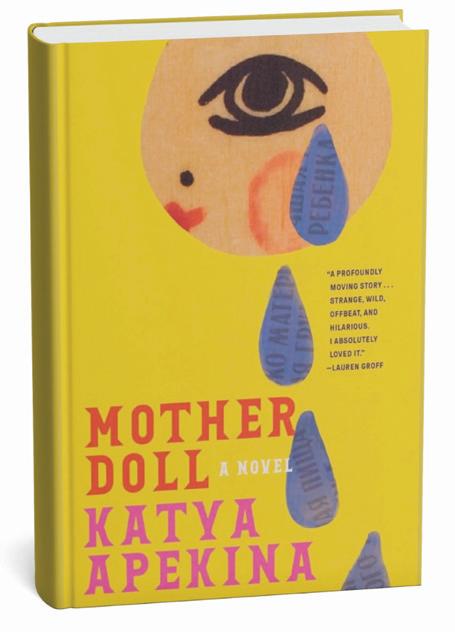
In this book, readers are invited to explore the boundary between the real and the supernatural, blending life’s hardships with an otherworldly twist. It touches
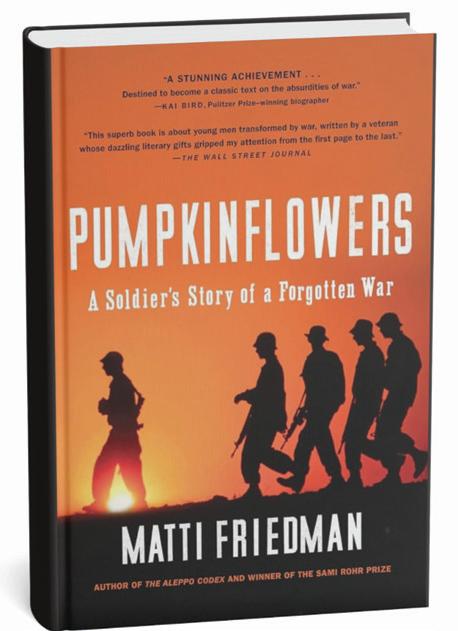
‘KNITTING FOR OTHERS’ HELPS



How the selection process works


Matti Friedman’s powerful memoir takes readers into the heart of Israeli life and the complexities of its conflicts. Reflecting on his experiences as a soldier, Friedman sheds light on the pain, joy, and determination that shape Israel’s story. Rabbi Michael Panitz of Temple Israel recommends the memoir, writing, “If you want to get a feel for the true dynamics of being an Israeli—the pain as well as the joy, the frustration of facing implacable foes and the honesty to discuss mistakes and seek to learn—then Pumpkinflowers is a good place to start. Matti Friedman speaks from experience and shares the wisdom he gained from thinking hard about the realities of his country’s predicament. Read it without preconceptions, because this is a book designed to make you think.”










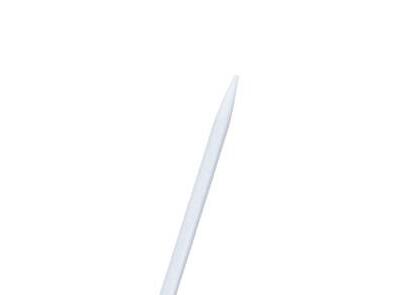
Don’t miss the special bonus book!

Subscribers to the Great Jewish Bookshelf can make their first selection starting January 1. Every two months, subscribers receive an email with a curated list of titles; they who can choose the book that resonates most with their interests or explore something entirely new. Each book is carefully chosen to deepen subscribers’ connection to Jewish culture, heritage, and ideas.


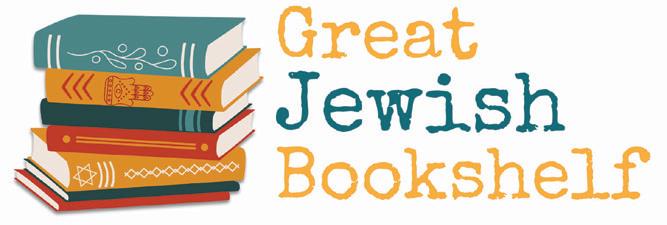





AM – 12




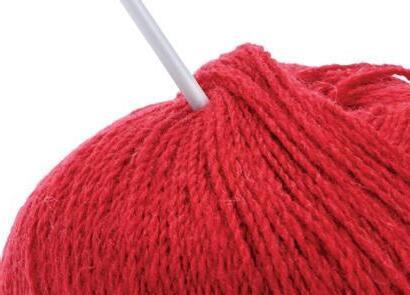

Those subscribing before January can add It Takes Two to Torah for just $10. This exclusive offer is available only to subscribers and promises to enrich an understanding of Torah through engaging insights and practical wisdom.
Visit JewishVA.org/GJB for more information and to subscribe.

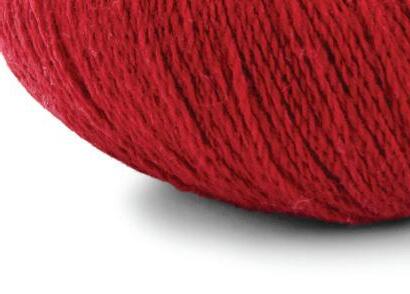



A mighty group of knitters meets every week to create beautiful blankets, scarfs, and hats to donate to Jewish Family Service to be distributed to those who need an extra bit of warmth.

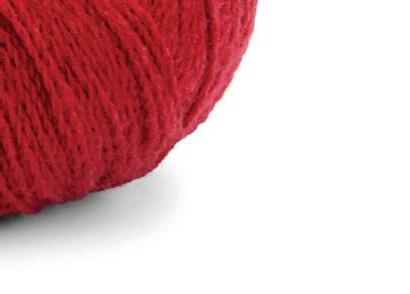
The group welcomes knitters of all skill levels, proclaiming in unison, “We will teach you!”
Kelly Burroughs, CEO at JFS, also extends “a big thanks to the OST Quilters group!”
Both groups, she says, handmake hundreds of items throughout the year and donates them to JFS for the benefit of its clients.
Tuesday, January
Nofar Trem
On the morning of October 7, Shahar Dekel and his now wife were fortunate to be away from their home in Kibbutz Nahal Oz. Many of their friends and neighbors, however, were not so fortunate and instead were killed or taken hostage. With nothing but the clothes on his back — flipflops, shorts, and a T-shirt — and his trusted camera, Dekel arrived at an IDF base on October 8 to begin his reservist duty.
Since the start of the war, Dekel has served two terms of reserve duty, both in Gaza and Lebanon. Every photograph he has taken on the frontlines tells a distinct story, providing a window into the personal moments,
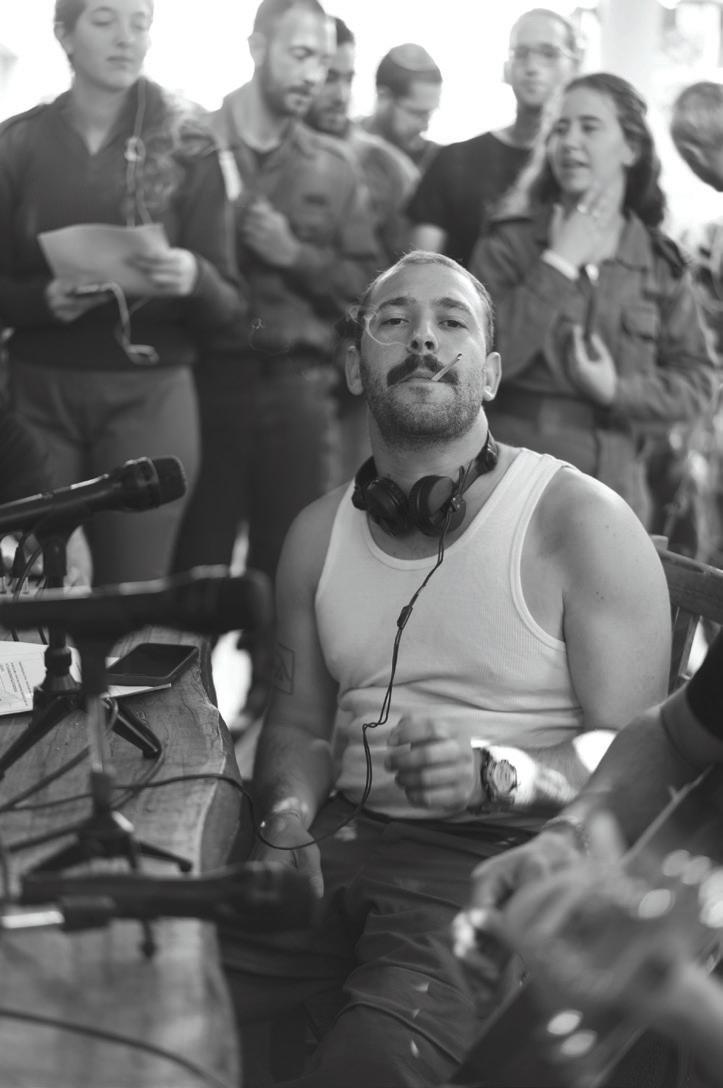

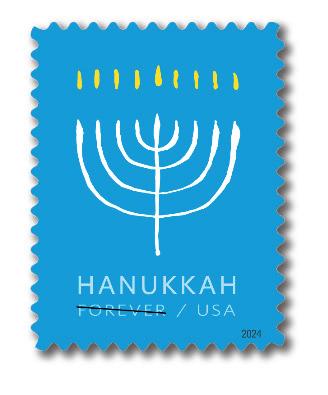
struggles, and victories of those putting their lives on the line to protect Israel and its people.
Hear from Dekel and experience an unfiltered view of the battlefield, as well as the humanity within the war, as part of the 14th annual Israel Today series presented by the Jewish Community Relations Council of United Jewish Federation of Tidewater, Simon Family JCC, all area synagogues, and Community Partners.
Through Dekel’s lens, viewers see the ordinary moments of shaving, showering, and brushing teeth — alongside more profound experiences such as weddings, prayers, and injury. His photography captures a sense of shared humanity. As he describes it, “We are first people,


and then soldiers. The moments I cherish most are not those of the heroic soldier or the tank, but of the humanity that exists within the war.”
Dekel says he hopes that these photos will allow the world to see through his eyes. “We are just simple people who want to return home to our friends, children, and wives.”
Dekel’s exhibit Through My Eyes: A War Diary will be featured in the Leon Family Gallery on the Reba and Sam Sandler Family Campus throughout January and February.
Free and open to the community with pre-registration required, RSVP to JewishVA.org/IsraelToday or contact NTrem@ujft.org.
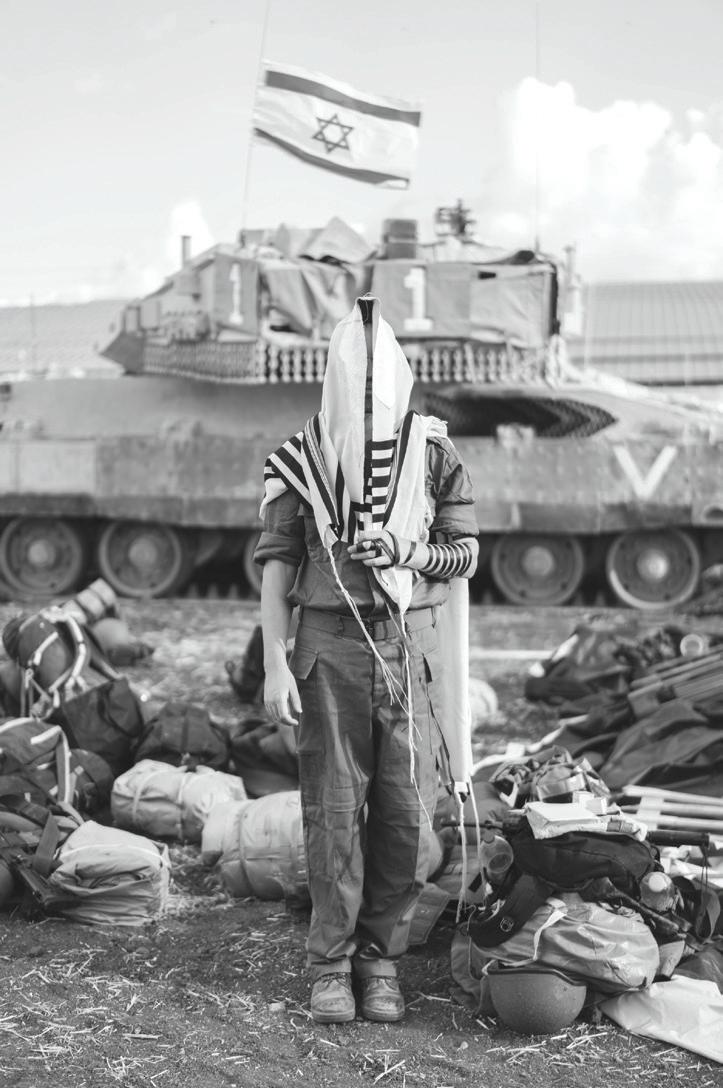
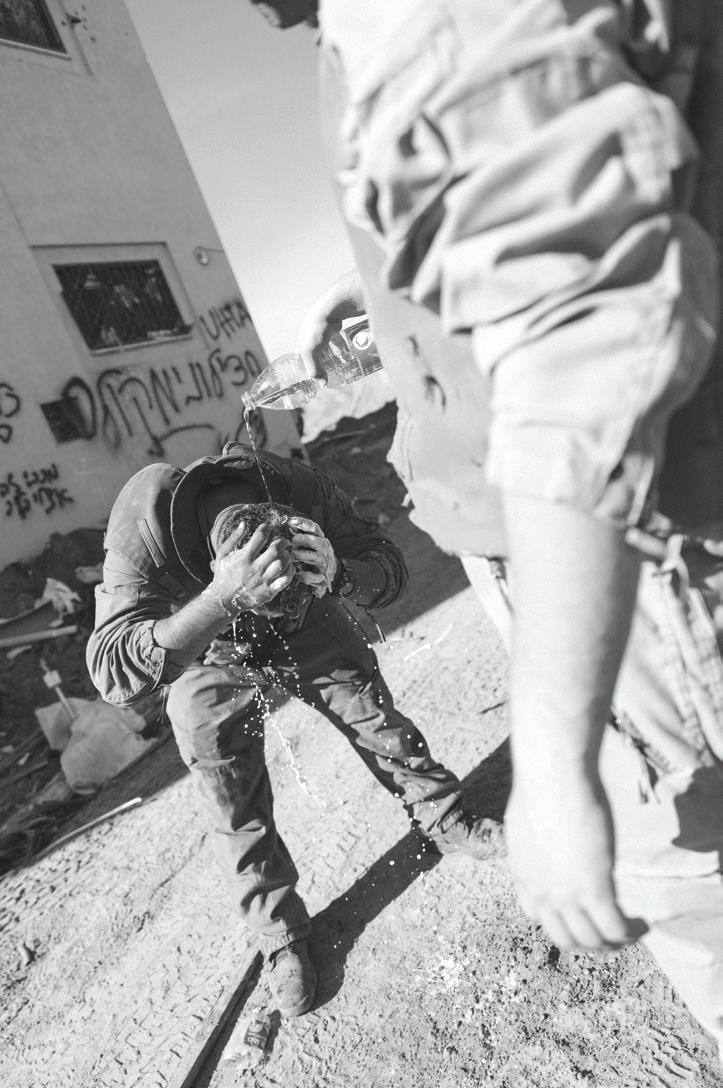
The United States Postal Service’s new Hanukkah stamp celebrates the holiday with an image of a hanukkiah, the nine-branch candelabra used on Hanukkah.

Designed by art director and stamp designer Antonio Alcalá, the image was created in ink; the irregular lines of the design are intended to portray a more human presence. Alcalá digitally added an ocean blue background and a white hanukkiah. The nine flames are illustrated in yellow.
The Hanukkah 2024 stamp is being issued as a Forever® stamp. This Forever stamp will always be equal in value to the current FirstClass Mail® one-ounce price.
The last celebrated release of a Hanukkah stamp was in 2022, featuring the work of American Judaica artist Jeanette Kuvin Oren.
THROUGH DECEMBER 31, FRIDAY - TUESDAY
Camp JCC Summer 2025 Early Bird Special. Register now to receive a discount on all Camp JCC Summer Camp sessions and be entered to win a Camp JCC Swag Store gift card. (Last Blast not eligible for early bird pricing). Information and registration: www.campjcc.org or contact Dave Flagler at Dflagler@ujft.org.
DECEMBER 18, WEDNESDAY
Seniors Club Annual Holiday Party with White Elephant Gift exchange (up to $10). Open to all JCC gamers and club members. 12 pm. YNOT PIZZA Landstown Commons. RSVP: Mia Klein at MKlein@UJFT.org. Seniors Club meets the third Wednesday of each month at the Simon Family JCC and is for adults 55+ looking to add education, culture, and connections to others and the Jewish community.
DECEMBER 23 – JANUARY 3, MONDAY - FRIDAY
Camp JCC School Days Out: Winter Camp. Join Camp JCC when school is not in session. Select any single day or choose from a 5- or 10-day bundle. K - 5th graders. (No camp on December 25 or January 1). 9 am - 4 pm. Extended care option, 8 am - 6 pm for additional fee. Information and registration: www.campjcc.org or contact Dave Flagler at Dflagler@ujft.org.
JANUARY 7, TUESDAY
Yiddish Club is a vibrant hub for preserving and promoting the Yiddish language and its rich heritage. Open to the community, it meets the first Tuesday of each month. 1 pm. Free. Sandler Family Campus. Information and to RSVP: JewishVA.org/YiddishClub or contact Mia Klein at MKlein@ ujft.org or 757-452-3184.
BEGINNING JANUARY 7, TUESDAYS
Melton: Genesis (Bereshit) Part 1 - From Adam to Abraham: The First 20 Generations. Over 10 sessions, Alene Jo Kaufman will explore the first book of the Torah and discuss multiple universal narratives which serve as the foundation of Judasim. 12 pm. $295, scholarships available. Sandler Family Campus. Information and registration: JewishVA. org/Melton or contact Sierra Lautman at slautman@ujft.org.
JANUARY 8, WEDNESDAY
RoundTable Conversation: What’s your take? Agree to Disagree. Discuss, don’t dismiss. United Jewish Federation of Tidewater and Simon Family JCC invite curious members to discuss timely topics. 1 pm. Sandler Family Campus. Information and registration: www.Jewishva.org/RoundTable or contact Mia Klein at MKlein@UJFT.org.
JANUARY 12, SUNDAY
Sunday Fun Days are open to Simon Family JCC members, synagogue members, PJ Library families, SIA families, YAD members, and Camp JCC families. 1 pm. Free. Sandler Family Campus. Information and registration: JewishVA.org/PJLibrary or contact Sarah Cooper at cooper@ujft.org..
JANUARY 14, TUESDAY
An Unfiltered Look with Israeli photographer and IDF Reservist Shahar Dekel, who will offer a glimpse into Israel’s war against Hamas that many have not seen or heard before. Dekel’s photographs will be on exhibit in the Leon Family Gallery at the Simon Family JCC in January and February. Presented by the Jewish Community Relations Council of United Jewish Federation of Tidewater, Simon Family JCC, and Community Partners’ 14th annual Israel Today series. 7:30 pm. Free. Sandler Family Campus. Information: JewishVA.org/IsraelToday. See page 42.
JANUARY 18, SATURDAY
Kids Night Out. Members and guests can drop off their children for a night filled with crafts, games, snacks, and swimming (children who can swim without a floatation device). Lifeguard supervised. For those 4 – 12 years old. Pack a kosher-style dinner. 5 - 9 pm. Free. Sandler Family Campus. Information and registration: https://jcc.jewishva.org/kids by 4 pm on Friday, January 17.
JANUARY 20, MONDAY
Camp JCC School Days Out: MLK Jr. Day. This day can be selected individually or as a part of any 5- or 10-day winter or spring camp bundle. K-5th graders. 9 am - 4 pm. Extended care option, 8 am - 6 pm for additional fee. Register by December 31 and enter to win a Camp JCC Swag Store gift card. Information and registration: www.campjcc.org or contact Dave Flagler at Dflagler@ujft.org.
JANUARY 29, WEDNESDAY
Virginia Jewish Advocacy Day. The Jewish Community Relations Council of United Jewish Federation of Tidewater travels to Richmond for the annual Date with the State. This event has proven to be a powerful forum to effectively communicate with General Assembly members about issues of importance to the Jewish community. 7 am - 4 pm; leaving from the Sandler Family Campus. $54 includes kosher lunch and helps defray the cost of transportation. For information about how to join this year’s delegation or to register: JewishVA.org/DWTS or contact Julie Kievit, JCRC program coordinator, at jkievit@ ujft.org. See page 40.
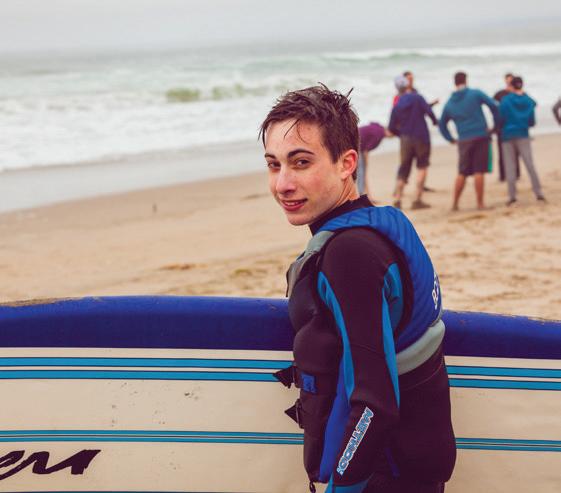

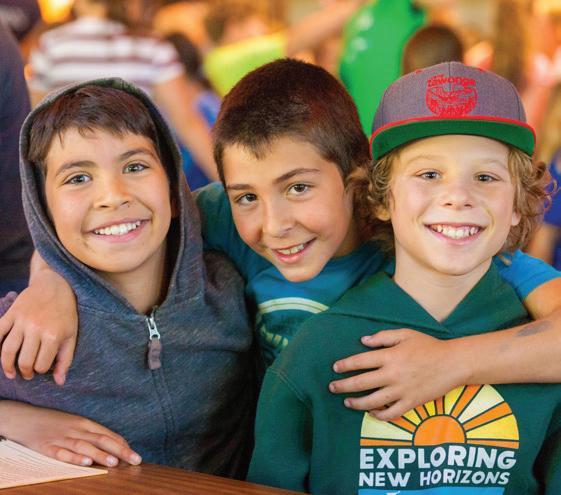
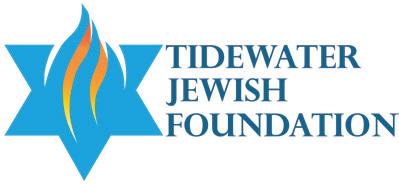

UP TO $1,000 OFF CAMP!
Tidewater Jewish Foundation is proud to partner with the Foundation for Jewish Camp’s One Happy Camper program. If your child is a first-time camper, you may be eligible for a need-blind grant of up to $1,000 off!
With 150+ traditional and specialty camps to choose from, there is a perfect camp for every child.
Apply Now for 2025 foundation.jewishva.org/ one-happy-camper

Andrew Silow-Carroll
(JTA) — In the 1970s, my parents and all the Jewish parents I knew had what I came to call the Jewish Bookshelf. On it sat The Source by James Michener, Exodus by Leon Uris, The Chosen by Chaim Potok, Portnoy’s Complaint by Philip Roth, This Is My God by Herman Wouk and World of Our Fathers by Irving Howe.
The first four were novels, shelved here in ascending order from lowbrow to highbrow. Wouk’s book is nonfiction, part memoir and part how-to about living an observant Jewish life. Howe’s is a classic history of Jewish immigration from Eastern Europe.
Whenever I share this list with boomer friends, they nod in recognition, and a certain nostalgia for a time when Jews — or certainly suburban American Jews of the postwar era — were literally on the same page. The era that also gave us a synagogue building boom, the ever-more-lavish bar and bat mitzvah and the rise and fall of the Jewish Catskills was a middle-class, Ashkenazi monoculture. Our
parents shared reading tastes in ways that seem to be unthinkable today, when media culture, like Jewish culture, has splintered. I’d be hard-pressed to pick five Jewish books from the last decade or two that I am confident could be found on the shelves of a present-day cohort of middle-aged Jews.
How that Jewish literary monoculture came to be and how it crumbled has become the subject of academic study, and of at least three books in the past year alone. The one that most directly focuses on the middle-class tastes of Jews like my parents is Postwar Stories: How Books Made Judaism American, by Rachel Gordan. An assistant professor of religion and Jewish studies at the University of Florida, Gordan examines what Jews were reading and writing in the period immediately following World War II. She’s less interested in the literary heavy

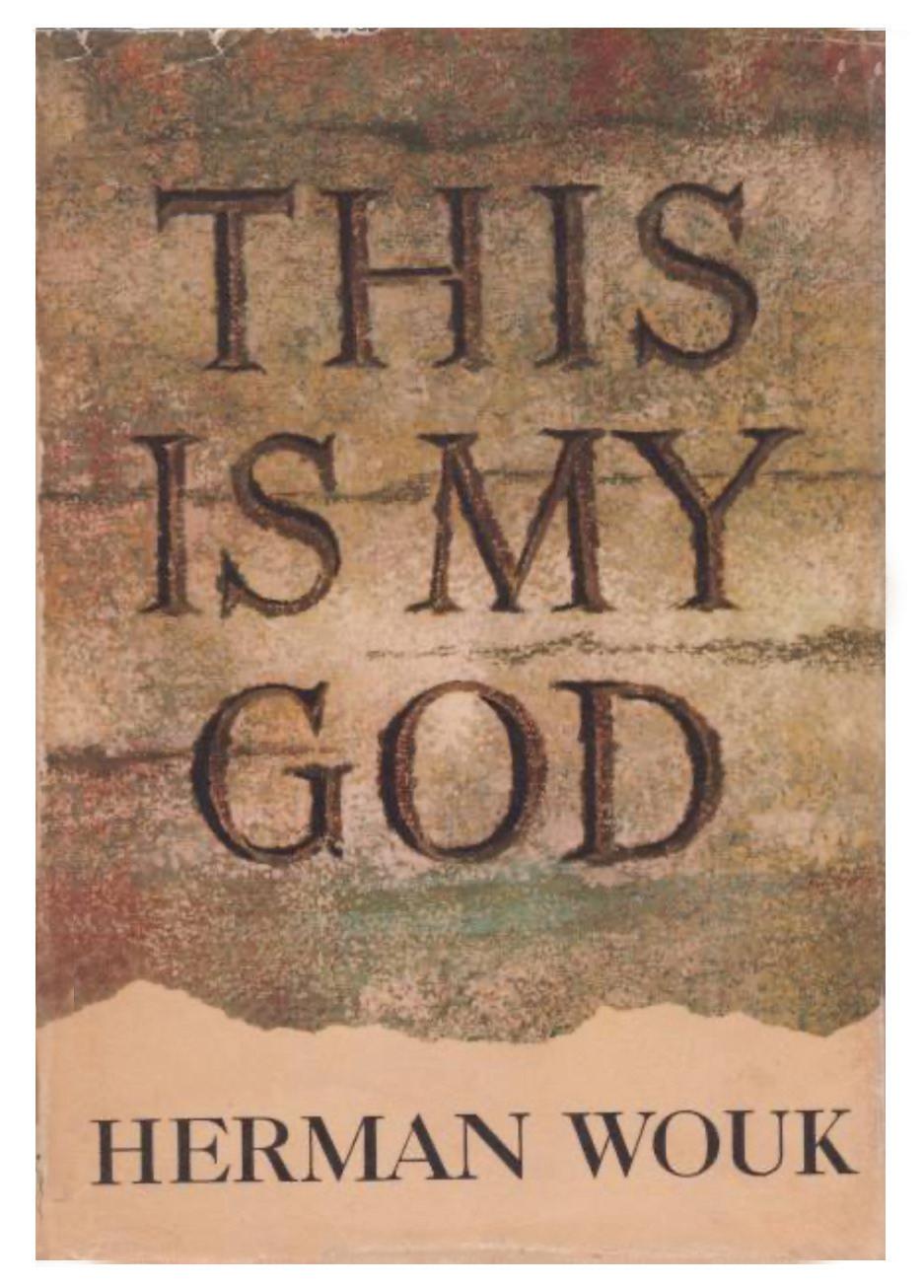
hitters of the time — Saul Bellow, Bernard Malamud and Roth, say — than in two very specific genres of middlebrow books.






The first she calls “Introduction to Judaism literature.” It includes Wouk’s This Is My God, Basic Judaism by Conservative rabbi Milton Steinberg and What the Jews Believe, by Steinberg’s cousin, Rabbi Philip Bernstein.

Many of these books — Gordan counts more than 40 written between 1945 and 1960 — were marketed to the general public. Such books addressed non-Jew’s ignorance of Judaism at a time “when Cold War American citizenship seemed to require denominational affiliation.” (America, remember, was facing down the godless communists.) The Bellow, marketed citizenship
Temple Emanuel, a vibrant 150-member congregation located in the oceanfront area of Virginia Beach, seeks an Office Manager to replace their long-serving incumbent who has been in the role for16 years. Position involves managing administrative, financial, and operational aspects of the Temple as well as supporting the Rabbi. Primarily an in-person role with a competitive salary.
DUTIES AND RESPONSIBILITIES
•Serve as primary Temple contact for congregants
•Maintain membership records and temple calendars
•Prepare and distribute newsletters and marketing materials
•Coordinate facility usage and security schedules
•Manage billing, collections, payroll and vendor payments
•Provide general administrative support
•Supervise custodial work
QUALIFICATIONS AND SKILLS
•Strong verbal and written communication skills
•Proficient: Microsoft Office and database management software
•Ability to work independently and with others
•Excellent time management and prioritization skills
•Strong attention to detail
•Excellent customer service skills
•Ability to maintain a high degree of confidentiality
EDUCATION AND EXPERIENCE
•Minimum of a high school diploma or equivalent
•At least two years of management experience (or equivalent) in an office setting, including basic bookkeeping. Contact Gail at office@tevb.org or 757-428-2591 for information or to apply.
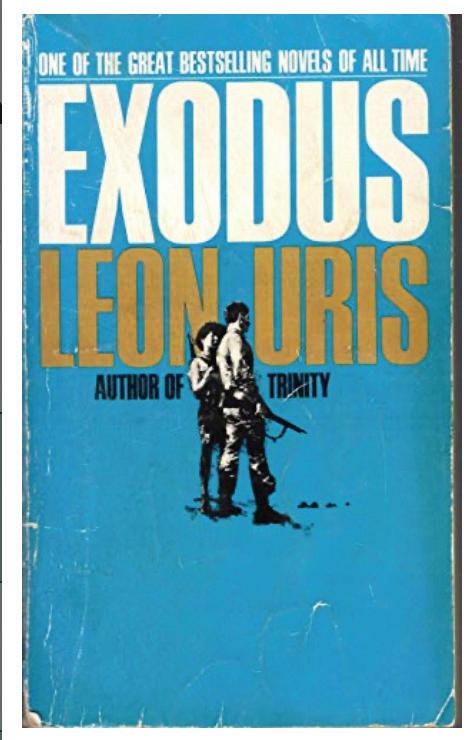


authors of such Intro to Judaism books were also motivated by the suspicion that “American Jews themselves, not just non-Jews, were often ignorant about Judaism.” These children, grandchildren, and even greatgrandchildren of immigrants “stood at a remove from the religion of their ancestors.”
Gordan’s second genre is “anti-antisemitism literature,” epitomized by Gentleman’s Agreement, Laura Z. Hobson’s 1947 novel about a journalist who goes undercover as a Jew to experience antisemitism for himself (the film adaptation, starring Gregory Peck, won that year’s Oscar for best picture). Such works asserted that eschewing antisemitism and accepting Jews as part of the (white) American religious mainstream were essential parts of a “pro-democracy and anti-fascist worldview.”
Gordan argues that both genres helped transform American Jews and Judaism, turning them into “subjects that Americans could understand and accept.” Jews themselves, meanwhile, learned that their Jewishness did not have to be experienced as a liability. This led, by the 1970s, in two paradoxical directions: Jews embraced their ethnic identity in private and popular culture, but also assimilated into the mainstream and lost their Jewish distinctiveness.
It should be obvious by now that, except for Hobson, the writers I’ve mentioned so far are men. All the recent scholarly works about this period are by women, and each addresses the gender gap. In the delightfully titled Carrying a Big Schtick: Jewish Acculturation and Masculinity in the Twentieth Century, Miriam Eve Mora writes how many of the male novelists, stung by antisemitic accusations that Jewish men were “feminized,” set out to “demonstrate the Jewish ability to perform masculinity on par with their national brethren.” She quotes historian Paul Breines, who describes the macho works of Uris, Roth, Mailer and Bellow as the “Rambowitz novels.” Mora, the director of academic programs at the Center
for Jewish History in New York City, analyses this attitude with some sympathy. The “view of Jewish men as weak or effeminate,” she writes, “has been a constant strain among popular sentiments about Jewish manhood in America, and there has always been a corresponding strain of Jewish men attempting to remedy this sentiment through proving or improving their manhood.”
Somewhat less sympathetic is Ronnie Grinberg, a historian at the University of Oklahoma. Her book, Write Like a Man: Jewish Masculinity and the New York Intellectuals, studies the aggro posturing at “little” magazines like Commentary and Partisan Review and among their male contributors, including Norman Mailer, Lionel Trilling, Nathan Glazer, Irving Kristol and Norman Podhoretz. Besides exerting an outsize influence on the era’s debates over domestic and international affairs, they wrote and argued as if they were pounding the typewriter with their fists.
These writers absorbed American norms about manhood on the streets, at the movies and in popular culture, which together shaped “a new intellectual culture that valued a combative stance shaped by a desire and need to perform a new kind of secular Jewish masculinity.” The paragon of the New York Intellectual, Irving Howe once wrote, valued “pride in argument, vanity of dialectic, a gleaming readiness for polemic” — which was probably a lot more fun for readers than for the targets of their aggression.
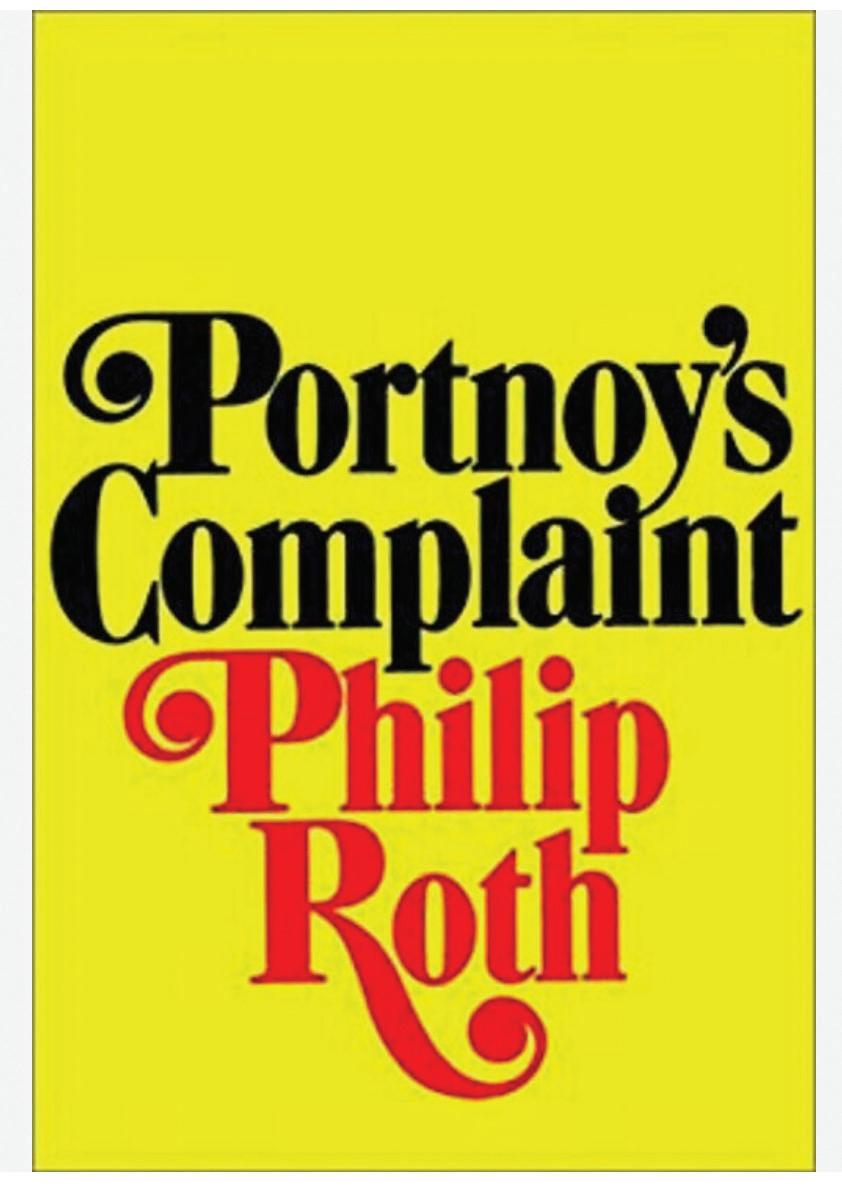

Cold War. Gordan explores how the Holocaust and the establishment of Israel also influenced the postwar literary era — the former by shaming or at least marginalizing antisemites, the latter by casting a glow of triumph and even cockiness over Jews living in the Diaspora.
What books would capture the Jewish vibes of the 21st century? In 2020 Yehuda Kurtzer and Claire E. Sufrin put together an anthology called The New Jewish Canon, attempting to catalogue the books and articles that represent the “Jewish intellectual and communal zeitgeist.”
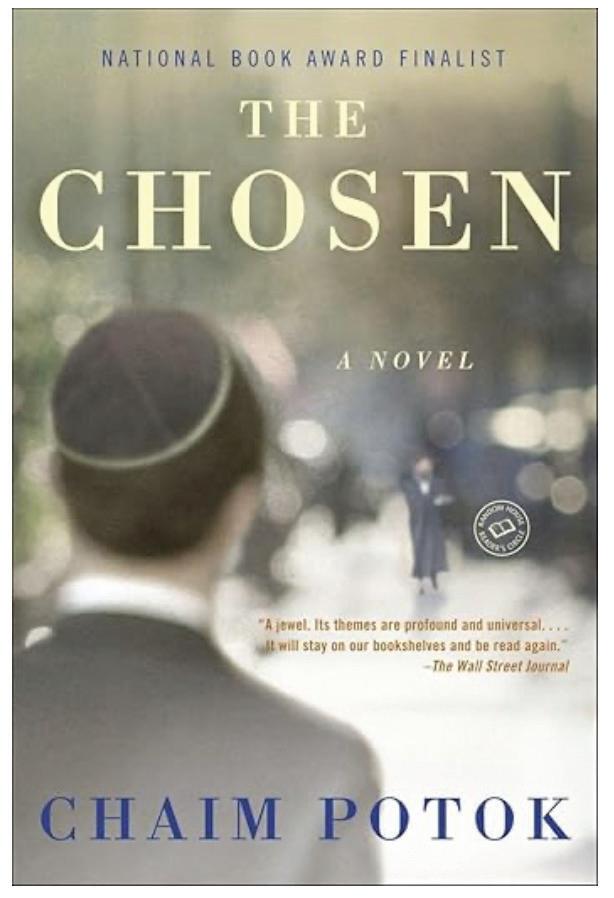

Among the 70 or so picks, only two could be called bestsellers: When Bad Things Happen to Good People by Harold Kushner and Joseph Telushkin’s Jewish Literacy.
called
It’s increasingly hard to talk about “Jewish community” when Jews are split along denominational, political, and ethnic lines, and when the Holocaust and Israel are fading as forces that bind Jews to one another. My parents didn’t agree with their fellow Jews on everything, but they saw themselves in common cause. Their books they bought and read reflected this.
Grinberg also writes about the women writers in this circle, often the wives of the gatekeepers, including Mary McCarthy, Elizabeth Hardwick and Diana Trilling. Not all were Jews, but they were willing to mix it up with the men in a style that came to be seen as distinctly Jewish.
Perhaps the current lack of a common Jewish bookshelf of popular, middlebrow books is a good thing, hinting at a richly diverse community that can’t be captured between the covers of a handful of bestsellers. Or maybe it points to an inability of a people to see themselves in each other, or agree on what they share.
Your turn:
What books reflect our current Jewish moment — and which might you guess are on the shelves of even a plurality of American Jews? We’d like to hear from you: Suggest one or more general interest, scholarly and even cookbooks that have broken through to a wide readership and would tell a future historian what was on the minds of American Jews in the 2020s. Send your suggestions to asc@ jta.org and put “Jewish Bookshelf” in the subject line.
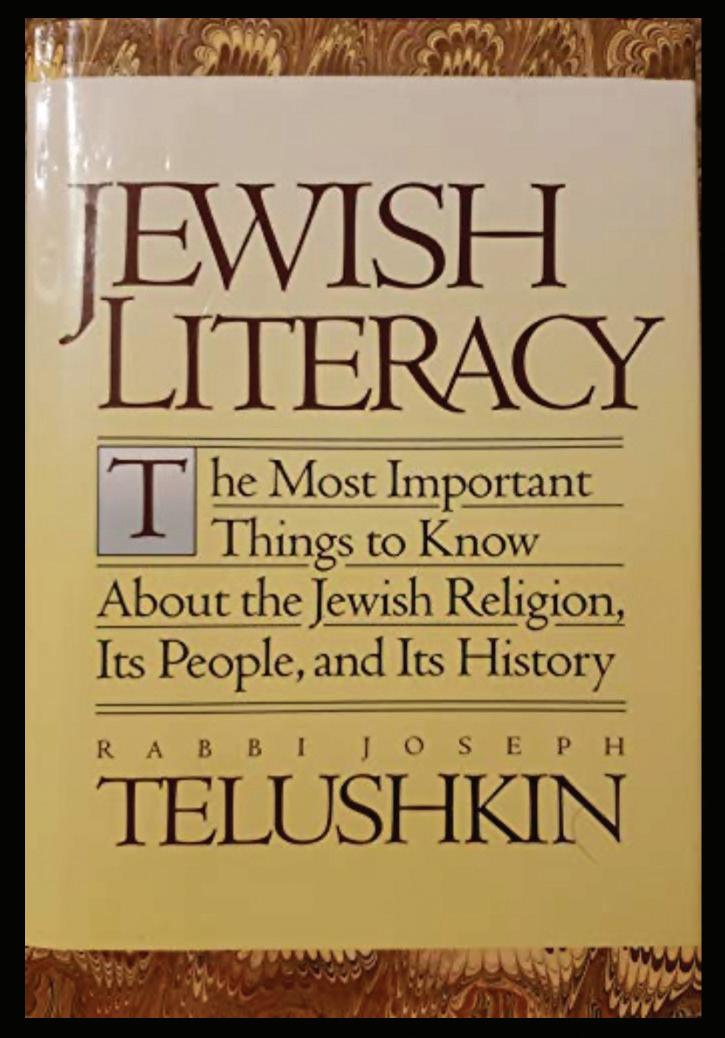


Such “secular Jewish masculinity” shaped the intellectual discourse and the marketplace where work by men was taken more seriously. My parents — my mother anyway — read Jewish books by women, although they tended to be bestselling authors whose work was rarely regarded as great literature: Belva Plain, Cynthia Freeman, Judith Krantz. I don’t remember them reading books by Anzia Yezierska, Grace Paley or Cynthia Ozick, important writers often excluded in the talk about a golden age for Jewish American literature.
Gordan, Mora, and Grinberg describe the forces that shaped Jewish identity, as well as reading tastes, in the 20th century: assimilation and acceptance, gender, the
The views and opinions expressed in this article are those of the author and do not necessarily reflect the views of JTA or its parent company, 70 Faces Media.
Stephen Lee Goldstein
Norfolk – Stephen Lee Goldstein, 83, passed away on Dec. 7, 2024 at home with his family by his side, after a long battle with chronic kidney disease.
Steve was born in Norfolk on September 1, 1941 to the late Sol and Esther Goldstein. He graduated from Maury High School in 1959. He attended Old Dominion University for a short amount of time. His love for the school continued over the years as he was a regular supporter at basketball and baseball games with family and friends.
Steve sold shoes and managed for Hofheimer’s Shoes for 20 years. He began his career selling shoes at Pembroke Mall in 1967. He would go on to manage stores at Princess Anne Plaza, Ward’s Corner, and the Florsheim Shop at Lynnhaven Mall. He then continued to sell shoes for another 30 years until he retired.
Steve was an avid lover of adult men's softball. He spent many hours and days as a player, then coach, and eventually a team manager. If he wasn’t at home, you could often find him on a softball field at a tournament.
He is survived by his wife, Ernie of 57
years, child Stephanie Mackey (Rob), and two grandchildren, Megan and RJ.
A graveside funeral service was held at Forest Lawn Cemetery.
Bethesda, Md. – Leslie Brown Zedd, born May 19, 1938, passed away peacefully on Friday, December 6, 2024, at her home.
She was the daughter of the late Mary Wiener Brown and Oscar Abraham Brown. She was predeceased by her loving husband, Morton Miles Zedd, and her dear twin sister, Lynn Brown Geesaman.
After her childhood in Cleveland, Leslie graduated from Wellesley College. Following graduation, she and her sister Lynn moved to San Francisco, where Leslie conducted laboratory research at the University of California, Berkeley. She met Mort, and they moved to Richmond, Va. Their children were the center of their lives, and Leslie ensured that her love of books, music and the arts played a large role in their lives. Her intellectual curiosity
led her to earn a Master of Humanities degree from the University of Richmond, and she taught composition at VCU.
She was loved by friends near and far. Her travels with Mort and her family were highlights.
Following Mort’s death in 2000, Leslie moved to Bethesda, Maryland to be close to her children. Meeting Dr. Kenneth Berger then opened a second act in Leslie’s life, with adventurous travel, symphony



concerts and plays, alongside visiting family and friends around the country.
She is survived by her children, Dana Z. Levitan (Dmitry), Ann Z. Geldzahler (Evan), John D. Zedd (Cathy Elkus), and grandchildren Hannah, Claire, David, Alex, Ella, Sarah and Jane. Also surviving are her many cousins, including dear Tom Wiener (Barbara Humphrys), as well as her sisterin-law, Kay Zedd Kesser, and many beloved nieces and nephews.






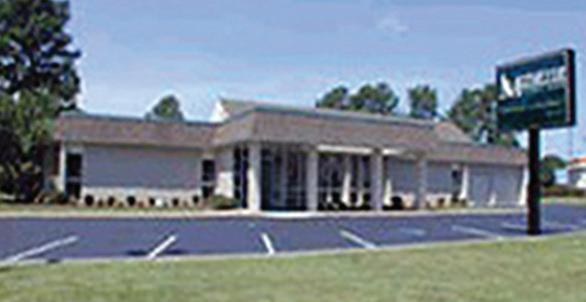



Shahar Dekel shares
